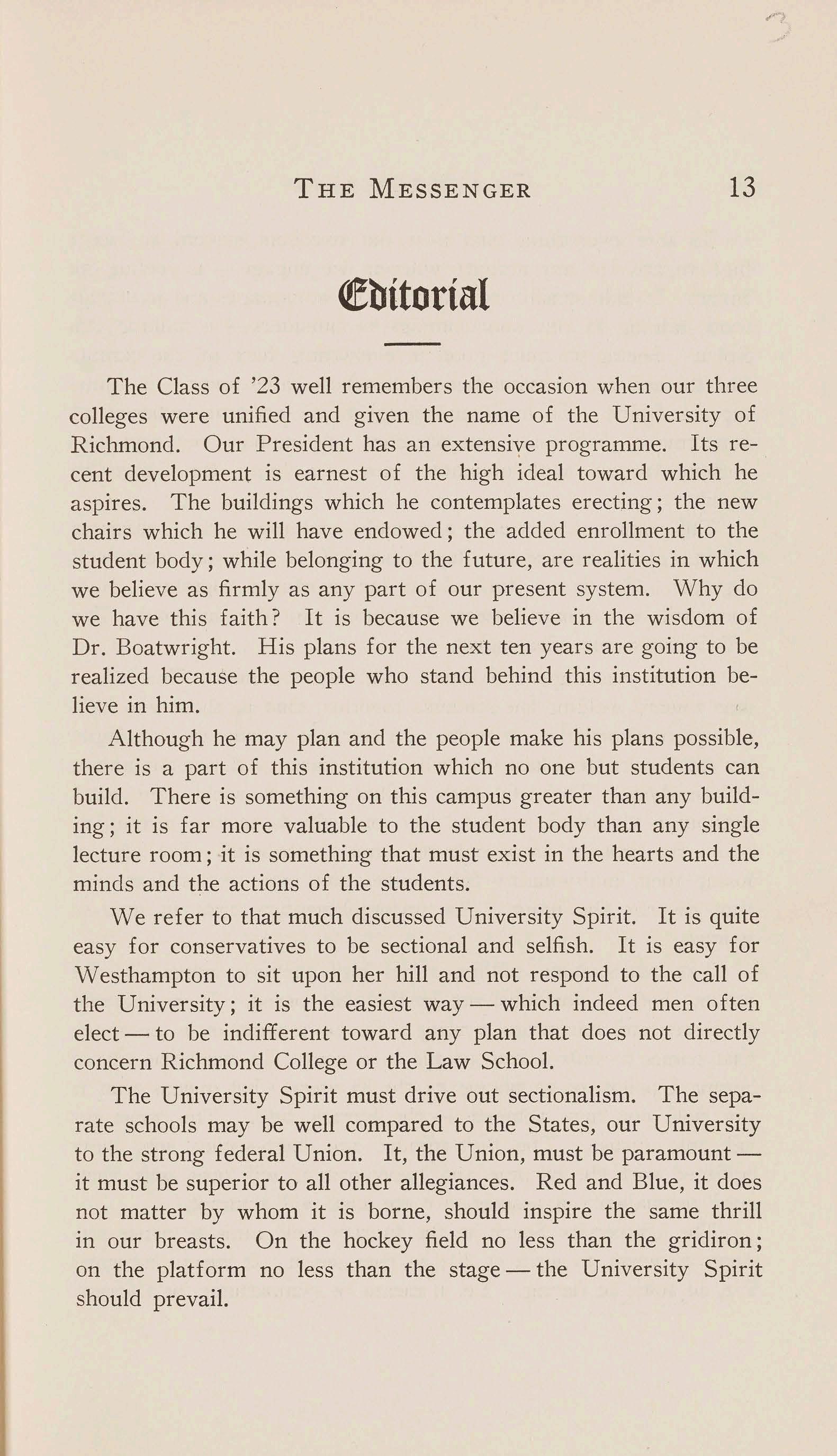

~bttorial
The Class of '23 well remembers the occasion when our three colleges were unified and given the name of the University of Richmond. Our President has an extensive programme. Its recent development is earnest of the high ideal toward which he aspires. The buildings which he contemplates erecting; the new chairs which he will have endowed; the added enrollment to the student body; while belonging to the future, are realities in which we believe as firmly as any part of our present system. Why do we have this faith? It is because we believe in the wisdom of Dr. Boatwright. His plans for the next ten years are going to be realized because the people who stand behind this institution believe in him.
Although he may plan and the people make his plans possible, there is a part of this institution which no one but students can build. There is something on this campus greater than any building; it is far more valuable to the student body than any single lecture room; it is something that must exist in the hearts and the minds and the actions of the students.
We refer to that much discussed University Spirit. It is quite easy for conservatives to be sectional and selfish. It is easy for Westhampton to sit upon her hill and not respond to the call of the University; it is the easiest way-which indeed men often elect - to be indifferent toward any plan that does not directly concern Richmond College or the Law School.
The University Spirit must drive out sectionalism. The separate schools may be well compared to the States, our University to the strong federal Union. It, the Union, must be paramountit must be superior to all other allegiances. Red and Blue, it does not matter by whom it is borne, should inspire the same thrill in our breasts. On the hockey field no less than the gridiron ; on the platform no less than the stage - the University Spirit should prevail.
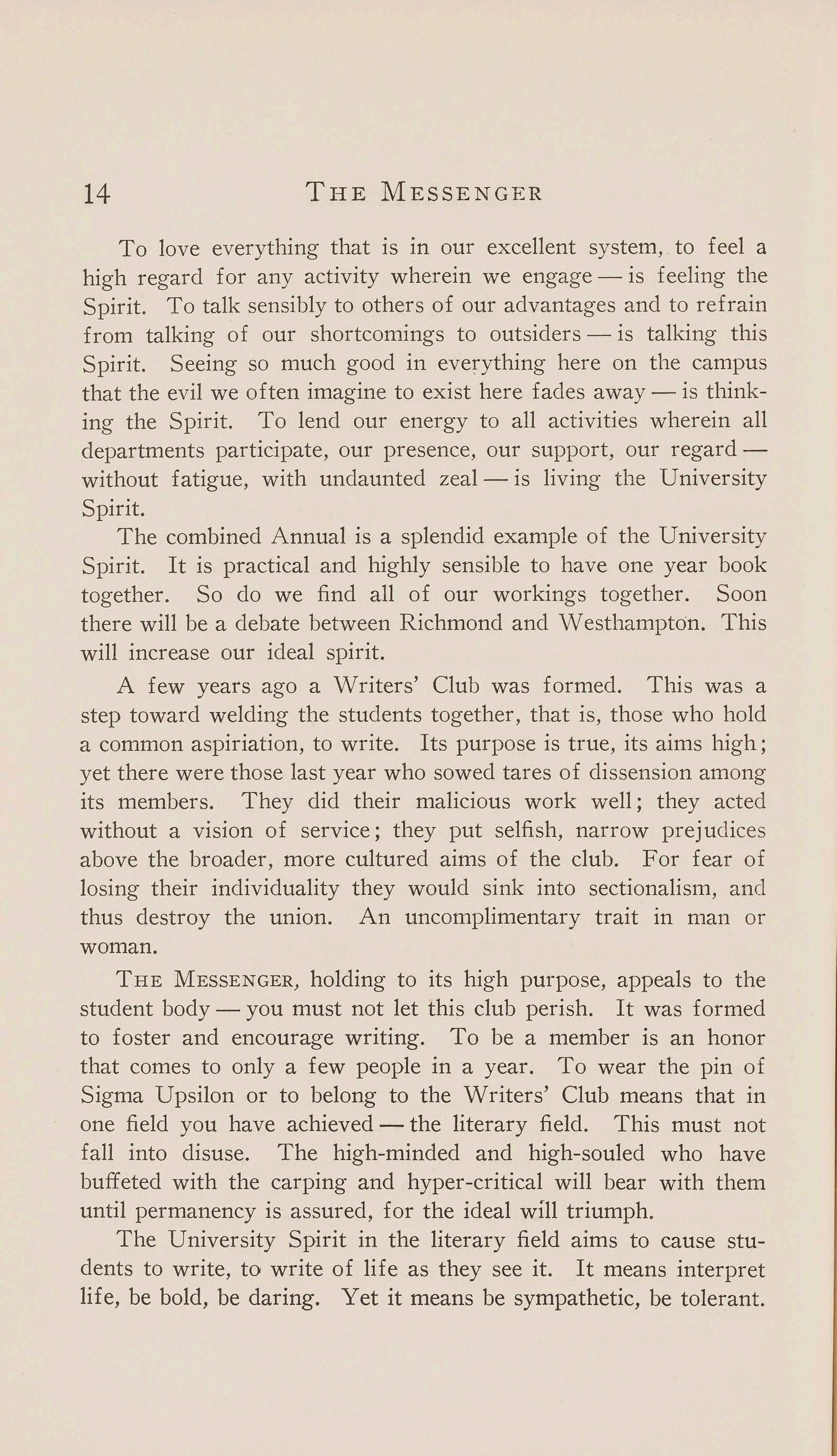
THE MESSENGER
To love everything that is in our excellent system , to feel a high regard for any activity wherein we engage -is feeling the Spirit. To talk sensibly to others of our advantages and to refrain from talking of our shortcomings to outsiders -is talking this Spirit. Seeing so much good in everything here on the campus that the evil we often imagine to exist here fades away-is thinking the Spirit. To lend our energy to all activities wherein all departments participate, our presence, our support, our regardwithout fatigue, with undaunted zeal -is living the University Spirit.
The combined Annual is a splendid example of the University Spirit. It is practical and highly sensible to have one year book together. So do we find all of our workings together. Soon there will be a debate between Richmond and Westhampton. This will increase our ideal spirit.
A few years ago a Writers' Club was formed. This was a step toward welding the students together, that is, those who hold a common aspiriation, to write. Its purpose is true, its aims high; yet there were those last year who sowed tares of dissension among its members. They did their malicious work well; they acted without a vision of service; they put selfish, narrow prejudices above the broader, more cultured aims of the club. For fear of losing their individuality they would sink into sectionalism, and thus destroy the union. An uncomplimentary trait in man or woman.
THE MESSENGER,holding to its high purpose, appeals to the student body -you must not let this club perish. It was formed to foster and encourage writing. To be a member is an honor that comes to only a few people in a year. To wear the pin of Sigma Upsilon or to belong to the Writers' Club means that in one field you have achieved - the literary field. This must not fall into disuse. The high-minded and high-souled who have buffeted with the carping and hyper-critical will bear with them until permanency is assured, for the ideal will triumph.
The University Spirit in the literary field aims to cause students to write, to write of life as they see it. It means interpret life, be bold, be daring. Yet it means be sympathetic, be tolerant.
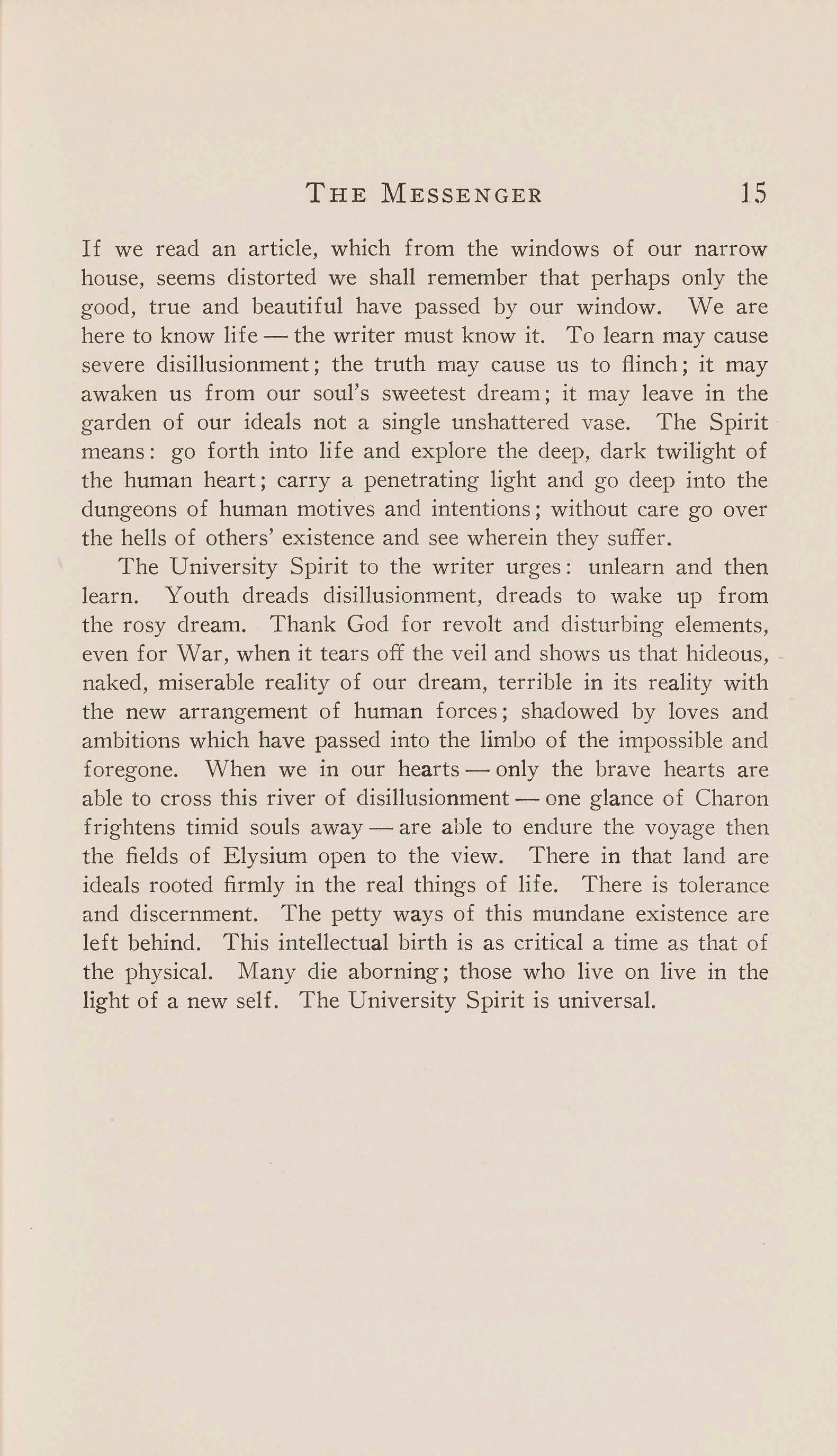
If we read an article, which from the windows of our narrow house, seems distorted we shall remember that perhaps only the good, true and beautiful have passed by our window. We are here to know life - the writer must know it. To learn may cause severe disillusionment; the truth may cause us to flinch; it may awaken us from our soul's sweetest dream; it may leave in the garden of our ideals not a single unshattered vase. The Spirit means: go forth into life and explore the deep, dark twilight of the human heart; carry a penetrating light and go deep into the dungeons of human motives and intentions; without care go over the hells of others' existence and see wherein they suffer.
The University Spirit to the writer urges: unlearn and then learn. Youth dreads disillusionment, dreads to wake up from the rosy dream. Thank God for revolt and disturbing elements, even for War, when it tears off the veil and shows us that hideous, naked, miserable reality of our dream, terrible in its reality with the new arrangement of human forces; shadowed by loves and ambitions which have passed into the limbo of the impossible and foregone. When we in our hearts - only the brave hearts are able to cross this river of disillusionment - one glance of Charon frightens timid souls away-are able to endure the voyage then the fields of Elysium open to the view. There in that land are ideals rooted firmly in the real things of life. There is tolerance and discernment. The petty ways of this mundane existence are left behind. This intellectual birth is as critical a time as that of the physical. Many die aborning; those who live on live in the light of a new self. The University Spirit is universal.
THE MESSENGER
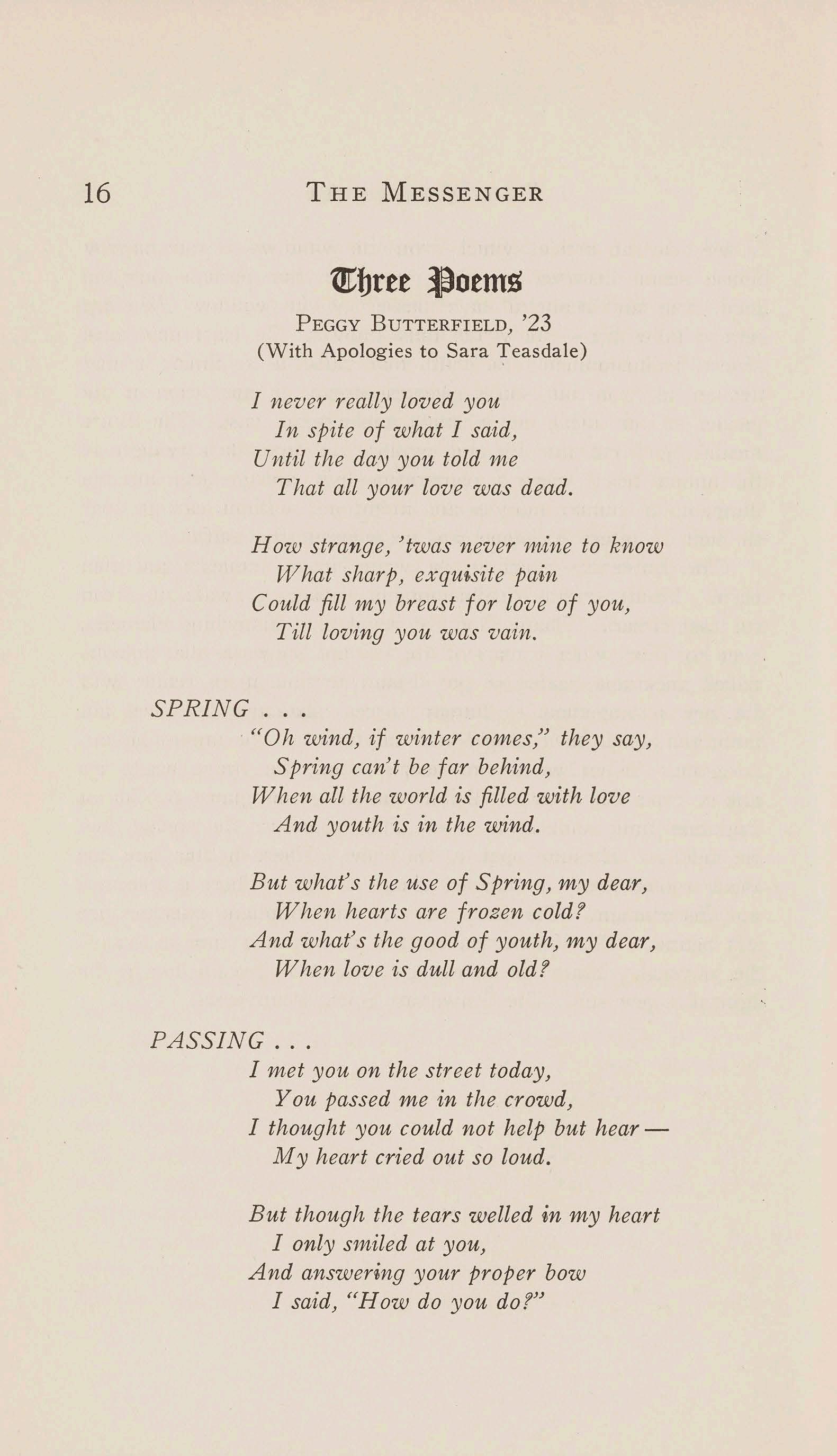
PEGGY BUTTERFIELD, '23 (With Apologies to Sara Teasdale)
I never really loved you
In spite of what I said, Until the day you told me That all your love was dead.
How strange, 'twas never mine to know What sharp, exquisite pain Could fill my breast for love of you, Till loving you was vain.
SPRING . ..
· "Oh wind, if winter comes," they say, Spring can't be far behind, When all the world is filled with love And youth is in the wind.
But what's the use of Spring, my dear, When hearts are frozen cold? And what's the good of youth, my dear, When love is dull and old?
PASSING ...
I met you on the street today, You passed me in the crowd, I thought you could not help but hearMy heart cried out so loud.
But though the tears welled in my heart I only smiled at you, And answering your proper bow I said, "How do you do?"
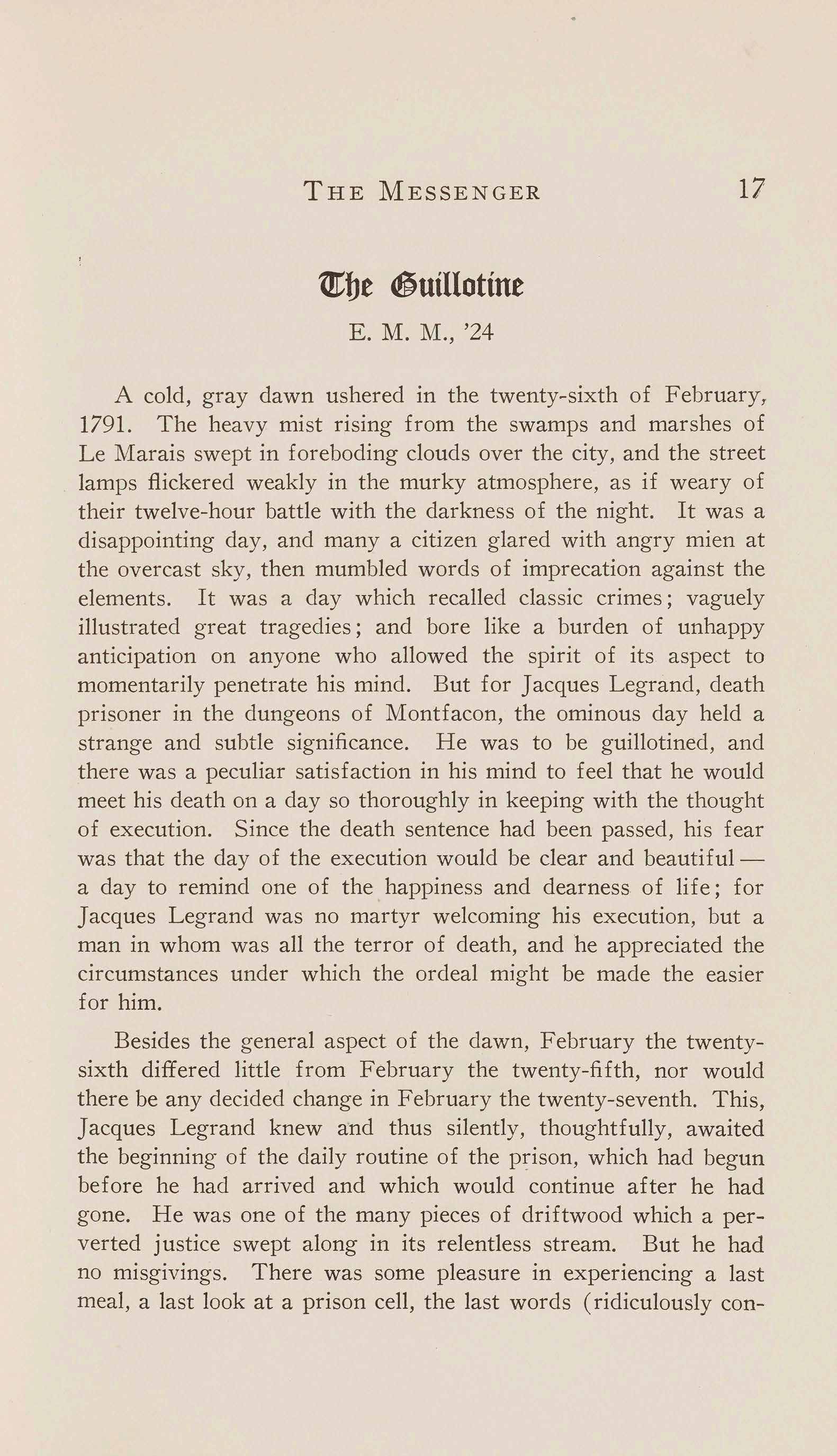
E. M. M., '24
A cold, gray dawn ushered in the twenty-sixth of February, 1791. The heavy mist rising from the swamps and marshes of Le Marais swept in foreboding clouds over the city, and the street lamps flickered weakly in the murky atmosphere, as if weary of their twelve-hour battle with the darkness of the night. It was a disappointing day, and many a citizen glared with angry mien at the overcast sky, then mumbled words of imprecation against the elements. It was a day which recalled classic crimes; vaguely illustrated great tragedies; and bore like a burden of unhappy anticipation on anyone who allowed the spirit of its aspect to momentarily penetrate his mind. But for Jacques Legrand, death prisoner in the dungeons of Montfacon, the ominous day held a strange and subtle significance. He was to be guillotined, and there was a peculiar satisfaction in his mind to feel that he would meet his death on a day so thoroughly in keeping with the thought of execution. Since the death sentence had been passed, his fear was that the day of the execution would be clear and beautifula day to remind one of the happiness and dearness of life; for Jacques Legrand was no martyr welcoming his execution, but a man in whom was all the terror of death, and he appreciated the circumstances under which the ordeal might be made the easier for him.
Besides the general aspect of the dawn, February the twentysixth differed little from February the twenty-fifth, nor would there be any decided change in February the twenty-seventh. This, Jacques Legrand knew and thus silently, thoughtfully, awaited the beginning of the daily routine of the prison, which had begun before he had arrived and which would continue after he had gone. He was one of the many pieces of driftwood which a perverted justice swept along in its relentless stream. But he had no misg1vmgs. There was some pleasure in experiencing a last meal, a last look at a prison cell, the last words ( ridiculously con-
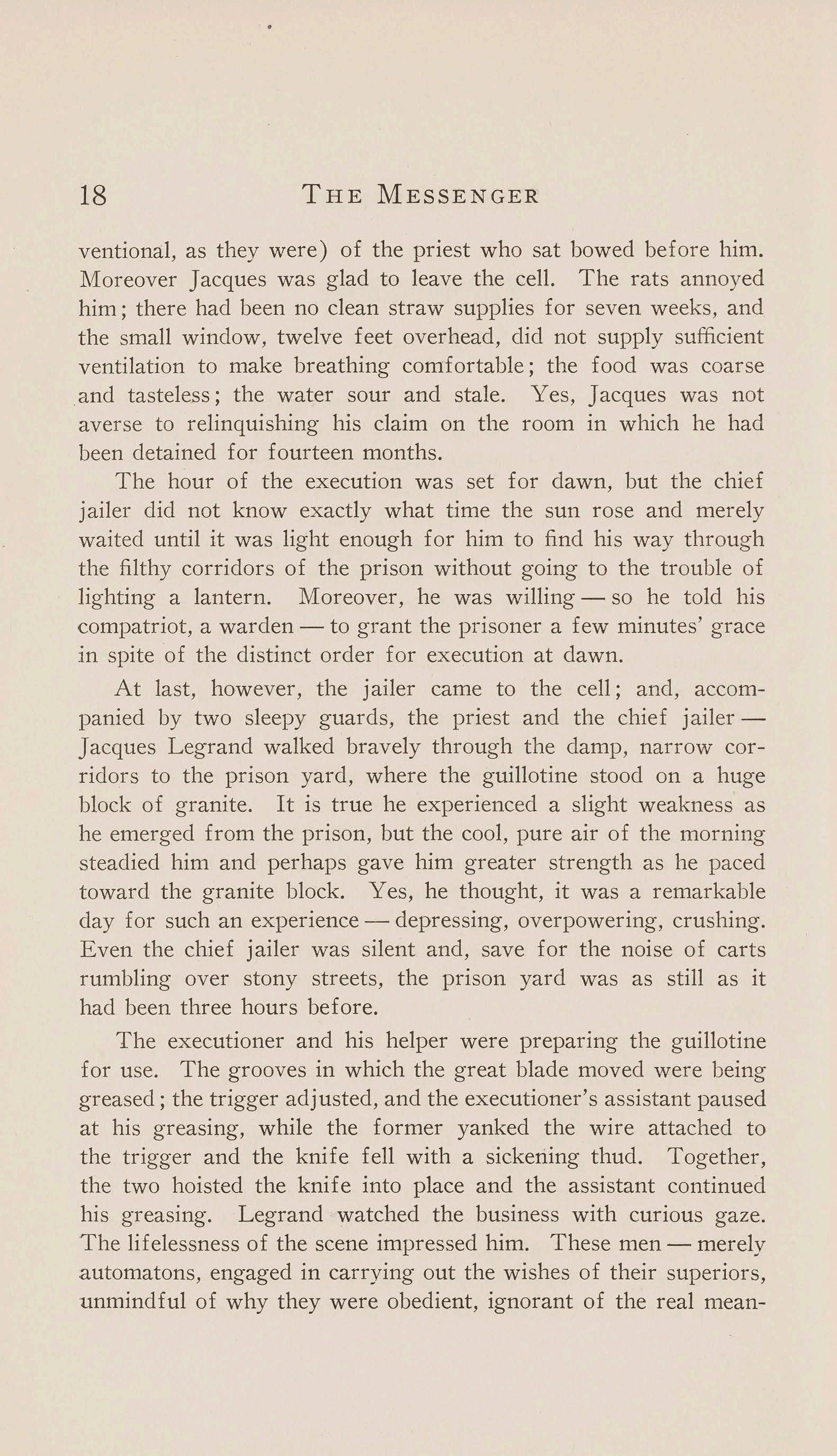
THE MESSENGER
ventional, as they were) of the priest who sat bowed before him. Moreover Jacques was glad to leave the cell. The rats annoyed him; there had been no clean straw supplies for seven weeks, and the small window, twelve feet overhead, did not supply sufficient ventilation to make breathing comfortable; the food was coarse and tasteless; the water sour and stale. Yes, Jacques was not averse to relinquishing his claim on the room in which he had been detained for fourteen months.
The hour of the execution was set for dawn, but the chief jailer did not know exactly what time the sun rose and merely waited until it was light enough for him to find his way through the filthy corridors of the prison without going to the trouble of lighting a lantern. Moreover, he was willing -so he told his compatriot, a warden -to grant the prisoner a few minutes' grace in spite of the distinct order for execution at dawn.
At last, however, the jailer came to the cell; and, accompanied by two sleepy guards, the priest and the chief jailerJacques Legrand walked bravely through the damp, narrow corridors to the prison yard, where the guillotine stood on a huge block of granite. It is true he experienced a slight weakness as he emerged from the prison, but the cool, pure air of the morning steadied him and perhaps gave him greater strength as he paced toward the granite block. Yes, he thought, it was a remarkable day for such an experience -depressing, overpowering, crushing. Even the chief jailer was silent and, save for the noise of carts rumbling over stony streets, the prison yard was as still as it had been three hours before.
The executioner and his helper were preparing the guillotine for use. The grooves in which the great blade moved were being greased; the trigger adjusted, and the executioner's assistant paused at his greasing, while the former yanked the wire attached to the trigger and the knife fell with a sickening thud. Together, the two hoisted the knife into place and the assistant continued his greasing. Legrand watched the business with curious gaze. The lifelessness of the scene impressed him. These men -merely automatons, engaged in carrying out the wishes of their superiors, unmindful of why they were obedient, ignorant of the real mean-
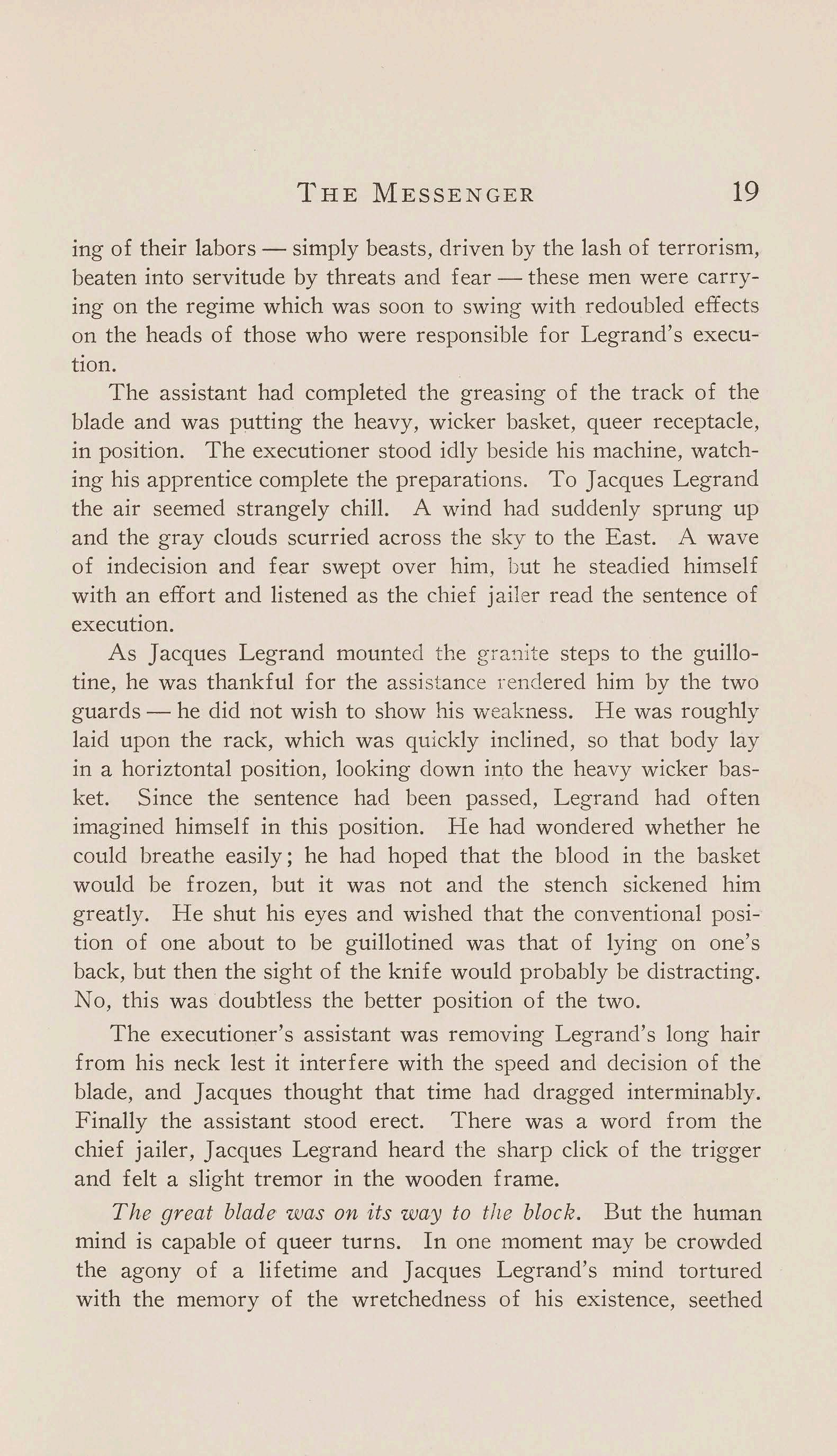
ing of their labors -simply beasts, driven by the lash of terrorism, beaten into servitude by threats and fear -these men were carrying on the regime which was soon to swing with redoubled effects on the heads of those who were responsible for Legrand's execution.
The assistant had completed the greasing of the track of the blade and was putting the heavy, wicker basket , queer receptacle, in position. The executioner stood idly beside his machine, watching his apprentice complete the preparations. To Jacques Legrand the air seemed strangely chill. A wind ha d suddenly sprung up and the gray clouds scurried across the sky to the East. A wave of indecision and fear swept over him, b ut he steadied himself with an effort and listened as the chief jail er read the sentence of execution.
As Jacques Legrand mounted t he g ra:1ite steps to the guillotine, he was thankful for the assi st an ce r endered him by the two guards -he did not wish to show his we a kness. He was roughly laid upon the rack, which was qu ickly inclined, so that body lay in a horiztontal position, looking down into the heavy wicker basket. Since the sentence had been passed, Legrand had of ten imagined himself in this position. He had wondered whether he could breathe easily; he had hoped that the blood in the basket would be frozen, but it was not and the stench sickened him greatly. He shut his eyes and wished that the conventional position of one about to be guillotined was that of lying on one's back, but then the sight of the knife would probably be distracting. No, this was doubtless the better position of the two.
The executioner's assistant was removing Legrand's long hair from his neck lest it interfere with the speed and decision of the blade, and Jacques thought that time had dragged interminably. Finally the assistant stood erect. There was a word from the chief jailer, Jacques Legrand heard the sharp click of the trigger and felt a slight tremor in the wooden frame.
The great blade was on its way to the block. But the human mind is capable of queer turns. In one moment may be crowded the agony of a lifetime and Jacques Legrand's mind tortured with the memory of the wretchedness of his existence, seethed
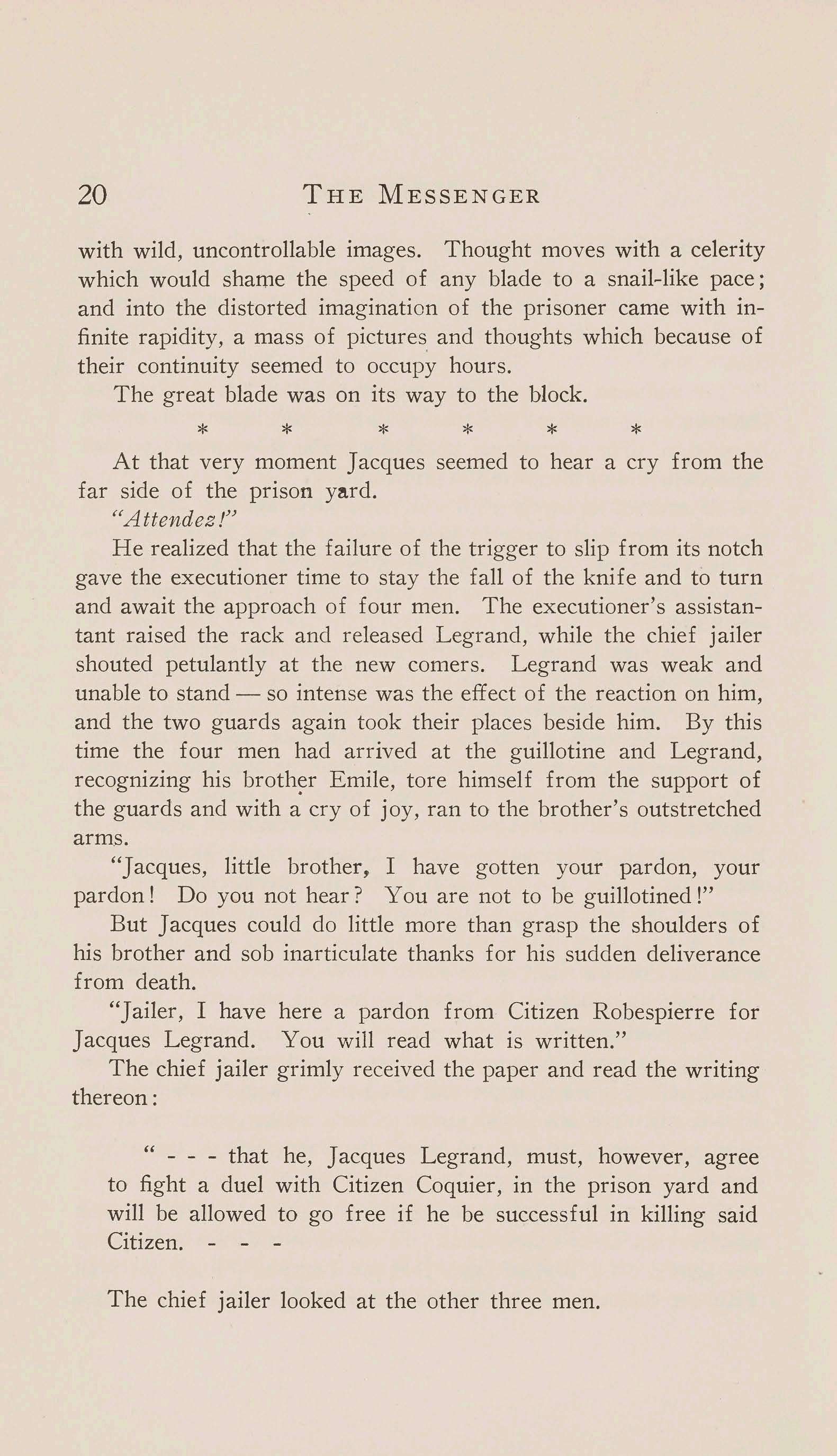
THE MESSENGER
with wild, uncontrollable images. Thought moves with a celerity which would shame the speed of any blade to a snail-like pace; and into the distorted imagination of the prisoner came with infinite rapidity, a mass of pictures and thoughts which because of their continuity seemed to occupy hours.
The great blade was on its way to the block.
At that very moment Jacques seemed to hear a cry from the far side of the prison yard.
"A ttendez !"
He realized that the failure of the trigger to slip from its notch gave the executioner time to stay the fall of the knife and to turn and await the approach of four men. The executioner's assistantant raised the rack and released Legrand, while the chief jailer shouted petulantly at the new comers. Legrand was weak and unable to stand -so intense was the effect of the reaction on him, and the two guards again took their places beside him. By this time the four men had arrived at the guillotine and Legrand, recognizing his broth~r Emile, tore himself from the support of the guards and with a cry of joy, ran to the brother's outstretched arms.
"Jacques, little brother, I have gotten your pardon, your pardon ! Do you not hear? You are not to be guillotined !"
But Jacques could do little more than grasp the shoulders of his brother and sob inarticulate thanks for his sudden deliverance from death.
"Jailer, I have here a pardon from Citizen Robespierre for Jacques Legrand. You will read what is written."
The chief jailer grimly received the paper and read the writing thereon:
" - - - that he, Jacques Legrand, must, however, agree to fight a duel with Citizen Coquier, in the prison yard and will be allowed to go free if he be successful in killing said Citizen. -
The chief jailer looked at the other three men.
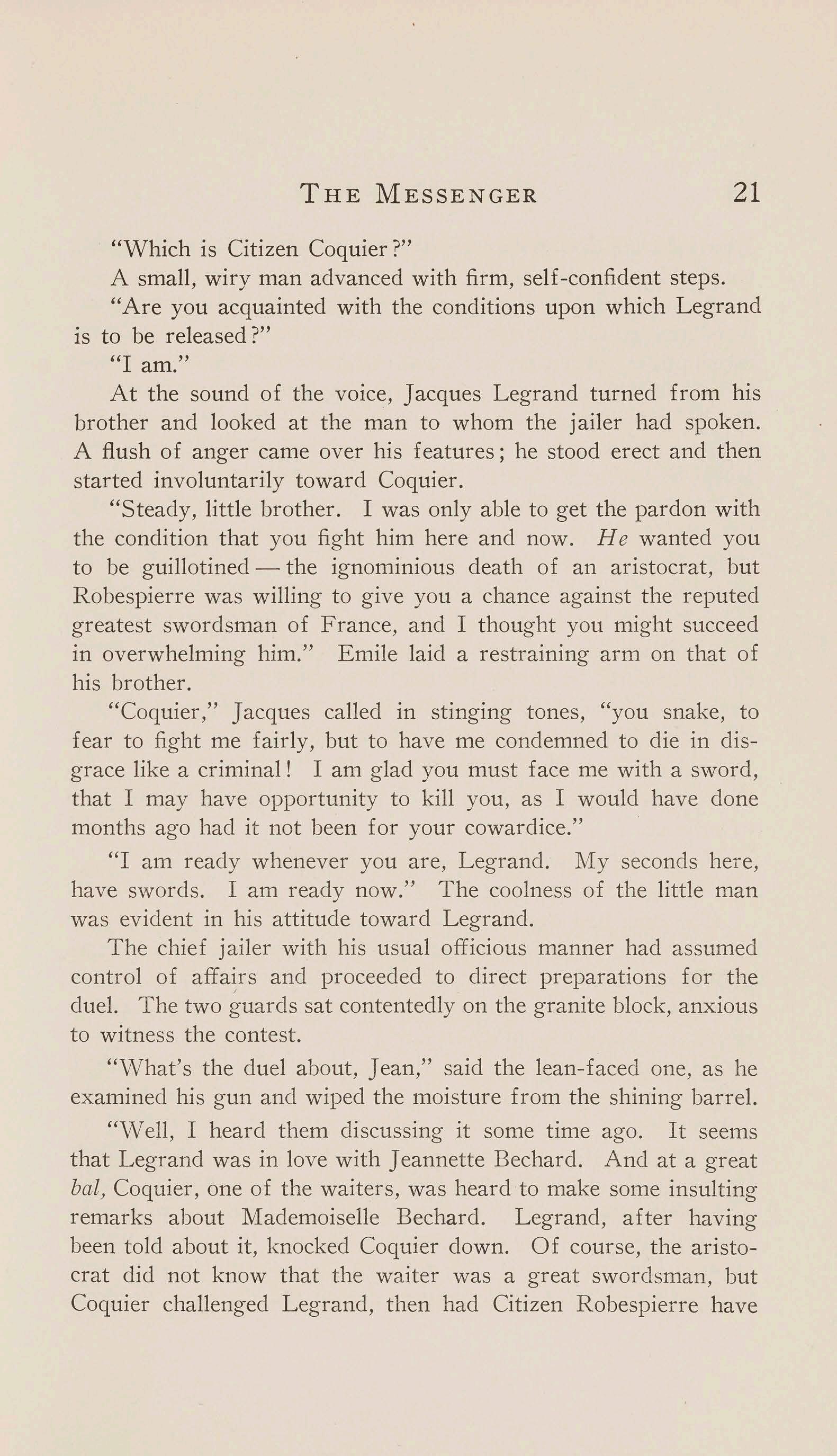
"Which is Citizen Coquier ?"
A small, wiry man advanced with firm, self-confident steps.
"Are you acquainted with the conditions upon which Legrand 1s to be released ?"
"I am."
At the sound of the voice, Jacques Legrand turned from his brother and looked at the man to whom the jailer had spoken . A flush of anger came over his features; he stood erect and then started involuntarily toward Coquier.
"Steady, little brother. I was only able to get the pardon with the condition that you fight him here and now. He wanted you to be guillotined -the ignominious death of an aristocrat, but Robespierre was willing to give you a chance against the reputed greatest swordsman of France, and I thought you might succeed in overwhelming him." Emile laid a restraining arm on that of his brother.
"Coquier ," Jacques called in stinging tones, "you snake, to fear to fight me fairly, but to have me condemned to die in disgrace like a criminal ! I am glad you must face me with a sword, that I may have opportunity to kill you, as I would have done months ago had it not been for your cowardice."
"I am ready whenever you are, Legrand. My seconds he r e, have swords. I am ready now." The coolness of the little man was evident in his attitude toward Legrand.
The chief jailer with his usual officious manner had assumed control of affairs and proceeded to direct preparations for the duel. The two guards sat contentedly on the granite block, anxious to witness the contest.
"What's the duel about, Jean," said the lean-faced one, as he examined his gun and wiped the moisture from the shining barrel.
"Well, I heard them discussing it some time ago. It seems that Legrand was in love with Jeannette Bechard. And at a great bal, Coquier, one of the waiters, was heard to make some insulting remarks about Mademoiselle Bechard. Legrand, after having been told about it, knocked Coquier clown. Of course, the aristocrat did not know that the waiter was a great swordsman, but Coquier challenged Legrand, then had Citizen Robespierre have
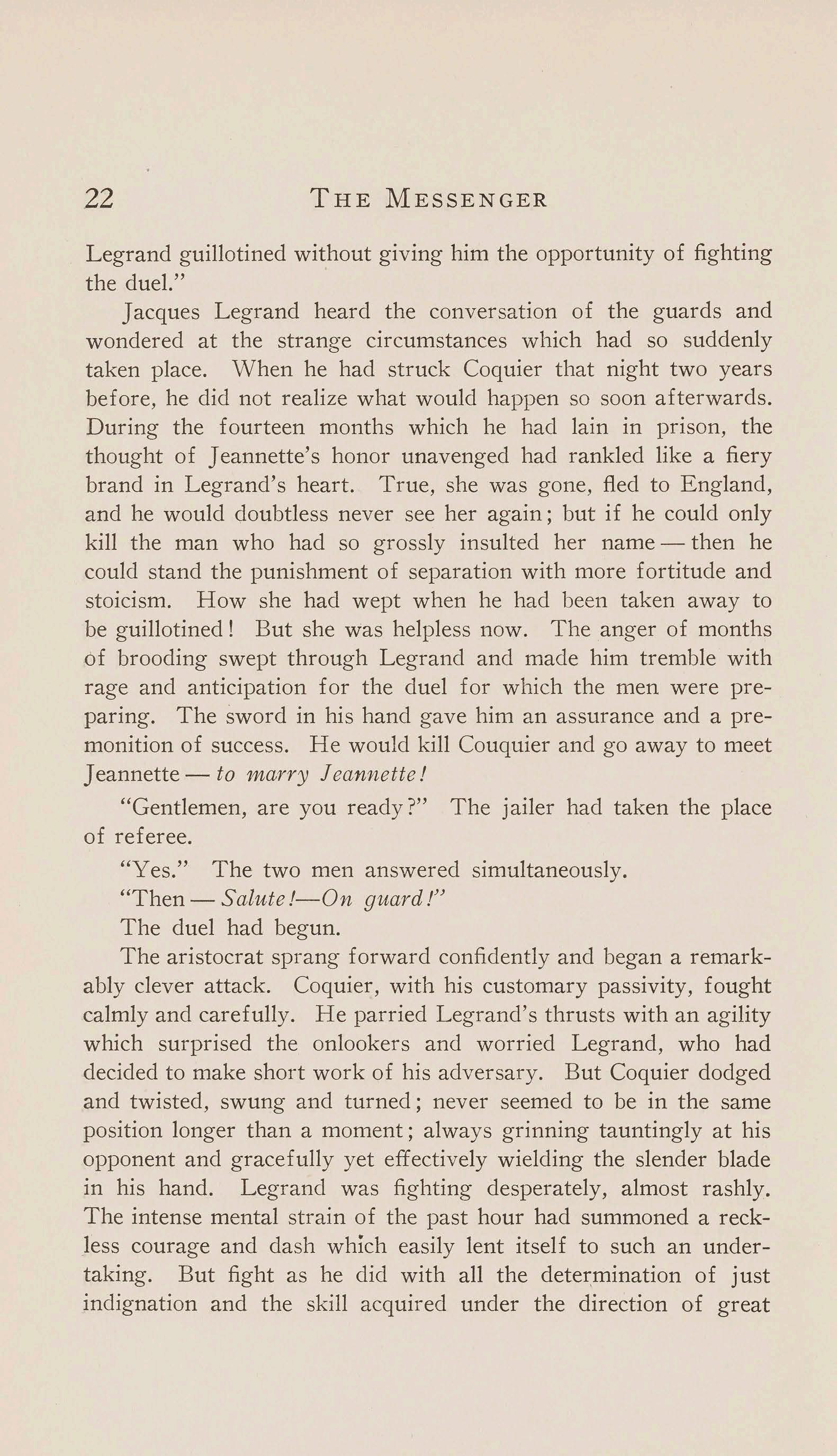
THE MESSENGER
Legrand guillotined without giving him the opportunity of fighting the duel."
Jacques Legrand heard the conversation of the guards and wondered at the strange circumstances which had so suddenly taken place. When he had struck Coquier that night two years before, he did not realize what would happen so soon afterwards. During the fourteen months which he had lain in prison, the thought of Jeannette's honor unavenged had rankled like a fiery brand in Legrand's heart. True, she was gone, fled to England, and he would doubtless never see her again; but if he could only kill the man who had so grossly insulted her name -then he could stand the punishment of separation with more fortitude and sto1c1sm. How she had wept when he had been taken away to be guillotined! But she was helpless now The anger of months of brooding swept through Legrand and made him tremble with rage and anticipation for the duel for which the men were preparing. The sword in his hand gave him an assurance and a premonition of success. He would kill Couquier and go away to meet Jeannette - to marry Jeannette I
"Gentlemen, are you ready?" The jailer had taken the place of referee.
"Yes." The two men answered simultaneously.
"Then - Salute !-On guard /1'
The duel had begun.
The aristocrat sprang forward confidently and began a remarkably clever attack. Coquier, with his customary passivity, fought calmly and carefully. He parried Legrand's thrusts with an agility which surprised the onlookers and worried Legrand, who had decided to make short work of his adversary. But Coquier dodged and twisted, swung and turned; never seemed to be in the same position longer than a moment; always grinning tauntingly at his opponent and gracefully yet effectively wielding the slender blade in his hand. Legrand was fighting desperately, almost rashly. The intense mental strain of the past hour had summoned a reckless courage and dash which easily lent itself to such an undertaking. But fight as he did with all the deter:mination of just indignation and the skill acquired under the direction of great

fencing masters, he could not break through the defense of the diminutive Coquier, who calmly stood his ground.
Time passed and Legrand was becoming winded. With a superhuman effort he rushed forward furiously, determined to overcome his opponent in a maze of whirlwind thrusts and parries. But the little Frenchman was not to be thus taken. With lightning rapidity he defended himself and, realizing the object and condition of Legrand, began an offensive which forced the latter slowly backward until he stood almost against the prison wall. Then as a last resort, Legrand made use of the trick which was said to have saved his master many times and which was now his only hope. With a feint to the right followed up by four short steps to the left oblique, a sudden turn and an inward thrust, strengthened by the weight of his whole body, Legrand surprised the clever Coquier and, to the amazement of the onlookers, disarmed him. The slender rapier rang upon the stones of the prison yard some twenty yards from the duelists. Legrand paused, and from the door of the prison he saw a woman advancing. It was Jeannette Bechard! With a cry of joy, he ran to meet her, taking her into his embrace unmindful of the situation from which he had just escaped.
"Jeannette, Jeannette, you here! Oh, my love, why did you come? Do you not realize what danger you are in? I thought you were in England!"
"My Jacques, I have come for you. I knew you would be free. I have come for you, my Jacques!"
The woman bent her head upon his shoulder and with sword in hand, with the February wind blowing his long, dishevelled hair in tangles about his face, Jacques Legrand stood triumphantly over the woman whom he loved and for whose sake he had dared to defy the leaders of a terrorism which astounded the world. Silently Jeannette clung to him, feeling none of the rage and wild passion of the duel, but swept into a sweet rapture of joy and bliss by his presence, by the embrace of those weary arms and by hope for his freedom.
In the meantime, Coquier had recovered his sword, and the jailer, after conferring with Emile and the second, was advancing toward Legrand.
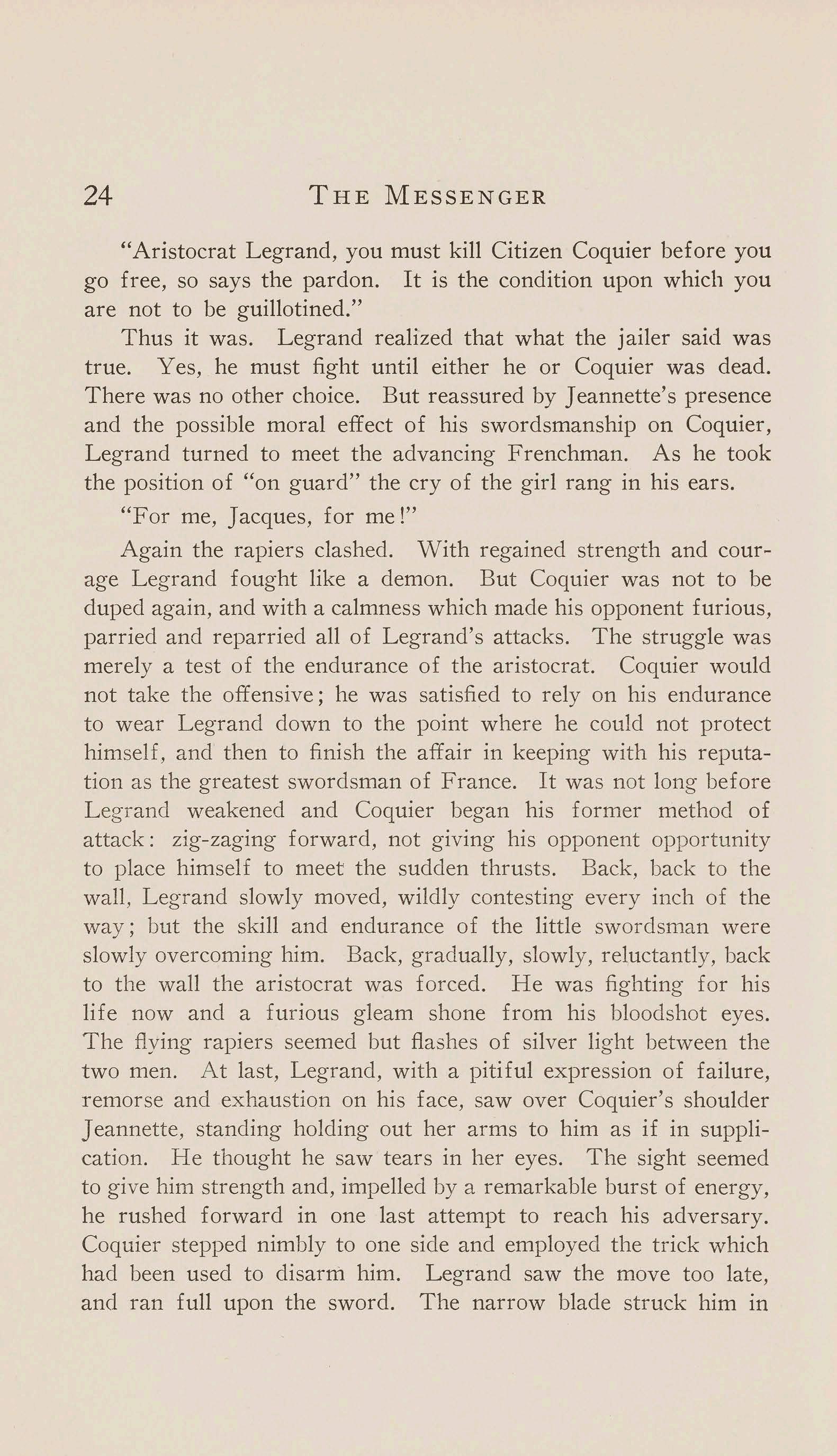
THE MESSENGER
"Aristocrat Legrand, you must kill Citizen Coquier before you go free, so says the pardon. It is the condition upon which you are not to be guillotined."
Thus it was. Legrand realized that what the jailer said was true. Yes, he must fight until either he or Coquier was dead. There was no other choice. But reassured by Jeannette's presence and the possible moral effect of his swordsmanship on Coquier, Legrand turned to meet the advancing Frenchman. As he took the position of "on guard" the cry of the girl rang in his ears.
"For me, Jacques, for me!"
Again the rapiers clashed. With regained strength and courage Legrand fought like a demon. But Coquier was not to be duped again, and with a calmness which made his opponent furious, parried and reparriecl all of Legrancl's attacks. The struggle was merely a test of the endurance of the aristocrat. Coquier would not take the offensive; he was satisfied to rely on his endurance to wear Legrand clown to the point where he could not protect himself, and then to finish the affair in keeping with his reputation as the greatest swordsman of France. It was not long before Legrand weakened and Coquier began his former method of attack: zig-zaging forward, not giving his opponent opportunity to place himself to meet the sudden thrusts. Back, back to the wall, Legrand slowly moved, wildly contesting every inch of the way; but the skill and endurance of the little swordsman were slowly overcoming him. Back, gradually, slowly, reluctantly, back to the wall the aristocrat was forced. He was fighting for his life now and a furious gleam shone from his bloodshot eyes. The flying rapiers seemed but flashes of silver light between the two men. At last, Legrand, with a pitiful expression of failure, remorse and exhaustion on his face, saw over Coquier's shoulder Jeannette, standing holding out her arms to him as if in supplication. He thought he saw tears in her eyes. The sight seemed to give him strength and, impelled by a remarkable burst of energy, he rushed forward in one last attempt to reach his adversary. Coquier stepped nimbly to one side and employed the trick which had been used to disarm him. Legrand saw the move too late, and ran full upon the sword. The narrow blade struck him in
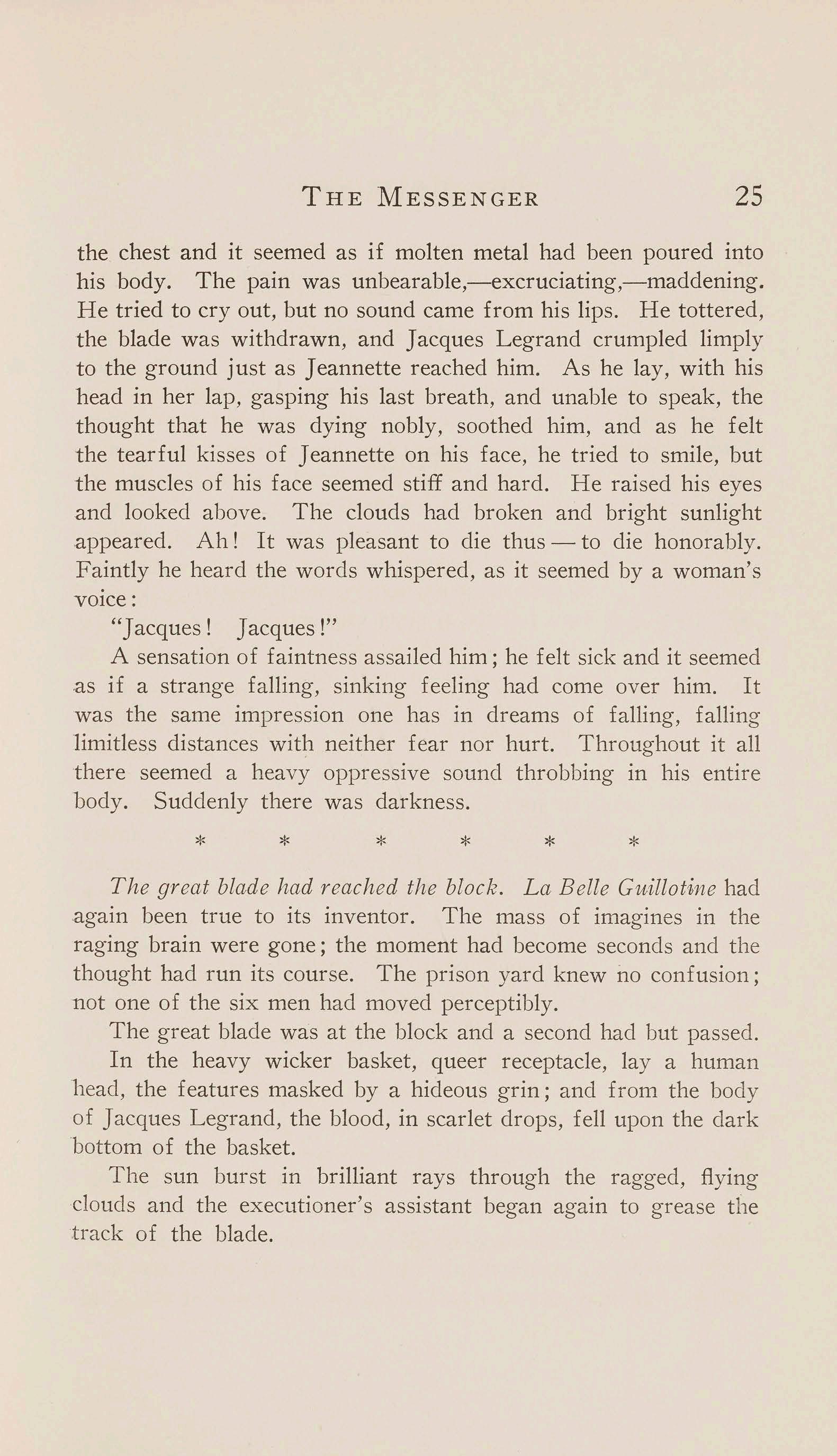
the chest and it seemed as if molten metal had been poured into his body. The pain was unbearable,-excruciating,-maddening. He tried to cry out, but no sound came from his lips. He tottered, the blade was withdrawn, and Jacques Legrand crumpled limply to the ground just as Jeannette reached him. As he lay, with his head in her lap, gasping his last breath, and unable to speak, the thought that he was dying nobly, soothed him, and as he felt the tearful kisses of Jeannette on his face, he tried to smile, but the muscles of his face seemed stiff and hard. He raised his eyes and looked above. The clouds had broken and bright sunlight appeared. Ah! It was pleasant to die thus -to die honorably. Faintly he heard the words whispered, as it seemed by a woman's voice:
"Jacques! Jacques!"
A sensation of faintness assailed him; he felt sick and it seemed as if a strange falling, sinking feeling had come over him. It was the same impression one has in dreams of falling, falling limitless distances with neither fear nor hurt. Throughout it all there seemed a heavy oppressive sound throbbing in his entire body. Suddenly there was darkness.
The great blade had reached the block. La Belle Guillotine had again been true to its inventor. The mass of imagines in the raging brain were gone; the moment had become seconds and the thought had run its course. The prison yard knew no confusion; not one of the six men had moved perceptibly.
The great blade was at the block and a second had but passed. In the heavy wicker basket, queer receptacle, lay a human 11ead, the features masked by a hideous grin; and from the body of Jacques Legrand, the blood, in scarlet drops, fell upon the dark bottom of the basket.
The sun burst in brilliant rays through the ragged, flying clouds and the executioner's assistant began again to grease the track of the blade.
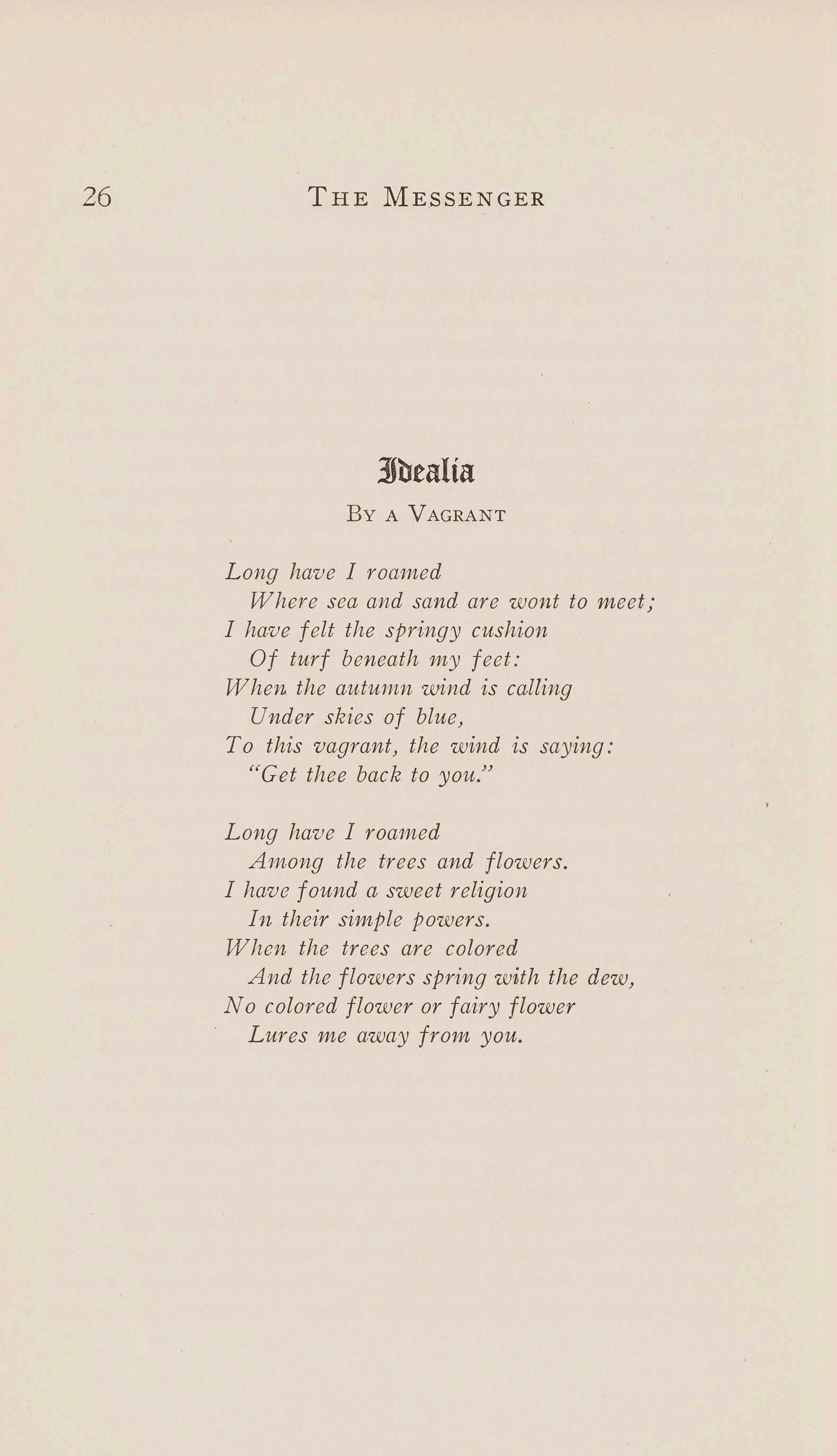
3Jbealia
BY A VAGRANT
Long have I roam,ed Where sea and sand are wont to meet; I have felt the springy cushion Of turf beneath my feet: When the autumn wind is calling Under skies of blue, To this vagrant, the wind is saying: "Get thee back to you."
Long have I roamed A11wng the trees and flowers. I have found a sweet religion In their simple powers. When the trees are colored And the flowers spring with the dew, No colored flower or fairy flower Lures me away from you.
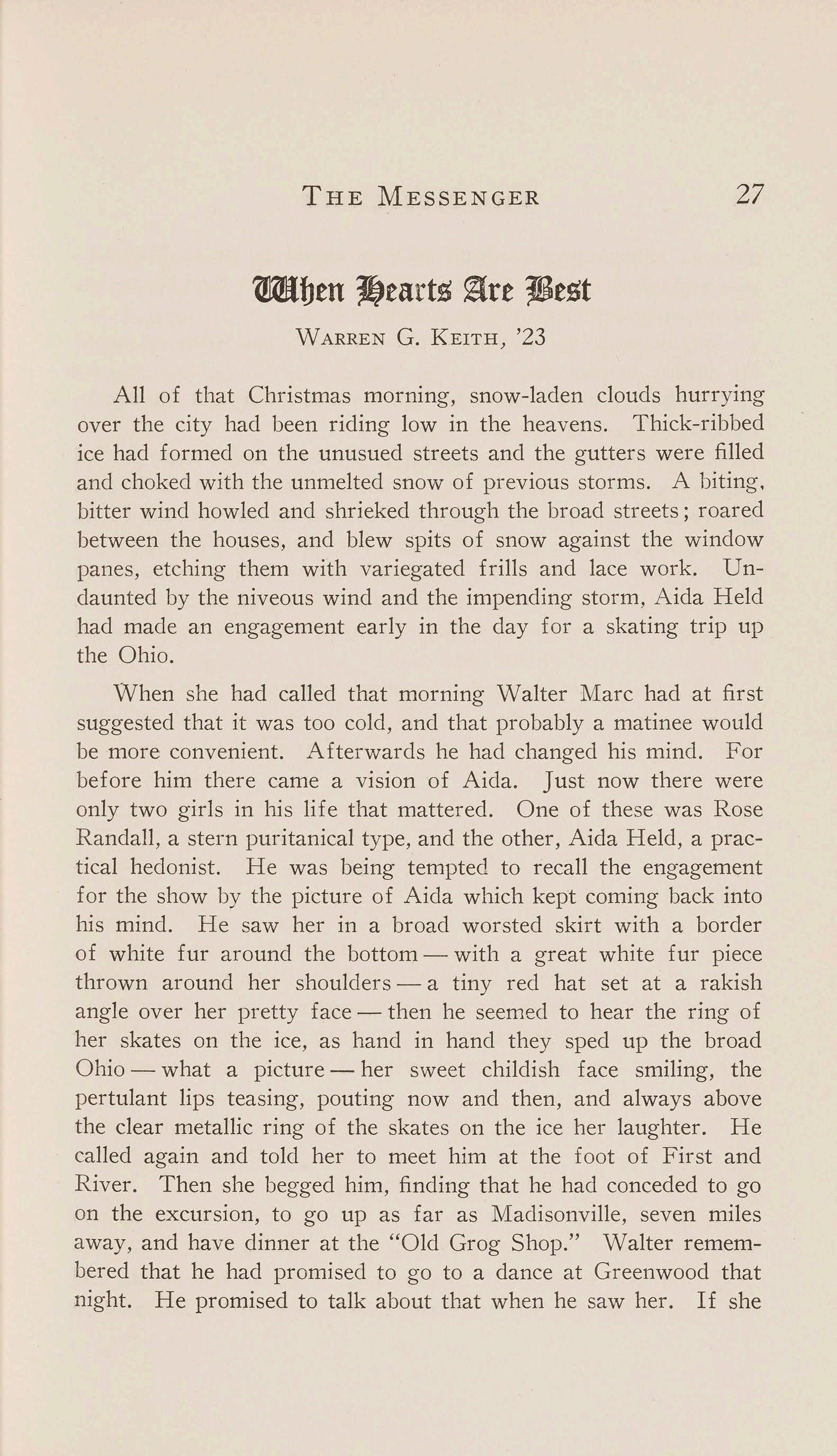
WARREN G. KEITH, '23
All of that Christmas morning, snow-laden clouds hurrying over the city had been riding low in the heavens. Thick-ribbed ice had formed on the unusued streets and the gutters were filled and choked with the unmelted snow of previous storms. A biting, bitter wind howled and shrieked through the broad streets; roared between the houses, and blew spits of snow against the window panes, etching them with variegated frills and lace work. Undaunted by the niveous wind and the impending storm, Aida Held had made an engagement early in the clay for a skating trip up the Ohio.
When she had called that morning Walter Marc had at first suggested that it was too cold, and that probably a matinee would be more convenient. Afterwards he had changed his mind. For before him there came a vision of Aida. Just now there were only two girls in his life that mattered. One of these was Rose Randall, a stern puritanical type, and the other, Aida Held, a practical hedonist. He was being tempted to recall the engagement for the show by the picture of Aida which kept coming back into his mind. He saw her in a broad worsted skirt with a border of white fur around the bottom - with a great white fur piece thrown around her shoulders - a tiny red hat set at a rakish angle over her pretty face - then he seemed to hear the ring of her skates on the ice, as hand in hand they sped up the broad Ohio - what a picture - her sweet childish face smiling, the pertulant lips teasing, pouting now and then, and always above the clear metallic ring of the skates on the ice her laughter. He called again and told her to meet him at the foot of First and River. Then she begged him, finding that he had conceded to go on the excursion, to go up as far as Madisonville, seven miles away, and have dinner at the "Old Grog Shop." Walter remembered that he had promised to go to a dance at Greenwood that night. He promised to talk about that when he saw her. If she
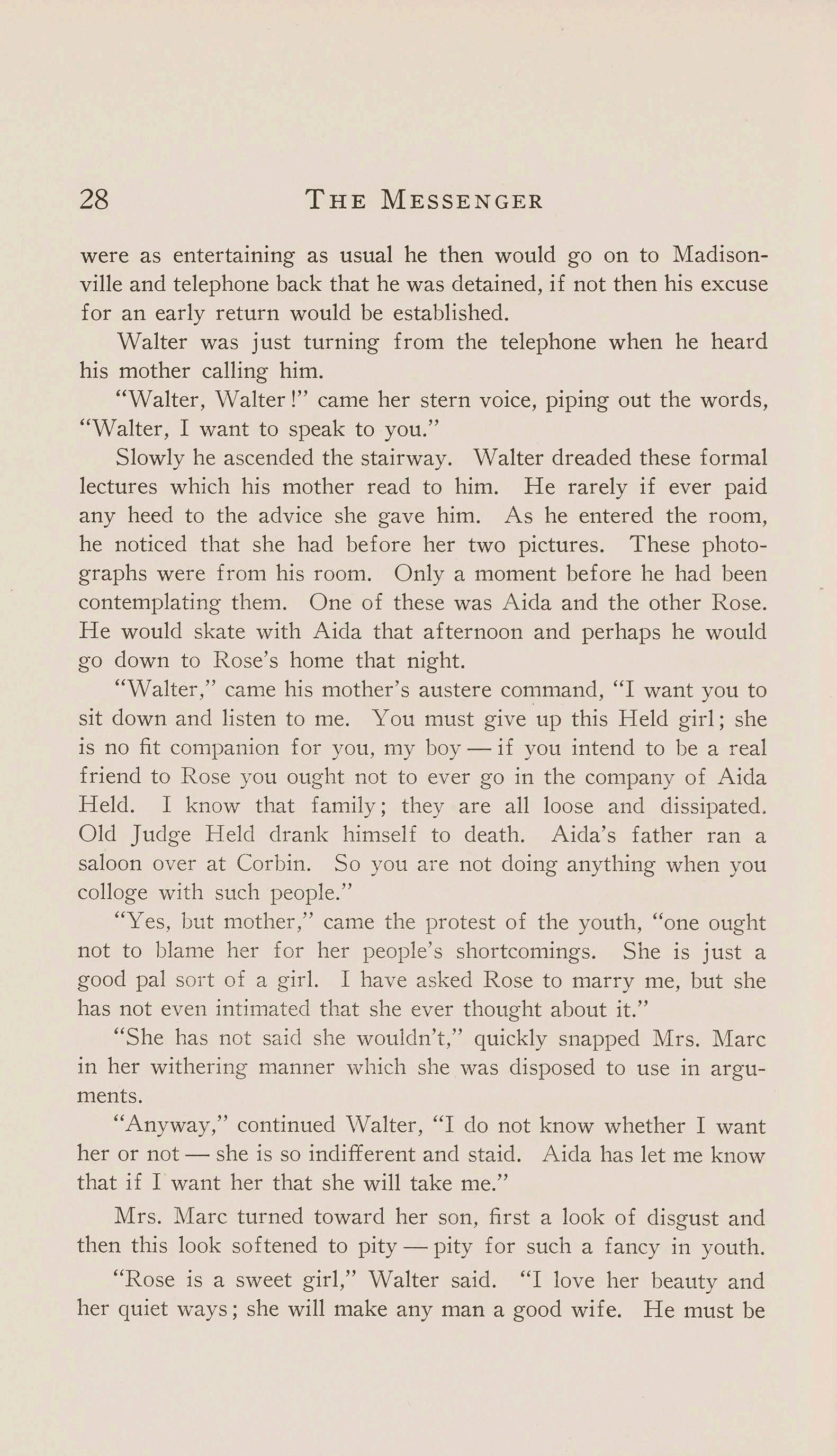
THE MESSENGER
were as entertaining as usual he then would go on to Madisonville and telephone back that he was detained, if not then his excuse for an early return would be established.
Walter was just turning from the telephone when he heard his mother calling him.
"Walter, Walter!" came her stern voice, piping out the words, "Walter, I want to speak to you."
Slowly he ascended the stairway. Walter dreaded these formal lectures which his mother read to him. He rarely if ever paid any heed to the advice she gave him. As he entered the room, he noticed that she had before her two pictures. These photographs were from his room. Only a moment before he had been contemplating them. One of these was Aida and the other Rose. He would skate with Aida that afternoon and perhaps he would go down to Rose's home that night.
"Walter," came his mother's austere command, "I want you to sit down and listen to me. You must give up this Held girl; she is no fit companion for you, my boy -if you intend to be a real friend to Rose you ought not to ever go in the company of Aida Held. I know that family; they are all loose and dissipated. Old Judge Held drank himself to death. Aida's father ran a saloon over at Corbin. So you are not doing anything when you colloge with such people."
"Yes, but mother," came the protest of the youth, "one ought not to blame her for her people's shortcomings. She is just a good pal sort of a girl. I have asked Rose to marry me, but she has not even intimated that she ever thought about it."
"She has not said she wouldn't," quickly snapped Mrs. Marc in her withering manner which she was disposed to use in arguments.
"Anyway," continued \i\Talter, "I do not know whether I want her or not -she is so indifferent and staid. Aida has let me know that if I want her that she will take me."
Mrs. Marc turned toward her son, first a look of disgust and then this look so£tened to pity -pity for such a fancy in youth.
"Rose is a sweet girl," Walter said. "I love her beauty and her quiet ways; she will make any man a good wife. He must be
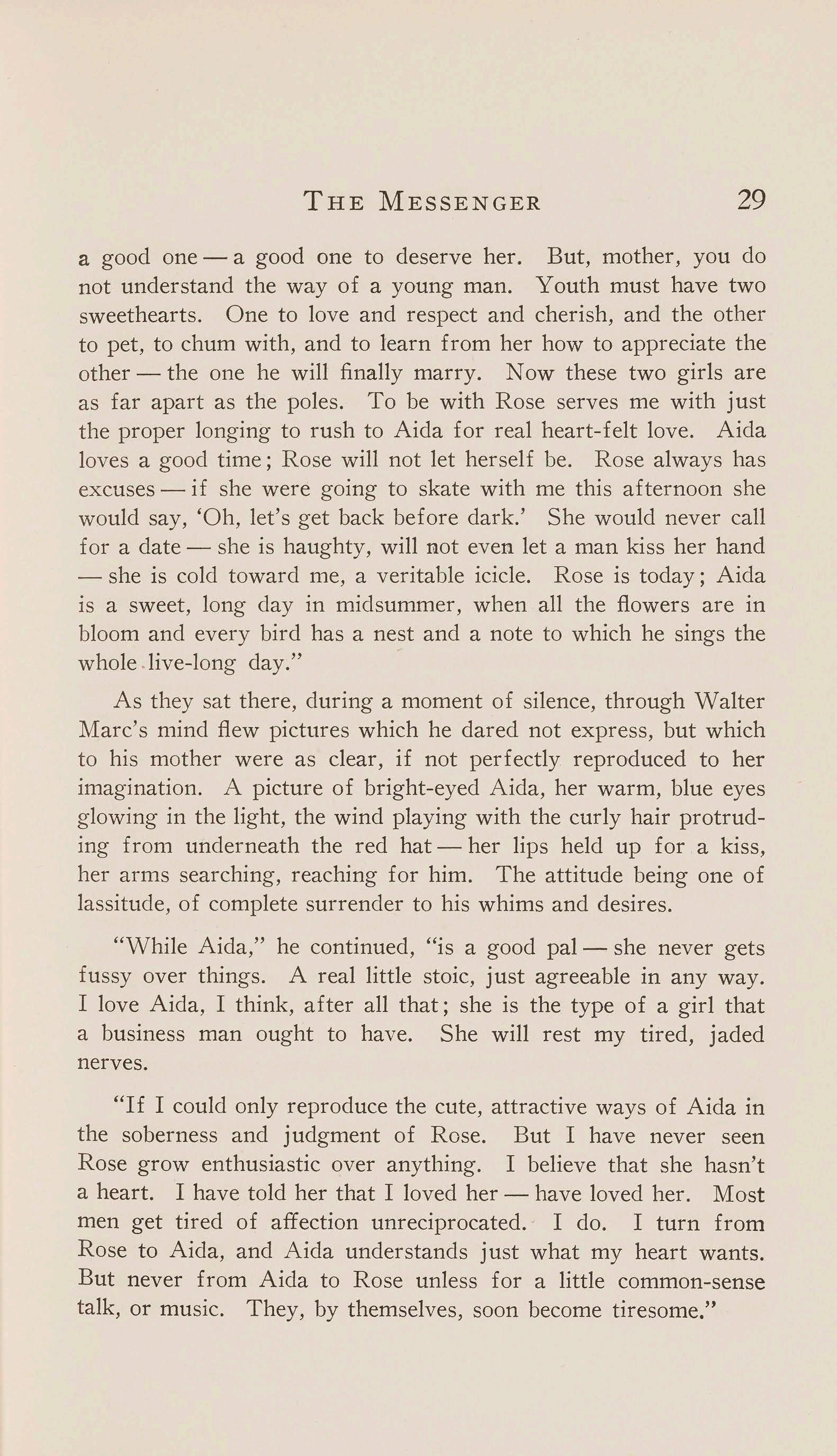
a good one -a good one to deserve her. But, mother, you do not understand the way of a young man. Youth must have two sweethearts. One to love and respect and cherish, and the other to pet, to chum with, and to learn from her how to appreciate the other -the one he will finally marry. Now these two girls are as far apart as the poles. To be with Rose serves me with just the proper longing to rush to Aida for real heart-felt love. Aida loves a good time; Rose will not let herself be. Rose always has excuses -if she were going to skate with me this afternoon she would say, 'Oh, let's get back before dark.' She would never call for a date -she is haughty, will not even let a man kiss her hand -she is cold toward me, a veritable icicle. Rose is today; Aida is a sweet, long day in midsummer, when all the flowers are in bloom and every bird has a nest and a note to which he sings the whole live-long day."
As they sat there, during a moment of silence, through Walter Marc's mind flew pictures which he dared not express, but which to his mother were as clear, if not perfectly reproduced to her imagination. A picture of bright-eyed Aida, her warm, blue eyes glowing in the light, the wind playing with the curly hair protruding from underneath the red hat -her lips held up for a kiss, her arms searching, reaching for him. The attitude being one of lassitude, of complete surrender to his whims and desires.
"While Aida," he continued, "is a good pal -she never gets fussy over things. A real little stoic, just agreeable in any way. I love Aida, I think, after all that; she is the type of a girl that a business man ought to have. She will rest my tired, jaded nerves.
"If I could only reproduce the cute, attractive ways of Aida in the soberness and judgment of Rose. But I have never seen Rose grow enthusiastic over anything. I believe that she hasn't a heart. I have told her that I loved her -have loved her. Most men get tired of affection unreciprocated. I do. I turn from Rose to Aida, and Aida understands just what my heart wants. But never from Aida to Rose unless for a little common-sense talk, or music. They, by themselves, soon become tiresome."
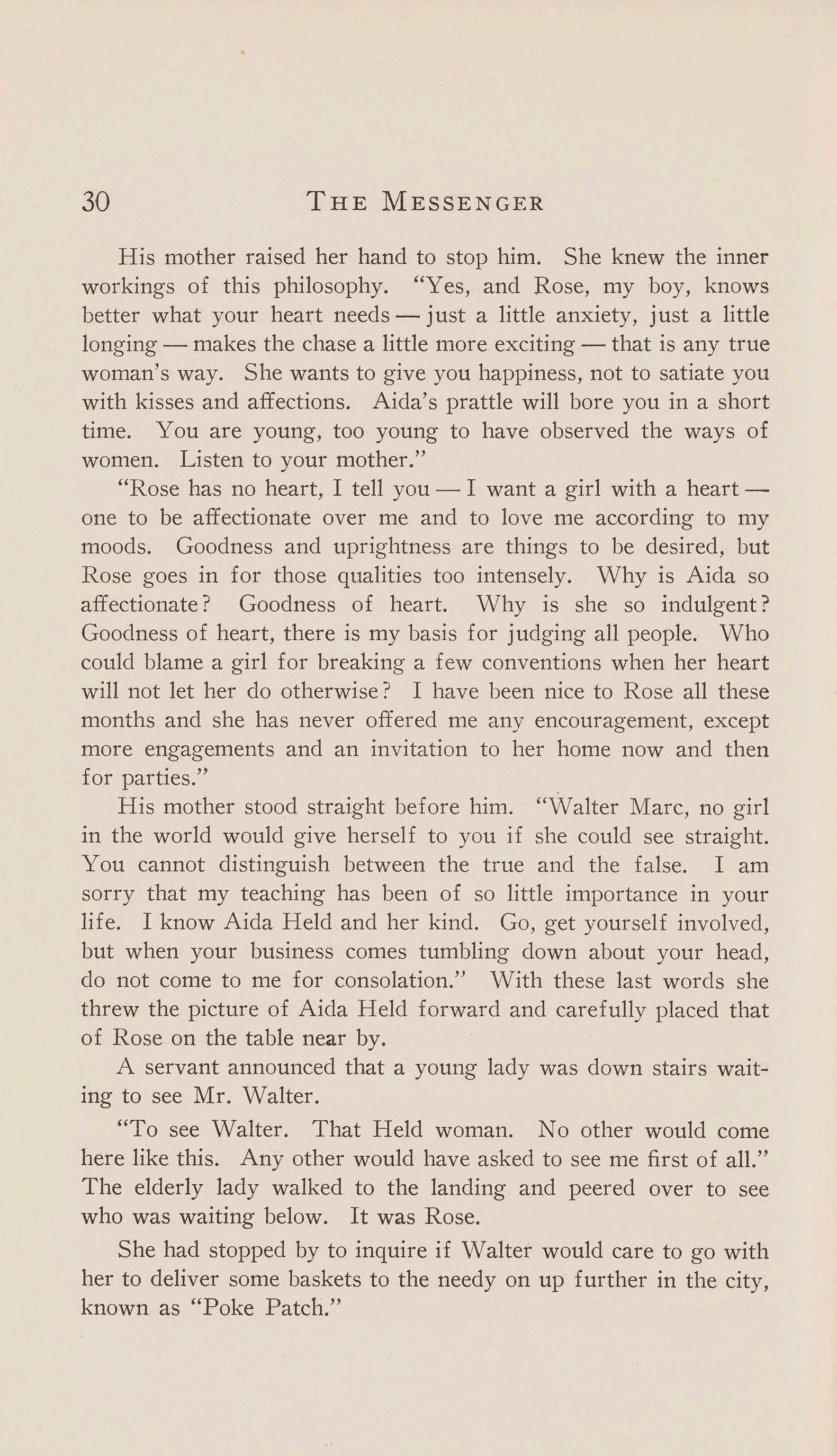
THE MESSENGER
His mother raised her hand to stop him. She knew the inner workings of this philosophy. "Yes, and Rose, my boy, knows better what your heart needs - just a little anxiety, just a little longing - makes the chase a little more exciting - that is any true woman's way. She wants to give you happiness, not to satiate you with kisses and affections. Aida's prattle will bore you in a short time. You are young, too young to have observed the ways of women. Listen to your mother."
"Rose has no heart, I tell you - I want a girl with a heartone to be affectionate over me and to love me according to my moods. Goodness and uprightness are things to be desired, but Rose goes in for those qualities too intensely. Why is Aida so affectionate? Goodness of heart. \i\Thy is she so indulgent? Goodness of heart, there is my basis for judging all people. Who could blame a girl for breaking a few conventions when her heart will not let her do otherwise? I have been nice to Rose all these months and she has never offered me any encouragement , except more engagements and an invitation to her home now and then for parties."
His mother stood straight before him. "Walter Marc, no girl in the world would give herself to you if she could see straight. You cannot distinguish between the true and the false. I am sorry that my teaching has been of so little importance in your life. I know Aida Held and her kind. Go, get yourself involved, but when your business comes tumbling down about your head, do not come to me for consolation." \i\Tith these last words she threw the picture of Aida Held forward and carefully placed that of Rose on the table near by.
A servant announced that a young lady was down stairs waiting to see Mr. Walter.
"To see Walter. That Held woman. No other would come here like this. Any other would have asked to see me first of all." The elderly lady walked to the landing and peered over to see who was waiting below. It was Rose. She had stopped by to inquire if Walter would care to go with her to deliver some baskets to the needy on up further in the city, known as "Poke Patch."
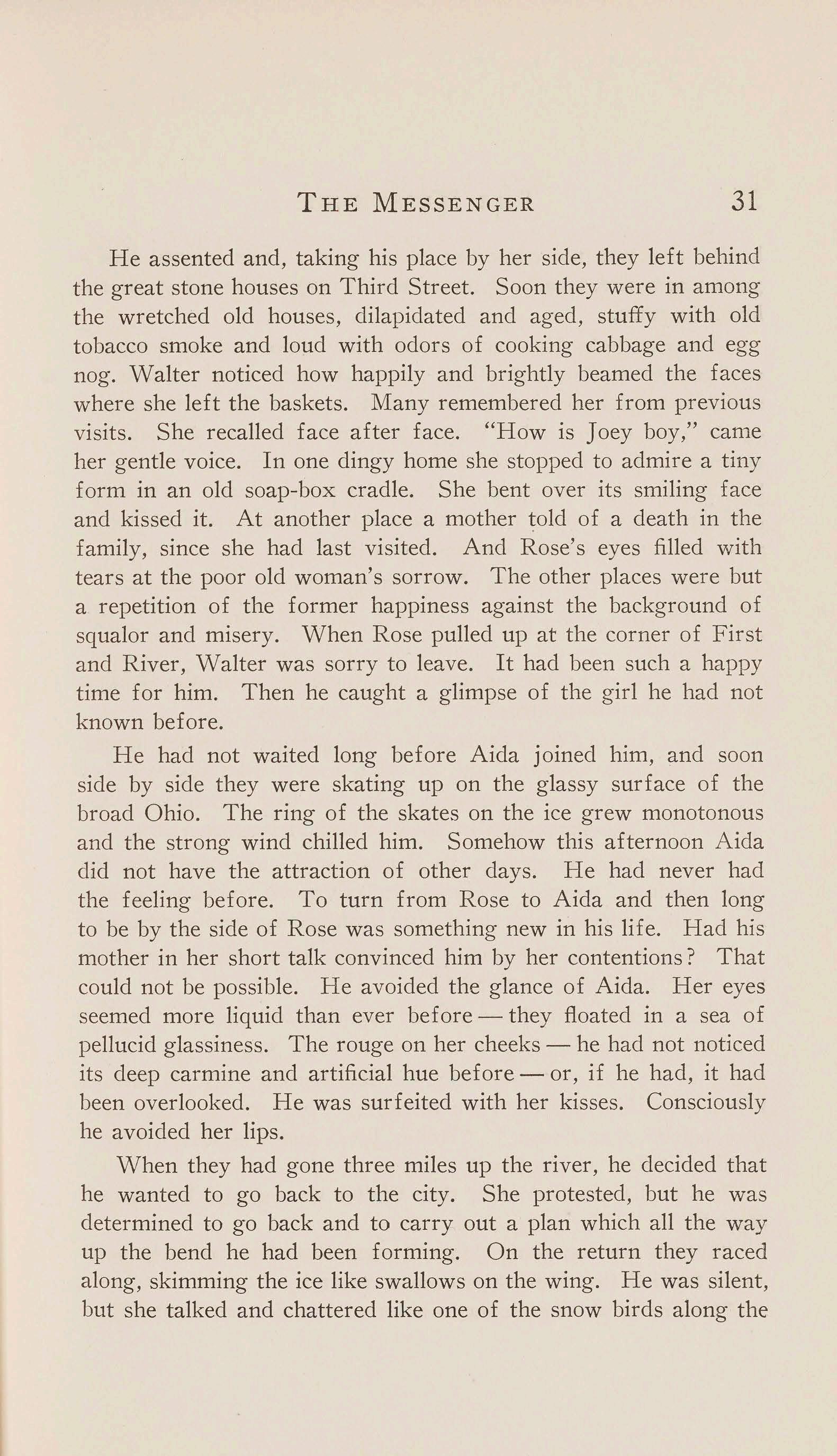
He assented and, taking his place by her side, they left behind the great stone houses on Third Street. Soon they were in among the wretched old houses, dilapidated and aged, stuffy with old tobacco smoke and loud with odors of cooking cabbage and egg nog. Walter noticed how happily and brightly beamed the faces where she left the baskets. Many remembered her from previous v1s1ts. She recalled face after face. "How is Joey boy," came her gentle voice. In one dingy home she stopped to admire a tiny form in an old soap-box cradle. She bent over its smiling face and kissed it. At another place a mother told of a death in the family, since she had last visited. And Rose's eyes filled with tears at the poor old woman's sorrow. The other places were but a repetition of the former happiness against the background of squalor and misery. When Rose pulled up at the corner of First and River, Walter was sorry to leave. It had been such a happy time for him. Then he caught a glimpse of the girl he had n ot known before.
He had not waited long before Aida joined him, and soon side by side they were skating up on the glassy surface of the broad Ohio. The ring of the skates on the ice grew monotonous and the strong wind chilled him. Somehow this afternoon Aida did not have the attraction of other days. He had never had the feeling before. To turn from Rose to Aida and then long to be by the side of Rose was something new in his life Had his mother in her short talk convinced him by her contentions? That could not be possible. He avoided the glance of Aida. Her eyes seemed more liquid than ever before - they floated in a sea of pellucid glassiness. The rouge on her cheeks - he had not noticed its deep carmine and artificial hue before-or, if he had, it had been overlooked. He was surfeited with her kisses. Consciously he avoided her lips.
When they had gone three miles up the river, he decided that he wanted to go back to the city. She protested, but he was determined to go back and to carry out a plan which all the way up the bend he had been forming. On the return they raced along, skimming the ice like swallows on the wing. He was silent, but she talked and chattered like one of the snow birds along the
THE MESSENGER
bank. She was not conscious of his mood. She fancied that a good warm fire, food and music would restore the old spirit she loved to tease.
It was early in the afternoon when they were back at Gordon's, not far from First and River. It is a cheap place, where the ability to pay checks counts most of all and not the particular cut of clothes. Before today Walter had loved the way she held her cigarette. Today he hated her because she lounged so lazily in her chair and blew wreaths of smoke in his face. When the orchestra started up a bit of a waltz she sprang from her chair with outstretched arms waiting for a dance.
"Come on, let's dance.
"No ; I am not dead. \Valter.
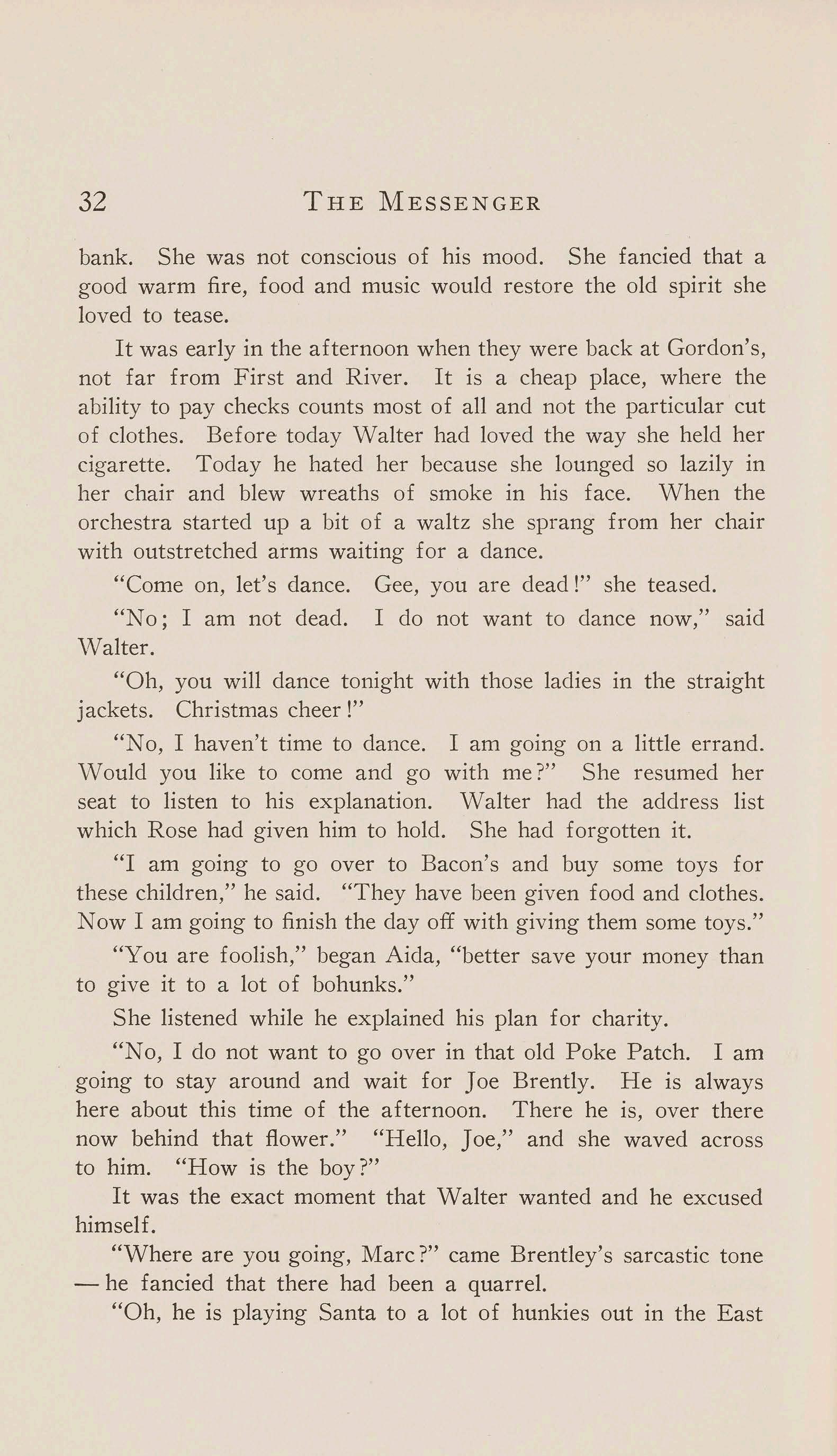
Gee, you are dead !" she teased. I do not want to dance now," said
"Oh, you will dance tonight with those ladies in the straight jackets. Christmas cheer !"
"No, I haven't time to dance. I am going on a little errand. with me?" She resumed her Walter had the address list Would you like to come and go seat to listen to his explanation. which Rose had given him to hold. She had forgotten it.
"I am going to go over to Bacon's and buy some toys for these children," he said. "They have been given food and clothes. Now I am going to finish the day off with giving them some toys."
"You are foolish," began Aida, "better save your money than to give it to a lot of bohunks."
She listened while he explained his plan for charity.
"No, I do not want to go over in that old Poke Patch. I am going to stay around and wait for Joe Brently. He is always here about this time of the afternoon. There he is, over there now behind that flower." "Hello, Joe," and she waved across to him. "How is the boy?"
It was the exact moment that Walter wanted and he excused himself.
"Where are you going, Marc?" came Brentley's sarcastic tone -he fancied that there had been a quarrel.
"Oh, he is playing Santa to a lot of hunkies out in the East
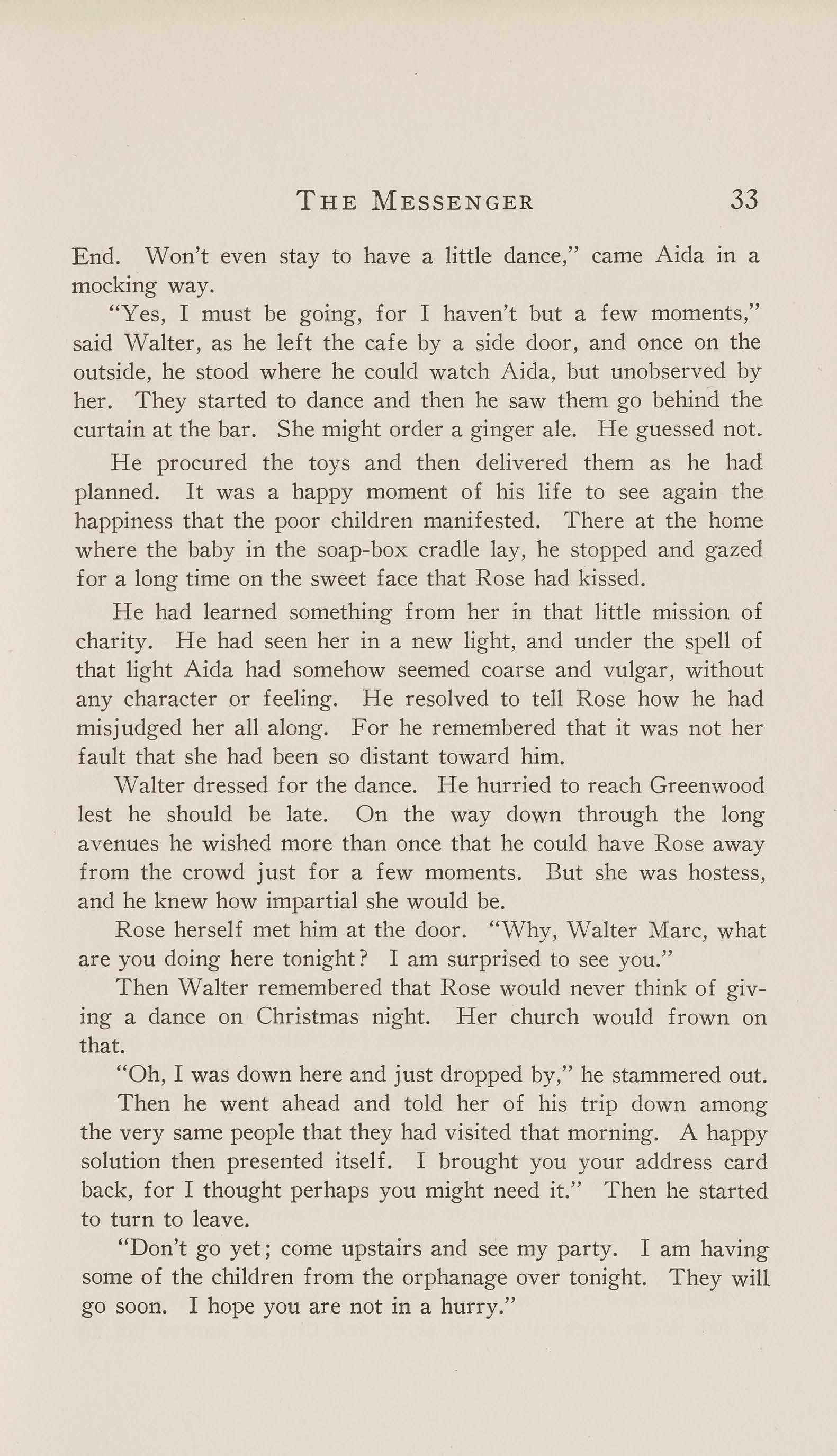
End. Won't even stay to have a little dance," came Aida m a mocking way.
"Yes, I must be going, for I haven't but a few moments," said Walter, as he left the cafe by a side door, and once on the outside, he stood where he could watch Aida, but unobserved by her. They started to dance and then he saw them go behind the curtain at the bar. She might order a ginger ale. He guessed not.
He procured the toys and then delivered them as he had planned. It was a happy moment of his life to see again the happiness that the poor children manifested. There at the home where the baby in the soap-box cradle lay, he stopped and gazed for a long time on the sweet face that Rose had kissed.
He had learned something from her in that little mission of charity. He had seen her in a new light, and under the spell of that light Aida had somehow seemed coarse and vulgar, without any character or feeling. He resolved to tell Rose how he had misjudged her all along. For he remembered that it was not her fault that she had been so distant toward him.
Walter dressed for the dance. He hurried to reach Greenwood lest he should be late. On the way down through the long avenues he wished more than once that he could have Rose away from the crowd just for a few moments. But she was hostess, and he knew how impartial she would be.
Rose herself met him at the door. "Why, Walter Marc, what are you doing here tonight? I am surprised to see you."
Then Walter remembered that Rose would never think of giving a dance on Christmas night. Her church would frown on that.
"Oh, I was down here and just dropped by," he stammered out. Then he went ahead and told her of his trip down among the very same people that they had visited that morning. A happy solution then presented itself. I brought you your address card back, for I thought perhaps you might need it." Then he started to turn to leave.
"Don't go yet; come upstairs and see my party. I am having some of the children from the orphanage over tonight. They will go soon. I hope you are not in a hurry."
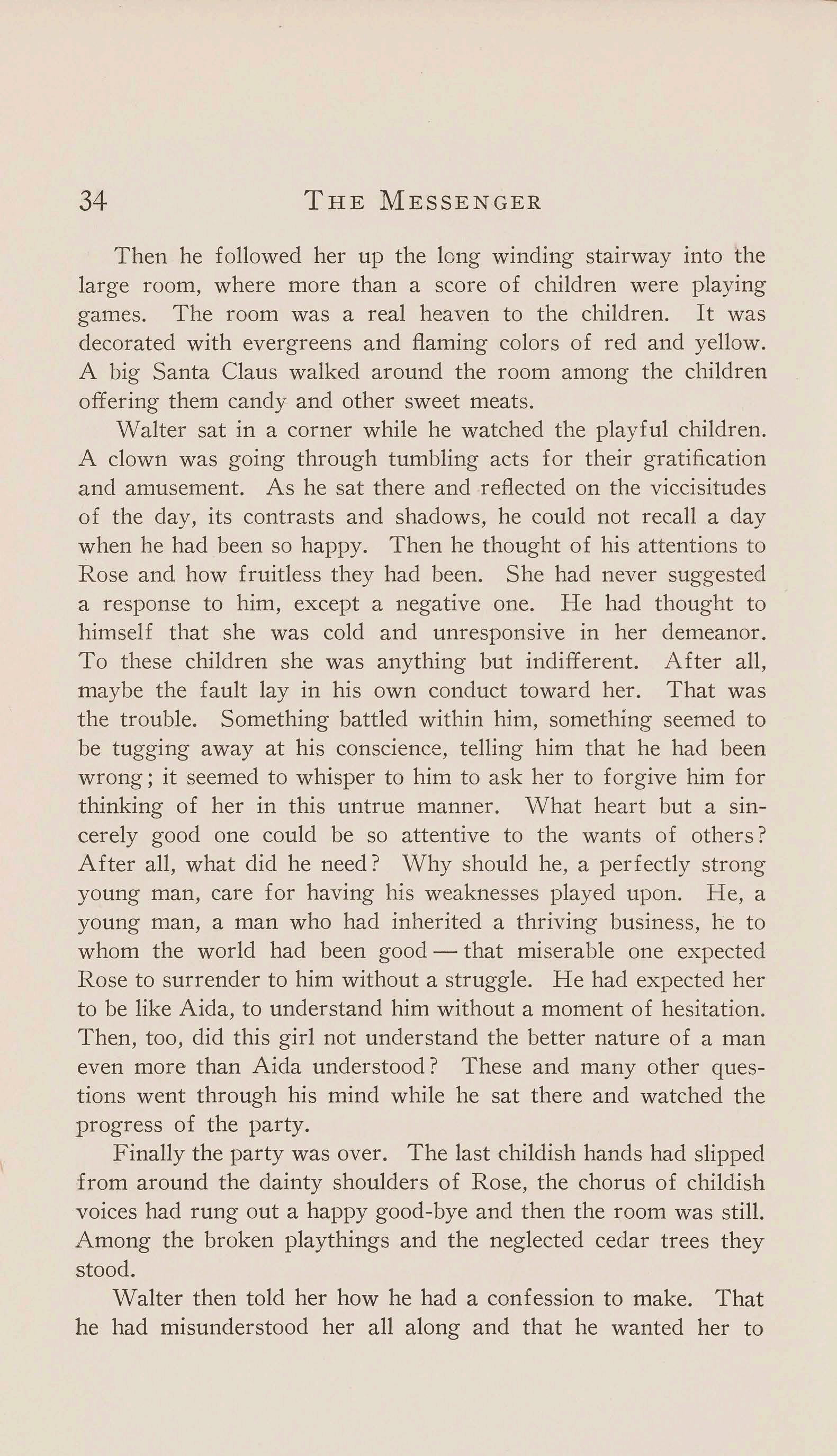
THE MESSENGER
Then he followed her up the long winding stairway into the large room, where more than a score of children were playing games. The room was a real heaven to the children. It was decorated with evergreens and flaming colors of red and yellow. A big Santa Claus walked around the room among the children offering them candy and other sweet meats.
Walter sat in a corner while he watched the playful children. A clown was going through tumbling acts for their gratification and amusement. As he sat there and reflected on the viccisitucles of the clay, its contrasts and shadows, he could not recall a day when he had been so happy. Then he thought of his attentions to Rose and how fruitless they had been. She had never sugge sted a response to him, except a negative one. He had thought to himself that she was cold and unresponsive in her demeanor. To these children she was anything but indifferent. After all, maybe the fault lay in his own conduct toward her. That was the trouble. Something battled within him, something seemed to be tugging away at his conscience , telling him that he had been wrong; it seemed to whisper to him to ask her to forgive him for thinking of her in this untrue manner. What heart but a sincerely good one could be so attentive to the wants of others? After all, what did he need? Why should he, a perfectly strong young man, care for having his weaknesses played upon. He, a young man, a man who had inherited a thriving business, he to whom the world had been good - that miserable one expected Rose to surrender to him without a struggle. He had expected her to be like Aida, to understand him without a moment of hesitation. Then, too, did this girl not understand the better nature of a man even more than Aida understood? These and many other questions went through his mind while he sat there and watched the progress of the party.
Finally the party was over. The last childish hands had slipped from around the dainty shoulders of Rose, the chorus of childish voices had rung out a happy good-bye and then the room was still. Among the broken playthings and the neglected cedar trees they stood.
Walter then told her how he had a confession to make. That he had misunderstood her all along and that he wanted her to
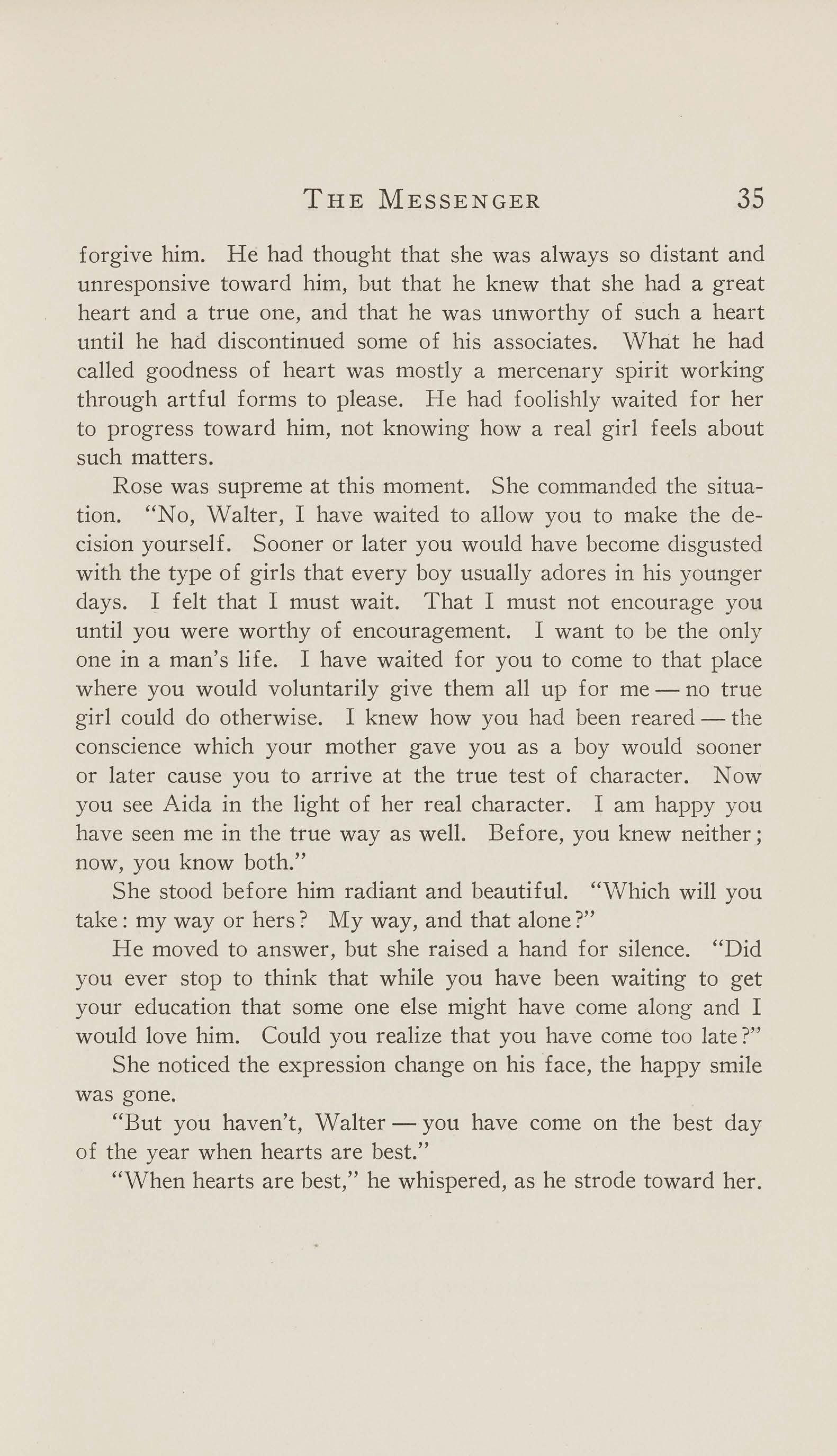
forgive him. He had thought that she was always so distant and unresponsive toward him, but that he knew that she had a great heart and a true one, and that he was unworthy of such a heart until he had discontinued some of his associates. What he had called goodness of heart was mostly a mercenary spirit working through artful forms to please. He had foolishly waited for her to progress toward him, not knowing how a real girl feels about such matters.
Rose was supreme at this moment. She commanded the situation. "No, Walter, I have waited to allow you to make the decision yourself. Sooner or later you would have become disgusted with the type of girls that every boy usually adores in his younger days. I felt that I must wait. That I must not encourage you until you were worthy of encouragement. I want to be the only one in a man's life. I have waited for you to come to that place where you would voluntarily give them all up for me -no true girl could do otherwise. I knew how you had been reared -the conscience which your mother gave you as a boy would sooner or later cause you to arrive at the true test of character. Now you see Aida in the light of her real character. I am happy you have seen me in the true way as well. Before, you knew neither; now, you know both."
She stood before him radiant and beautiful. "Which will you take: my way or hers? My way, and that alone?"
He moved to answer, but she raised a hand for silence. "Did you ever stop to think that while you have been waiting to get your education that some one else might have come along and I would love him. Could you realize that you have come too late?"
She noticed the expression change on his face, the happy smile was gone.
"But you haven't, Walter -you have come on the best day of the year when hearts are best."
"When hearts are best," he whispered, as he strode toward her.
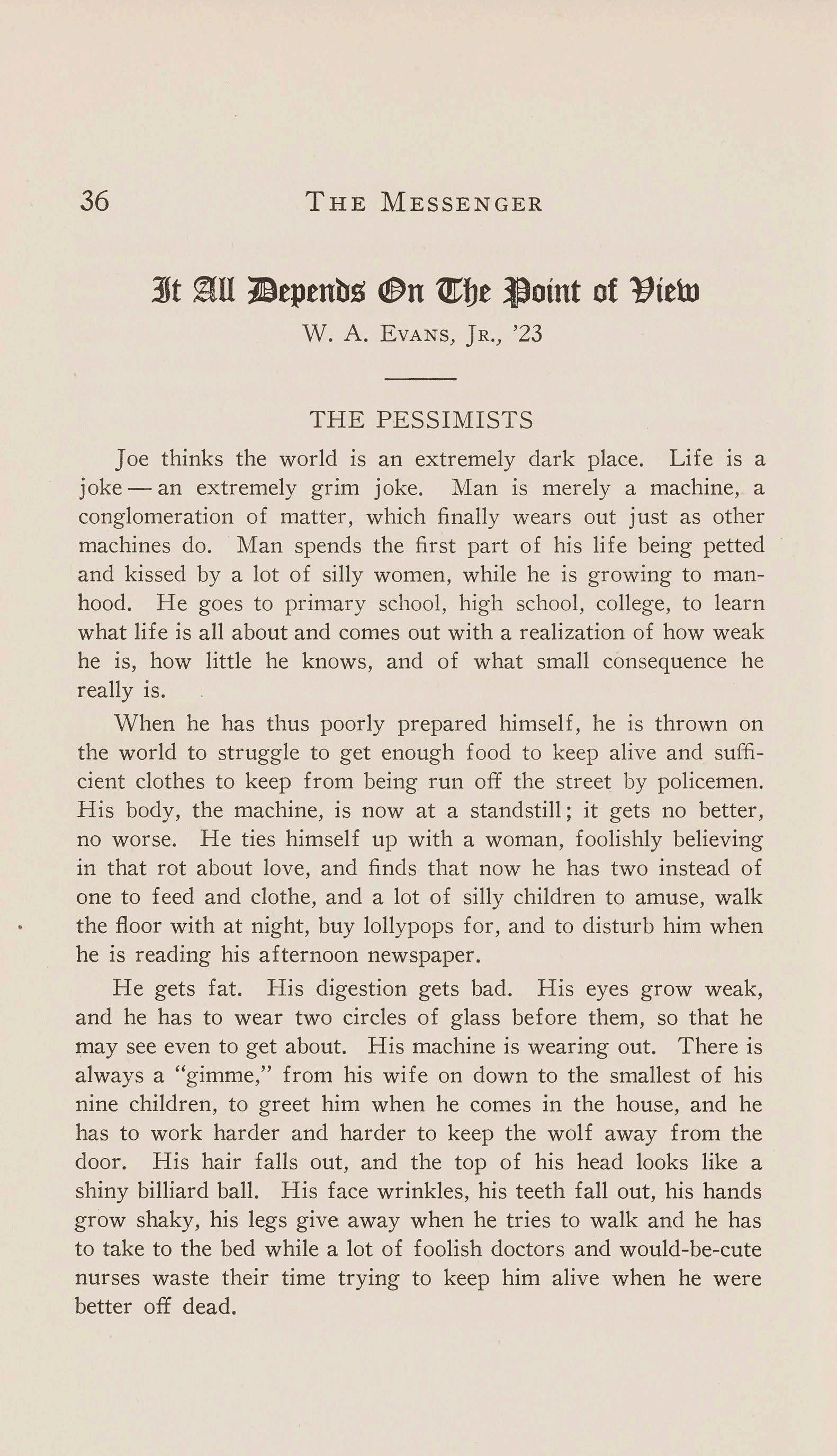
w. A. EVANS, JR., '23
THE PESSIMISTS
Joe thinks the world is an extremely dark place. Life is a joke -an extremely grim joke. Man is merely a machine, a conglomeration of matter, which finally wears out just as other machines do. Man spends the first part of his life being petted and kissed by a lot of silly women, while he is growing to manhood. He goes to primary school, high school, college, to learn what life is all about and comes out with a realization of how weak he is, how little he knows, and of what small consequence he really is.
When he has thus poorly prepared himself, he is thrown on the world to struggle to get enough food to keep alive and sufficient clothes to keep from being run off the street by policemen. His body, the machine, is now at a standstill; it gets no better, no worse . He ties himself up with a woman, foolishly believing in that rot about love, and finds that now he has two instead of one to feed and clothe, and a lot of silly children to amuse, walk the floor with at night, buy lollypops for, and to disturb him when he is reading his afternoon newspaper.
He gets fat. His digestion gets bad. His eyes grow weak, and he has to wear two circles of glass before them, so that he may see even to get about. His machine is wearing out. There is always a "gimme," from his wife on down to the smallest of his nine children, to greet him when he comes in the house, and he has to work harder and harder to keep the wolf away from the door. His hair falls out, and the top of his head looks like a shiny billiard ball. His face wrinkles, his teeth fall out, his hands grow shaky, his legs give away when he tries to walk and he has to take to the bed while a lot of foolish doctors and would-be-cute nurses waste their time trying to keep him alive when he were better off dead.
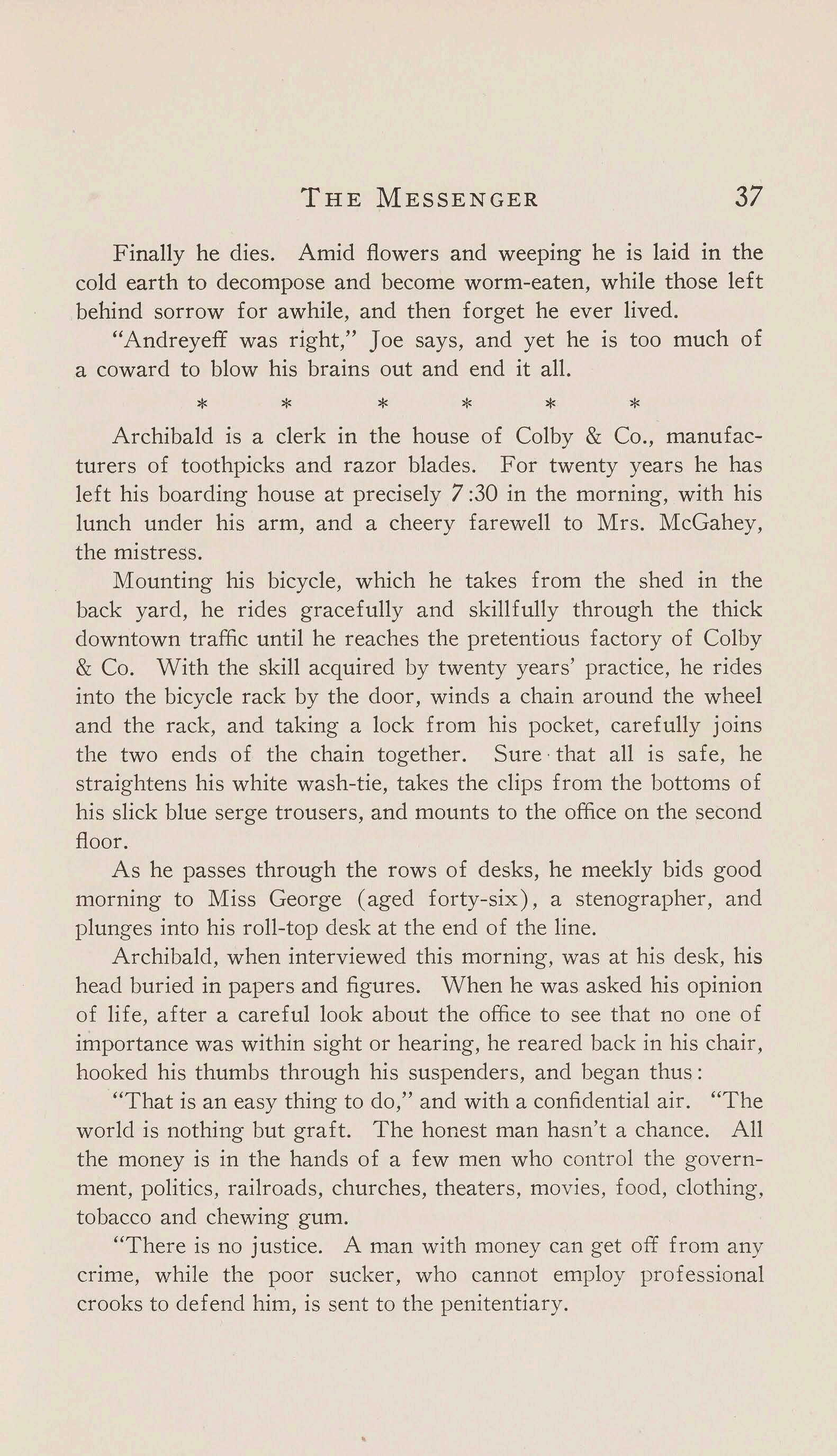
Finally he dies. Amid flowers and weeping he is laid in the cold earth to decompose and become worm-eaten, while those left behind sorrow for awhile, and then forget he ever lived.
"Andreyeff was right," Joe says, and yet he 1s too much of a coward to blow his brains out and end it all.
Archibald is a clerk in the house of Colby & Co., manufacturers of toothpicks and razor blades. For twenty years he has left his boarding house at precisely 7 :30 in the morning, with his lunch under his arm, and a cheery farewell to Mrs. McGahey, the mistress.
Mounting his bicycle, which he takes from the shed in the back yard, he rides gracefully and skillfully through the thick downtown traffic until he reaches the pretentious factory of Colby & Co. With the skill acquired by twenty years' practice, he rides into the bicycle rack by the door, winds a chain around the wheel and the rack, and taking a lock from his pocket, carefully joins the two ends of the chain together. Sure· that all is safe, he straightens his white wash-tie, takes the clips from the bottoms of his slick blue serge trousers, and mounts to the office on the second floor.
As he passes through the rows of desks, he meekly bids good morning to Miss George ( aged forty-six), a stenographer, and plunges into his roll-top desk at the end of the line.
Archibald, when interviewed this morning, was at his desk, his head buried in papers and figures. When he was asked his opinion of life, after a careful look about the office to see that no one of importance was within sight or hearing, he reared back in his chair, hooked his thumbs through his suspenders, and began thus:
"That is an easy thing to do," and with a confidential air. "The world is nothing but graft. The honest man hasn't a chance. All the money is in the hands of a few men who control the government, politics, railroads, churches, theaters, movies, food, clothing, tobacco and chewing gum.
"There is no justice. A man with money can get off from any crime, while the poor sucker, who cannot employ professional crooks to defend him, is sent to the penitentiary.
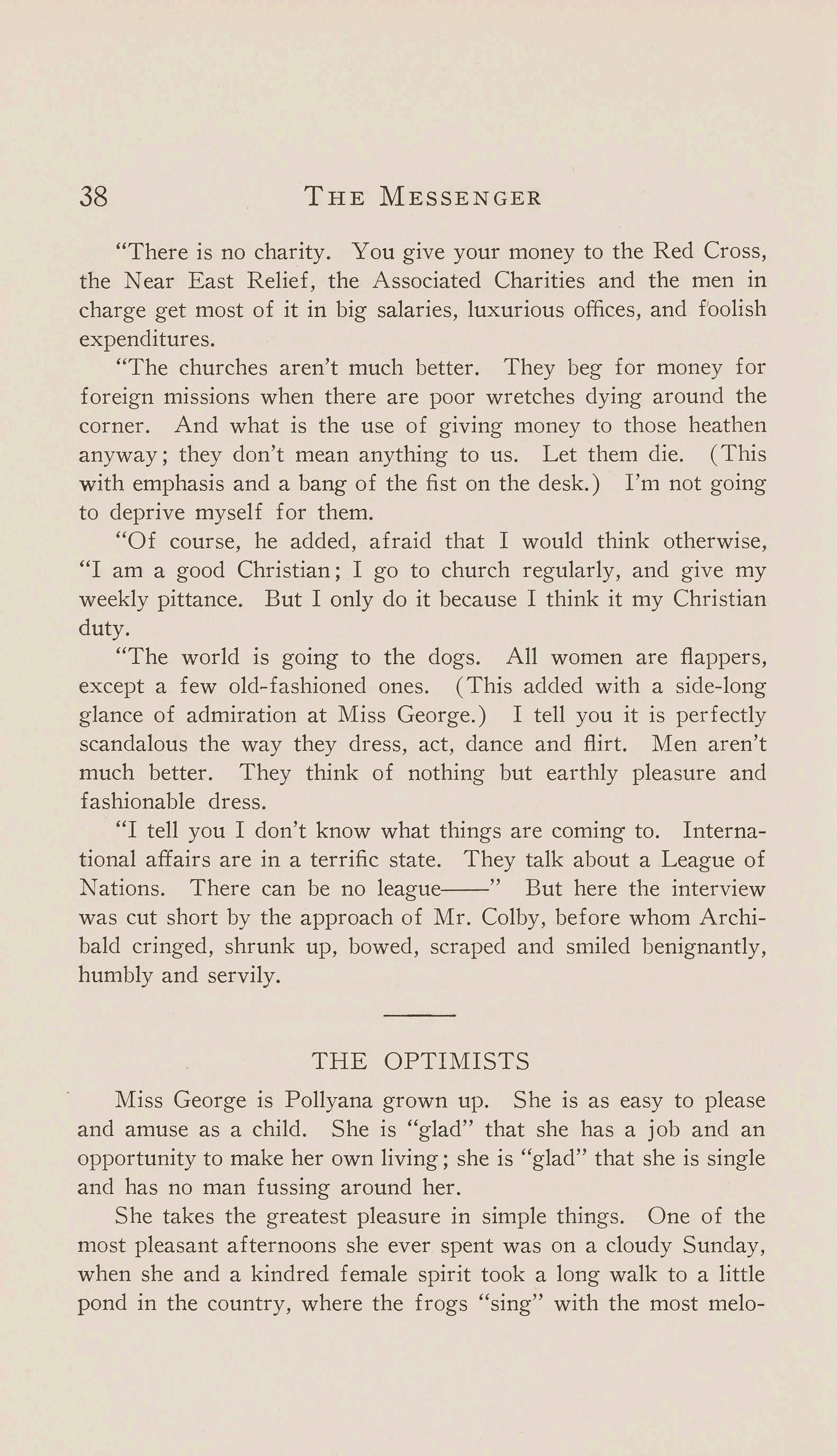
THE MESSENGER
"There is no charity. You give your money to the Red Cross, the Near East Relief, the Associated Charities and the men in charge get most of it in big salaries, luxurious offices, and foolish expenditures.
"The churches aren't much better. They beg for money for foreign missions when there are poor wretches dying around the corner. And what is the use of giving money to those heathen anyway; they don't mean anything to us. Let them die. (This with emphasis and a bang of the fist on the desk.) I'm not going to deprive myself for them.
"Of course, he added, afraid that I would think otherwise, "I am a good Christian; I go to church regularly, and give my weekly pittance. But I only do it because I think it my Christian duty.
"The world is going to the dogs. All women are flappers, except a few old-fashioned ones. (This added with a side-long glance of admiration at Miss George.) I tell you it is perfectly scandalous the way they dress, act, dance and flirt. Men aren't much better. They think of nothing but earthly pleasure and fashionable dress.
"I tell you I don't know what things are coming to. International affairs are in a terrific state. They talk about a League of Nations. There can be no league--" But here the interview was cut short by the approach of Mr. Colby, before whom Archibald cringed, shrunk up, bowed, scraped and smiled benignantly, humbly and servily.
THE OPTIMISTS
Miss George is Pollyana grown up. She is as easy to please and amuse as a child. She is "glad" that she has a job and an opportunity to make her own living; she is "glad" that she is single and has no man fussing around her.
She takes the greatest pleasure in simple things. One of the most pleasant afternoons she ever spent was on a cloudy Sunday, when she and a kindred female spirit took a long walk to a little pond in the country, where the frogs "sing" with the most melo-
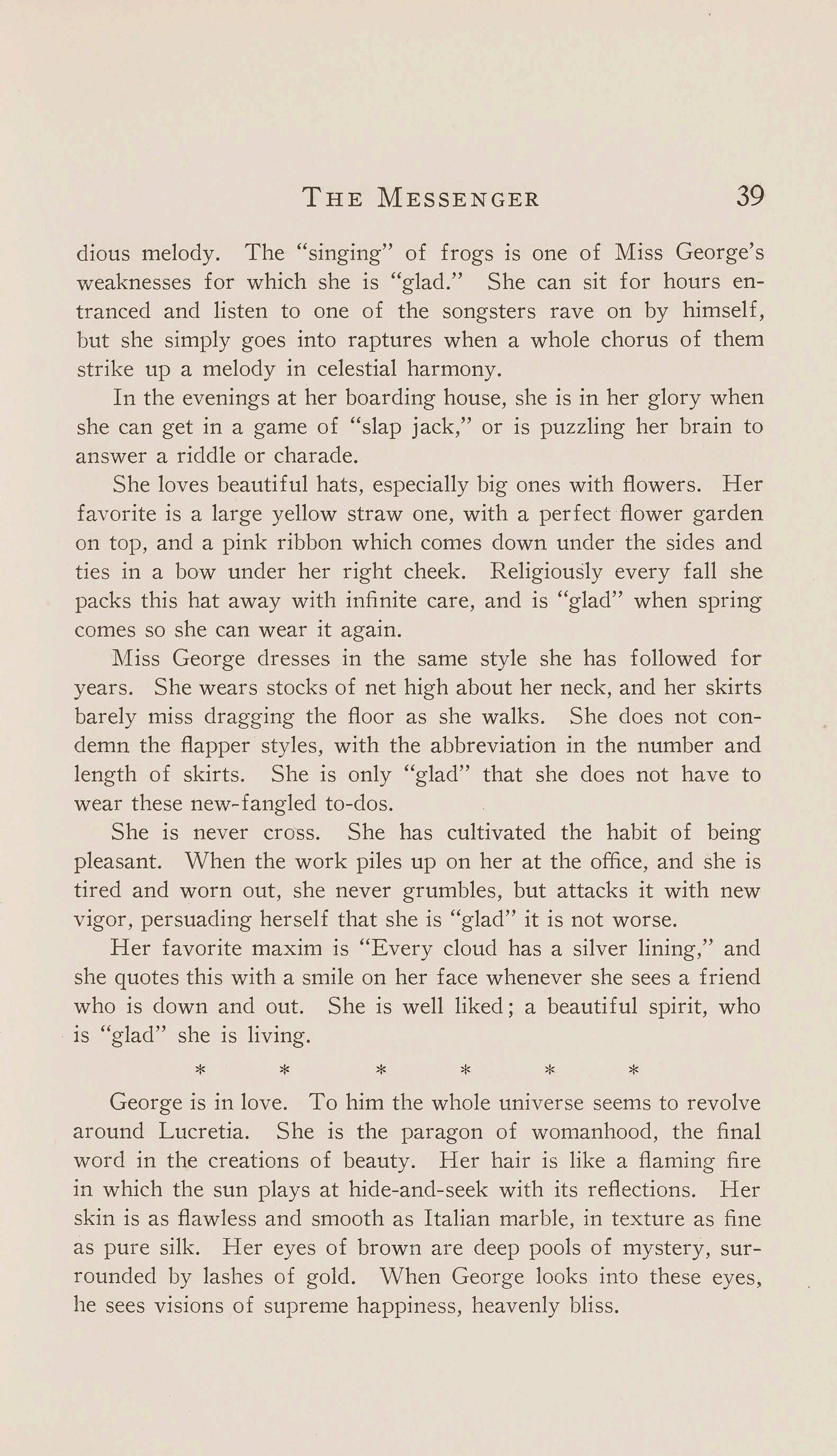
dious melody. The "singing" of frogs is one of Miss George's weaknesses for which she is "glad." She can sit for hours entranced and listen to one of the songsters rave on by himself, but she simply goes into raptures when a whole chorus of them strike up a melody in celestial harmony.
In the evenings at her boarding house, she is in her glory when she can get in a game of "slap jack," or is puzzling her brain to answer a riddle or charade.
She loves beautiful hats, especially big ones with flowers. Her favorite is a large yellow straw one, with a perfect flower garden on top, and a pink ribbon which comes down under the sides and ties in a bow under her right cheek. Religiously every fall she packs this hat away with infinite care, and is "glad" when spring comes so she can wear it again.
Miss George dresses in the same style she has followed for years. She wears stocks of net high about her neck, and her skirts barely miss dragging the floor as she walks. She does not condemn the flapper styles, with the abbreviation in the number and length of skirts. She is only "glad" that she does not have to wear these new-fangled to-dos.
She is never cross. She has cultivated the habit of being pleasant. When the work piles up on her at the office, and she is tired and worn out, she never grumbles, but attacks it with new vigor, persuading herself that she is "glad" it is not worse.
Her favorite maxim is "Every cloud has a silver lining," and she quotes this with a smile on her face whenever she sees a friend who is clown and out. She is well liked; a beautiful spirit, who 1s "glad" she is living.
George is in love. To him the whole universe seems to revolve around Lucretia. She is the paragon of womanhood, the final word in the creations of beauty. Her hair is like a flaming fire in which the sun plays at hide-and-seek with its reflections. Her skin is as flawless and smooth as Italian marble, in texture as fine as pure silk. Her eyes of brown are deep pools of mystery, surrounded by lashes of gold. When George looks into these eyes, he sees visions of supreme happiness, heavenly bliss.
THE MESSENGER
Her form far surpasses the fair Venus, her hands are delicate white doves, soft and responsive to touch, her arms are a perfect combination of curves and contours.
George is oblivious to everything else in the world but divine Lucretia. Obstacles in his course of love do not at all worry him; they only make him strive harder to make himself worthy of the object of his love. When George is with Lucretia he is perfectly happy; when away from her he is happy in the apparition of her which he conjures up. He reads Oscar Wilde's "Salome" time and time again, and always has a copy in his pocket, so that he can describe the moon in all phrases possible to his Lucretia as they moon in the garden.
It matters not to him that he is poor in the world's goods, that his boss repeatedly tells him that if he don't get down to work and stop dreaming he will be fired, that the world is in chaos, that prohibition is creating a nation of lawbreakers and blind men, he is happy.
He is divinely happy, and is not to be robbed of this happiness by any minor affairs of the world.
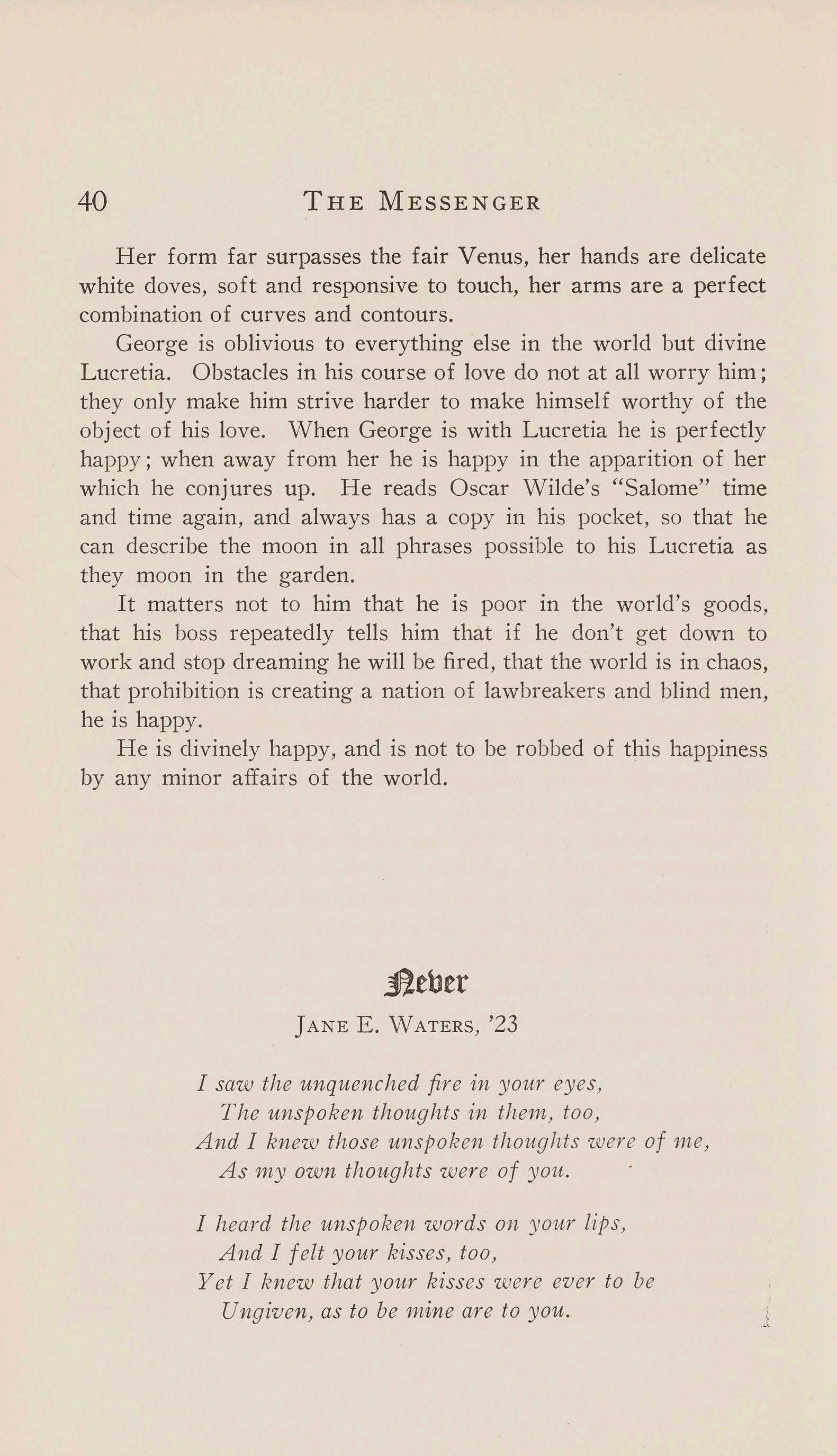
~eber
JANEE. WATERS, '23
I saw the unquenched fire in your eyes, The unspoken thoughts in them, too, And I knew those unspoken thoughts were of me, As my own thoughts were of you.
I heard the unspoken words on your lips, And I felt your kisses, too, Yet I knew that your kisses were ever to be Ungiven, as to be mine are to you.
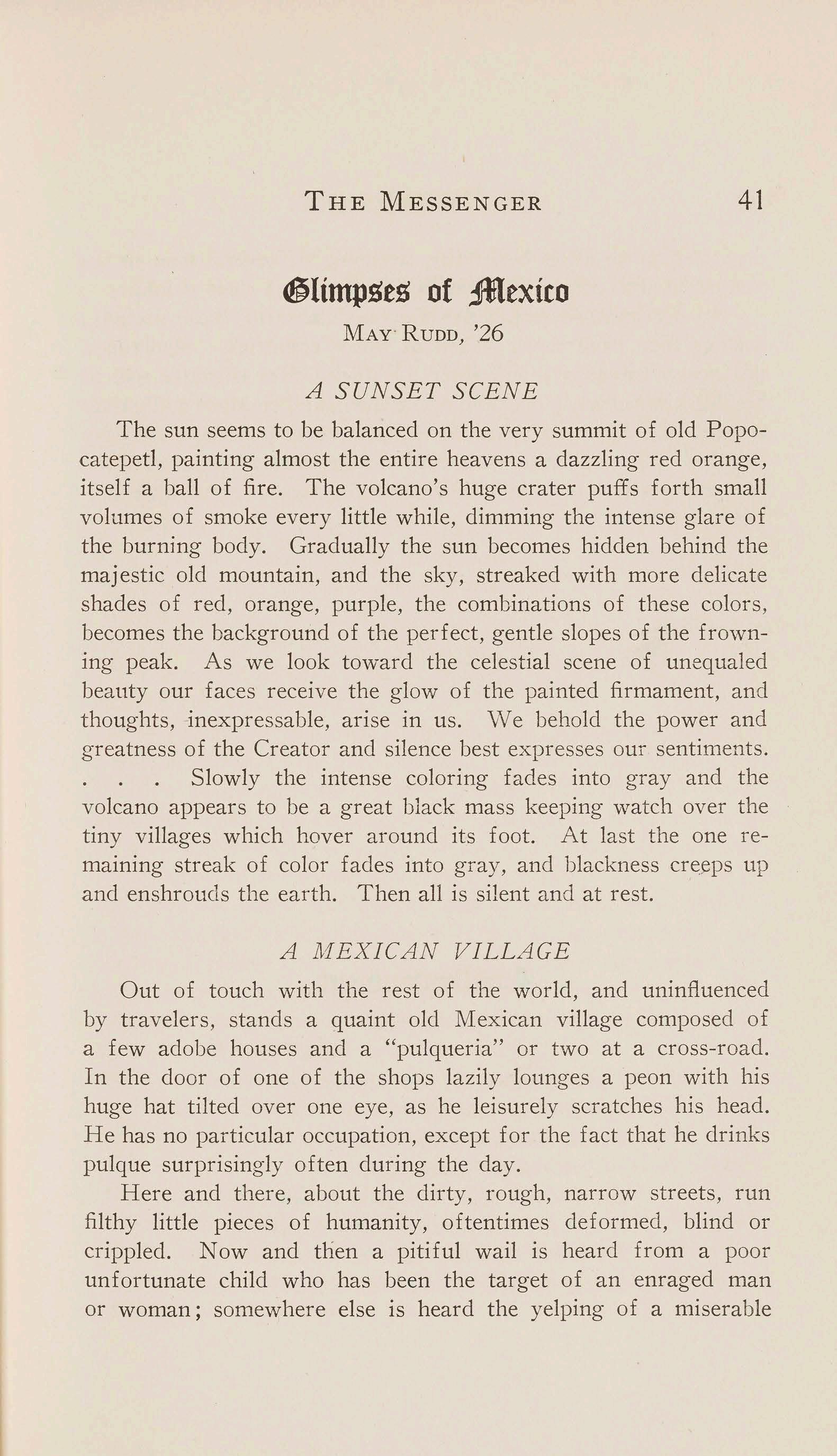
~ltmpsts of ,1Mexico
MAY- Ruoo, '26
A SUNSET SCENE
The sun seems to be balanced on the very summit of old Popocatepetl, painting almost the entire heavens a dazzling red orange, itself a ball of fire. The volcano's huge crater puffs forth small volumes of smoke every little while, dimming the intense glare of the burning body. Gradually the sun becomes hidden behind the majestic old mountain, and the sky, streaked with more delicate shades of red, orange, purple, the combinations of these colors, becomes the background of the perfect, gentle slopes of the frowning peak. As we look toward the celestial scene of unequaled beauty our faces receive the glow of the painted firmament, and thoughts, inexpressable, arise in us. We behold the power and greatness of the Creator and silence best expresses our sentiments. Slowly the intense coloring fades into gray and the volcano appears to be a great black mass keeping watch over the tiny villages which hover around its foot. At last the one remaining streak of color fades into gray, and blackness cre~ps up and enshrouds the earth. Then all is silent and at rest.
A MEXICAN VILLAGE
Out of touch with the rest of the world, and uninfluenced by travelers, stands a quaint old Mexican village composed of a few adobe houses and a "pulqueria" or two at a cross-road. In the door of one of the shops lazily lounges a peon with his huge hat tilted over one eye, as he leisurely scratches his head. He has no particular occupation, except for the fact that he drinks pulque surprisingly often during the day. Here and there, about the dirty, rough, narrow streets, run filthy little pieces of humanity, oftentimes deformed, blind or crippled. Now and then a pitiful wail is heard from a poor unfortunate child who has been the target of an enraged man or woman; somewhere else is heard the yelping of a miserable
THE MESSENGER
dog; but above all is heard the carousing of several men in the pulqueria, who are in high spirits as a result of their drinking. No other world exists for the inhabitants of these secluded towns; they have never heard of other countries. Sometimes, perhaps, a missionary will enter the town. Her entrance will be heralded immediately over the whole town, and children will gather around her, eager and anxious to hear what first may fall from her lips. They listen in wide-eyed wonderment at the stories she tells and perhaps a smile will brighten the face of some little sadfaced boy or gir 1.
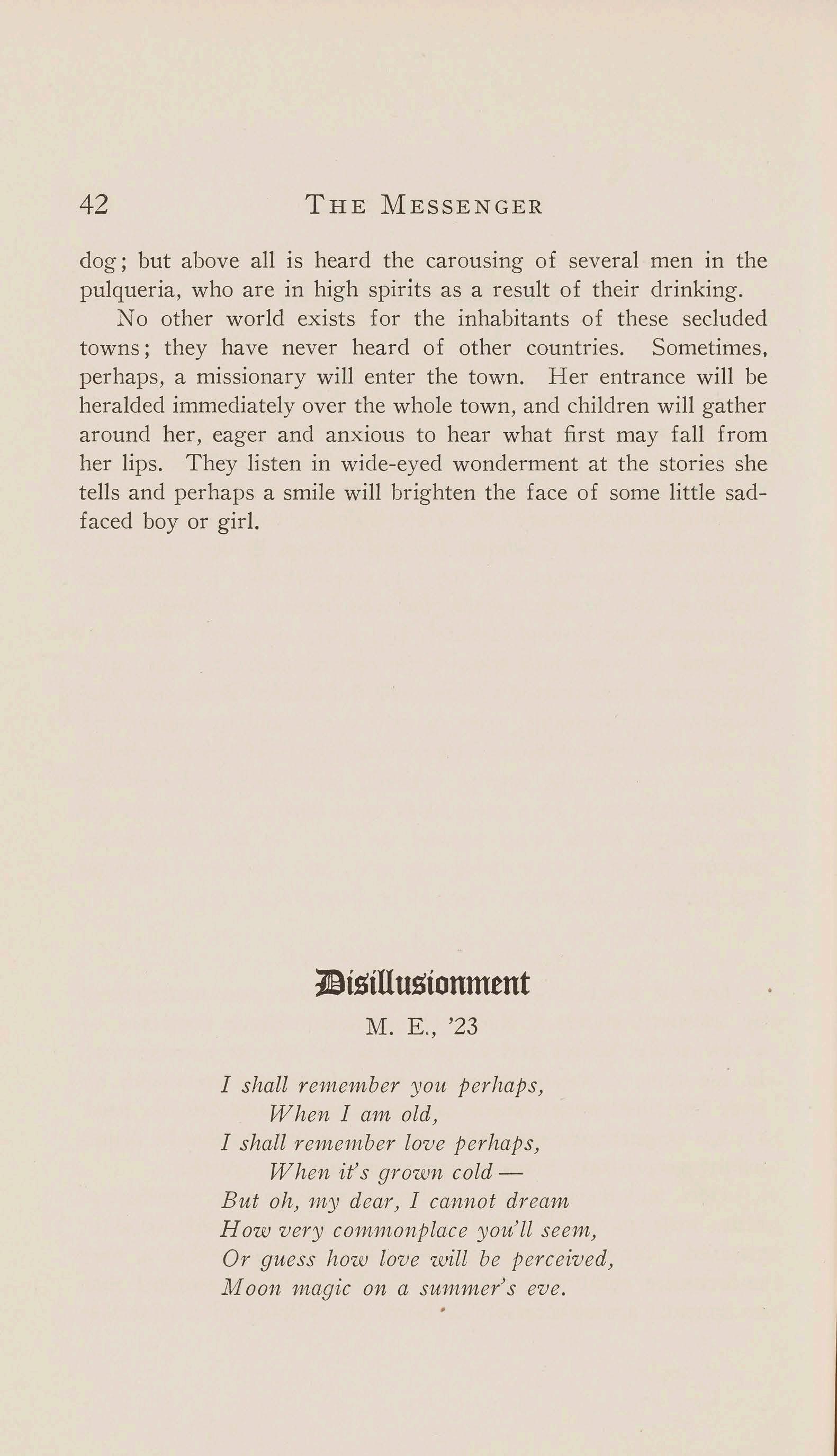
Uli~illu~ionment
M. E., '23
I shall remember you perhaps, When I am old, I shall reme11iber love perhaps, When it's grown coldBut oh, my dear, I cannot dream How very commonplace you'll seem, Or guess how love will be perceived, J.11.oon magic on a summer's eve.
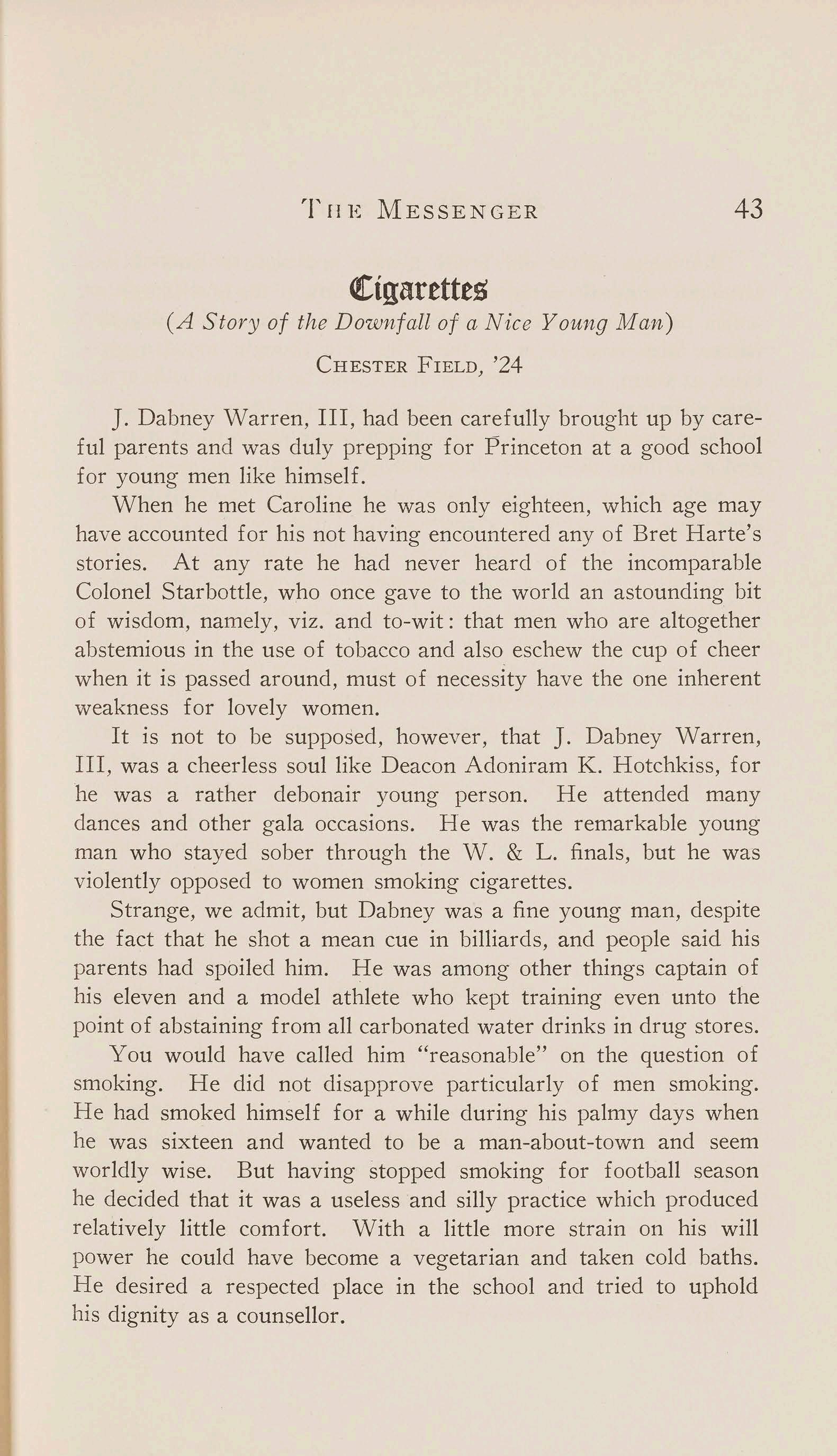
<!Cigarettes
(A Story of the Downfall of a Nice Young Man)
CHESTER FIELD, '24
J. Dabney Warren, III, had been carefully brought up by careful parents and was duly prepping for Princeton at a good school for young men like himself.
When he met Caroline he was only eighteen, which age may have accounted for his not having encountered any of Bret Harte's stories. At any rate he had never heard of the incomparable Colonel Starbottle, who once gave to the world an astounding bit of wisdom, namely, viz . and to-wit: that men who are altogether abstemious in the use of tobacco and also eschew the cup of cheer when it is passed around, must of necessity have the one inherent weakness for lovely women.
It is not to be supposed, however, that J. Dabney Warren, III, was a cheerless soul like Deacon Adoniram K Hotchkiss, for he was a rather debonair young person . He attended many dances and other gala occasions. He was the remarkable young man who stayed sober through the W. & L. finals, but he was violently opposed to women smoking cigarettes.
Strange, we admit, but Dabney was a fine young man, despite the fact that he shot a mean cue in billiards, and people said his parents had spoiled him. He was among other things captain of his eleven and a model athlete who kept training even unto the point of abstaining from all carbonated water drinks in drug stores. You would have called him "reasonable" on the question of smoking. He did not disapprove particularly of men smoking. He had smoked himself for a while during his palmy clays when he was sixteen and wanted to be a man-about-town and seem worldly wise. But having stopped smoking for football season he decided that it was a useless and silly practice which produced relatively little comfort. With a little more strain on his will p ower he could have become a vegetarian and taken cold baths. He desired a respected place in the school and tried to uphold his dignity as a counsellor.
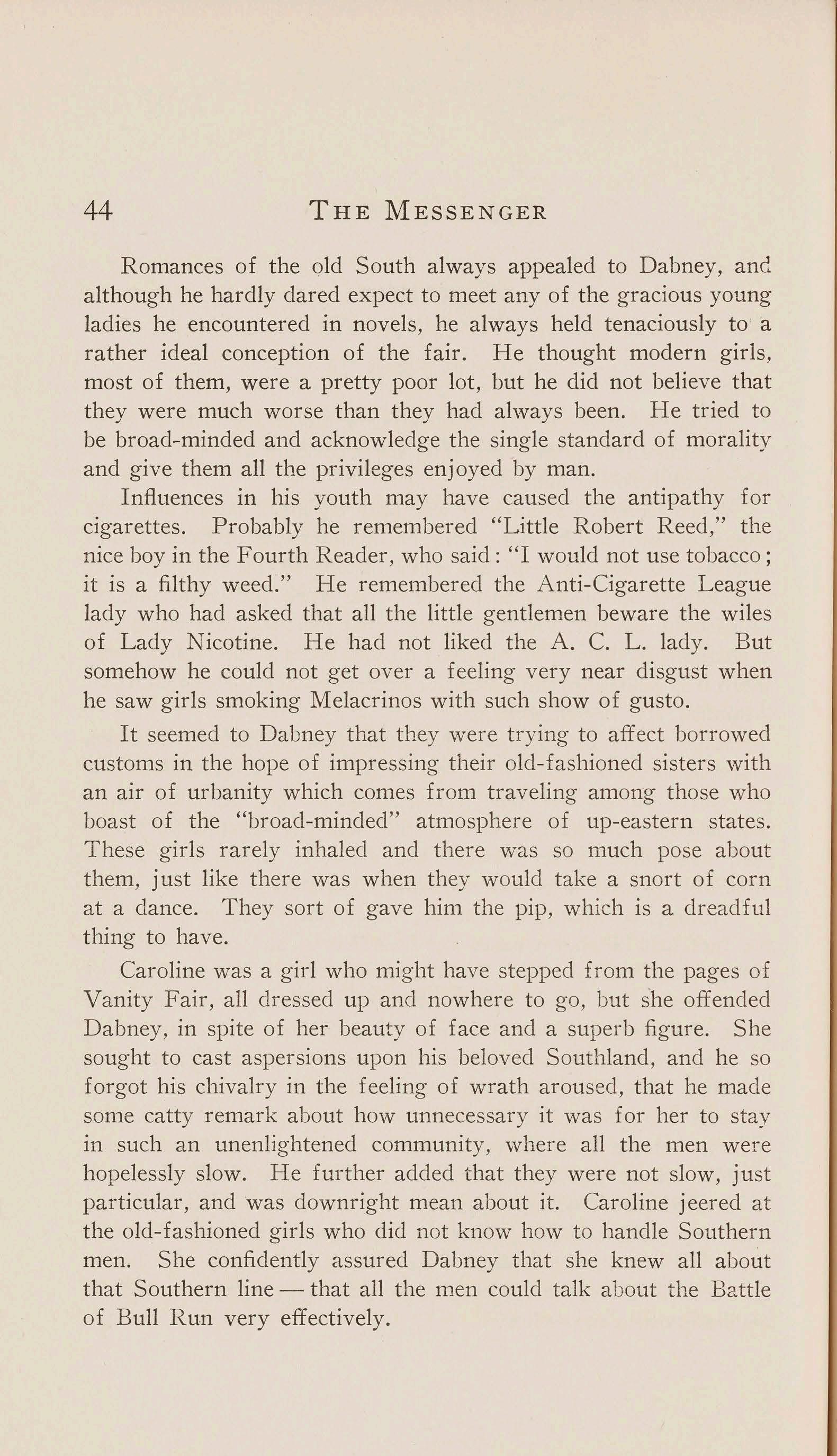
THE MESSENGER
Romances of the old South always appealed to Dabney, and although he hardly dared expect to meet any of the gracious young ladies he encountered in novels, he always held tenaciously to a rather ideal conception of the fair. He thought modern girls, most of them, were a pretty poor lot, but he did not believe that they were much worse than they had always been. He tried to be broad-minded and acknowledge the single standard of morality and give them all the privileges enjoyed by man.
Influences in his youth may have caused the antipathy for cigarettes. Probably he remembered "Little Robert Reed," the nice boy in the Fourth Reader, who said: "I would not use tobacco; it is a filthy weed." He remembered the Anti-Cigarette League lady who had asked that all the little gentlemen beware the wiles of Lady Nicotine. He had not liked the A. C. L. lady. But somehow he could not get over a feeling very near disgust when he saw girls smoking Melacrinos with such show of gusto. It seemed to Dabney that they we r e trying to affect borrowed customs in the hope of impressing their old-fashioned sisters with an air of urbanity which comes from traveling among those who boast of the "broad-minded" atmosphere of up-eastern states. These girls rarely inhaled and there was so much pose about them, just like there was when they would take a snort of corn at a dance. They sort of gave him the pip, wh ich is a dreadful thing to have.
Caroline was a girl who might have stepped from the pages of Vanity Fair, all dressed up and nowhere to go, but s·he offended Dabney, in spite of her beauty of face and a superb figure. She sought to cast aspersions upon his beloved Southland, and he so forgot his chivalry in the feeling of wrath arou sed, that he made some catty remark about how unnecessary it was for her to sta y in such an unenlightened community, where all the men were hopelessly slow. He further added that they were not slow, just particular, and was downright mean about it. Caroline jeered at the old - fashioned girls who did not know how to handle Southern men. She confidently assured Dabney that she knew all about that Southern line - that all the men could talk a b out the Battle of Bull Run very effectively.
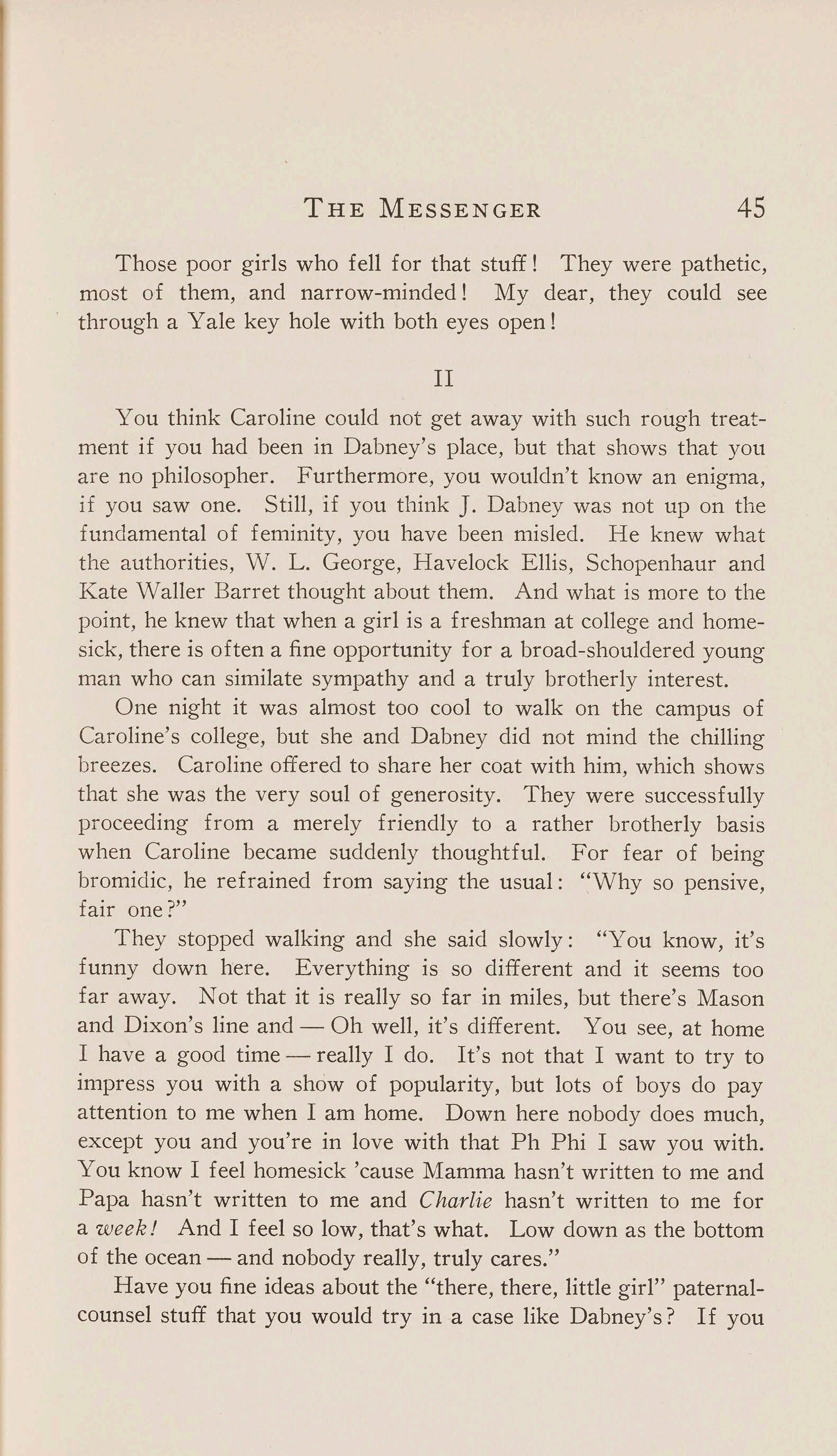
Those poor girls who fell for that stuff! They were pathetic, most of them, and narrow-minded! My dear, they could see through a Yale key hole with both eyes open!
II
You think Caroline could not get away with such rough treatment if you had been in Dabney's place, but that shows that you a r e no philosopher. Furthermore, you wouldn't know an enigma, if you saw one. Still, if you think J. Dabney was not up on the fundamental of feminity, you have been misled. He knew what the authorities, W. L. George, Havelock Ellis, Schopenhaur and Kate Waller Barret thought about them. And what is more to the point, he knew that when a girl is a freshman at college and homesick, there is often a fine opportunity for a broad-shouldered young man who can similate sympathy and a truly brotherly interest.
One night it was almost too cool to walk on the campus of Caroline's college, but she and Dabney did not mind the chilling breezes. Caroline offered to share her coat with him, which shows that she was the very soul of generosity. They were successfully proceeding from a merely friendly to a rather brotherly basis when Caroline became suddenly thoughtful. For fear of being bromidic, he refrained from saying the usual: "Why so pensive, fair one?"
They stopped walking and she said slowly: "You know, it's funny down here. Everything is so different and it seems too far away. Not that it is really so far in miles, but there's Mason and Dixon's line and -Oh well, it's different. You see, at home I have a good time-really I do. It's not that I want to try to impress you with a show of popularity, but lots of boys do pay attention to me when I am home. Down here nobody does much, except you and you're in love with that Ph Phi I saw you with. You know I feel homesick 'cause Mamma hasn't written to me and Papa hasn't written to me and Charlie hasn't written to me for a week I And I feel so low, that's what. Low down as the bottom of the ocean -and nobody really, truly cares."
Have you fine ideas about the "there, there, little girl" paternalcounsel stuff that you would try in a case like Dabney's? If you
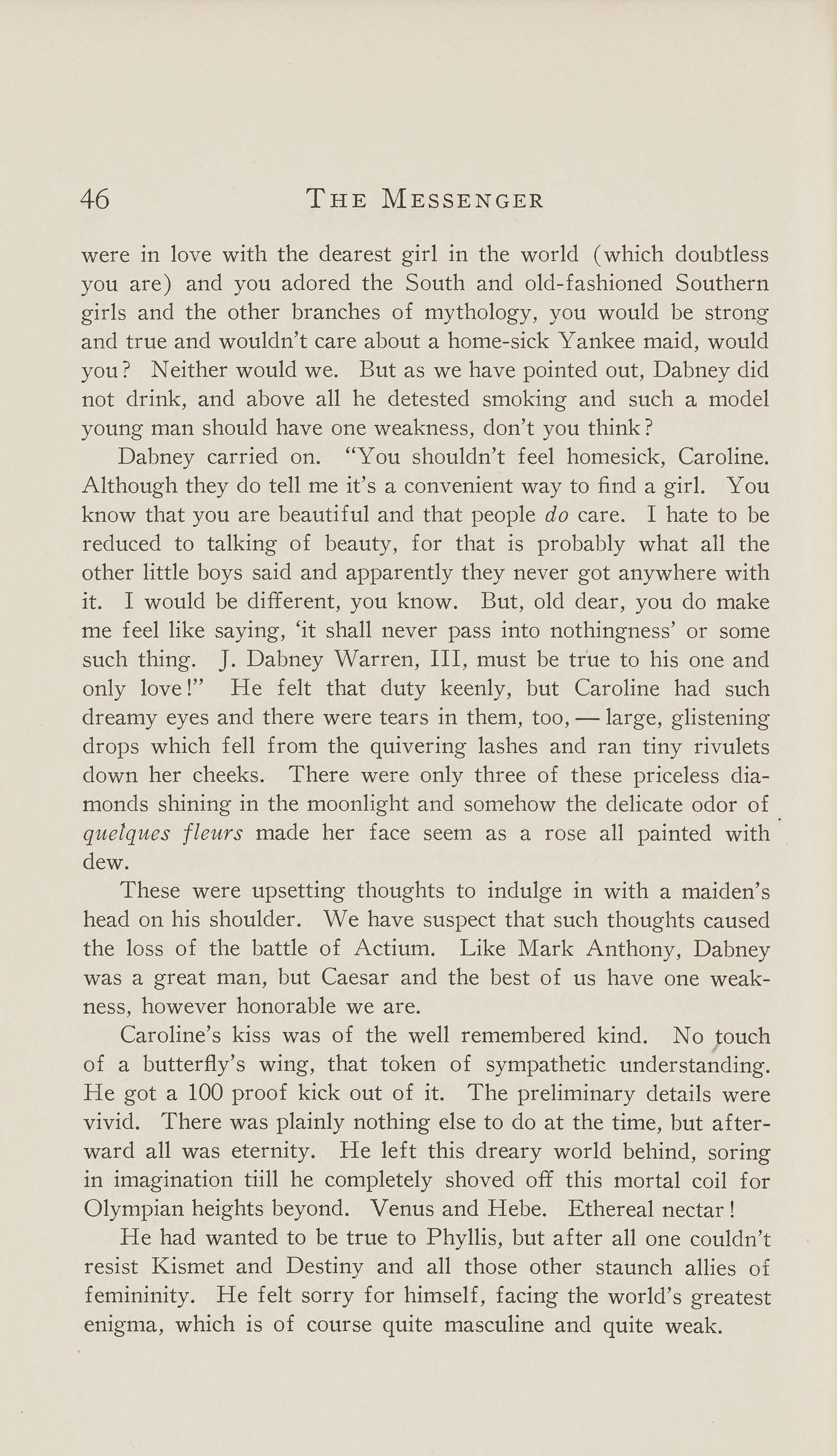
MESSENGER
were in love with the dearest girl in the world ( which doubtless you are) and you adored the South and old-fashioned Southern girls and the other branches of mythology, you would be strong and true and wouldn't care about a home-sick Yankee maid, would you? Neither would we. But as we have pointed out, Dabney did not drink, and above all he detested smoking and such a model young man should have one weakness, don't you think?
Dabney carried on. "You shouldn't feel homesick, Caroline. Although they do tell me it's a convenient way to find a girl. You know that you are beautiful and that people do care. I hate to be reduced to talking of beauty, for that is probably what all the other little boys said and apparently they never got anywhere with it. I would be different, you know. But, old dear, you do make me feel like saying, 'it shall never pass into nothingness' or some such thing. J. Dabney Warren, III, must be tr 'ue to his one and only love!" He felt that duty keenly, but Caroline had such dreamy eyes and there were tears in them, too, -large, glistening drops which fell from the quivering lashes and ran tiny rivulets down her cheeks. There were only three of these priceless diamonds shining in the moonlight and somehow the delicate odor of quelques fleurs made her face seem as a rose all painted with dew.
These were upsetting thoughts to indulge in with a maiden's head on his shoulder. We have suspect that such thoughts caused the loss of the battle of Actium. Like Mark Anthony, Dabney was a great man, but Caesar and the best of us have one weakness, however honorable we are.
Caroline's kiss was of the well remembered kind. No touch of a butterfly's wing, that token of sympathetic understanding. He got a 100 proof kick out of it. The preliminary details were vivid. There was plainly nothing else to do at the time, but afterward all was eternity. He left this dreary world behind, soring in imagination tiill he completely shoved off this mortal coil for Olympian heights beyond. Venus and Hebe. Ethereal nectar! He had wanted to be true to Phyllis, but after all one couldn't resist Kismet and Destiny and all those other staunch allies of femininity. He felt sorry for himself, facing the world's greatest enigma, which is of course quite masculine and quite weak.
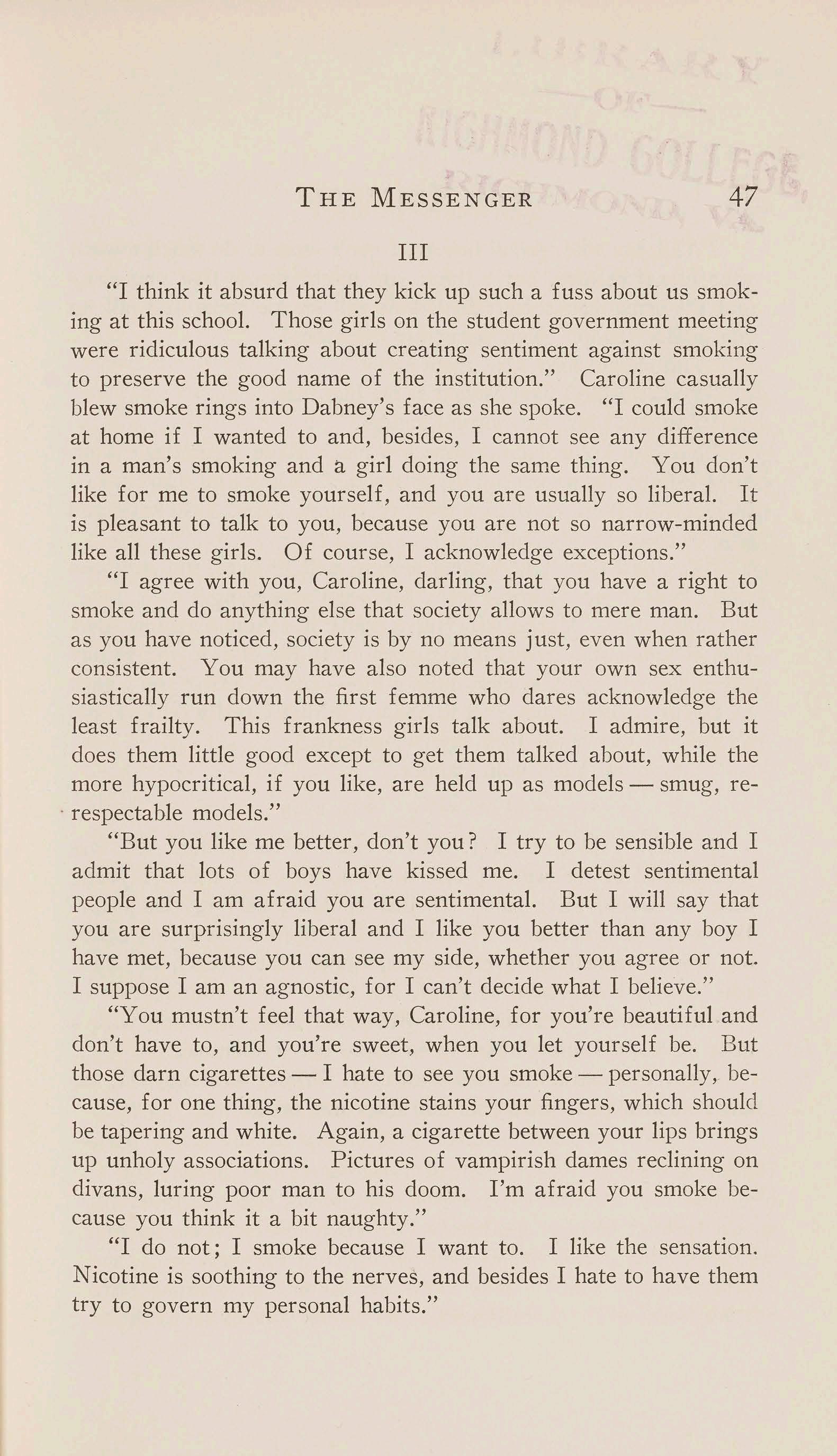
"I think it absurd that they kick up such a fuss about us smoking at this school. Those girls on the student government meeting were ridiculous talking about creating sentiment against smoking to preserve the good name of the institution." Caroline casually blew smoke rings into Dabney's face as she spoke. "I could smoke at home if I wanted to and, besides, I cannot see any difference in a man's smoking and a girl doing the same thing. You don't like for me to smoke yourself, and you are usually so liberal. It is pleasant to talk to you, because you are not so narrow-minded like all these girls. Of course, I acknowledge exceptions."
"I agree with you, Caroline, darling, that you have a right to smoke and do anything else that society allows to mere man. But as you have noticed, society is by no means just, even when rather consistent. You may have also noted that your own sex enthusiastically run down the first femme who dares acknowledge the least frailty. This frankness girls talk about. I admire, but it does them little good except to get them talked about, while the more hypocritical, if you like, are held up as models - smug, re. respectable models."
"But you like me better, don't you? I try to be sensible and I admit that lots of boys have kissed me. I detest sentimental people and I am afraid you are sentimental. But I will say that you are surprisingly liberal and I like you better than any boy I have met, because you can see my side, whether you agree or not. I suppose I am an agnostic, for I can't decide what I believe."
"You mustn't feel that way, Caroline, for you're beautiful and don't have to, and you're sweet, when you let yourself be. But those darn cigarettes - I hate to see you smoke - personally, because, for one thing, the nicotine stains your fingers, which should be tapering and white. Again, a cigarette between your lips brings up unholy associations. Pictures of vampirish dames reclining on divans, luring poor man to his doom. I'm afraid you smoke because you think it a bit naughty."
"I do not; I smoke because I want to. I like the sensation. Nicotine is soothing to the nerves, and besides I hate to have them try to govern my personal habits."
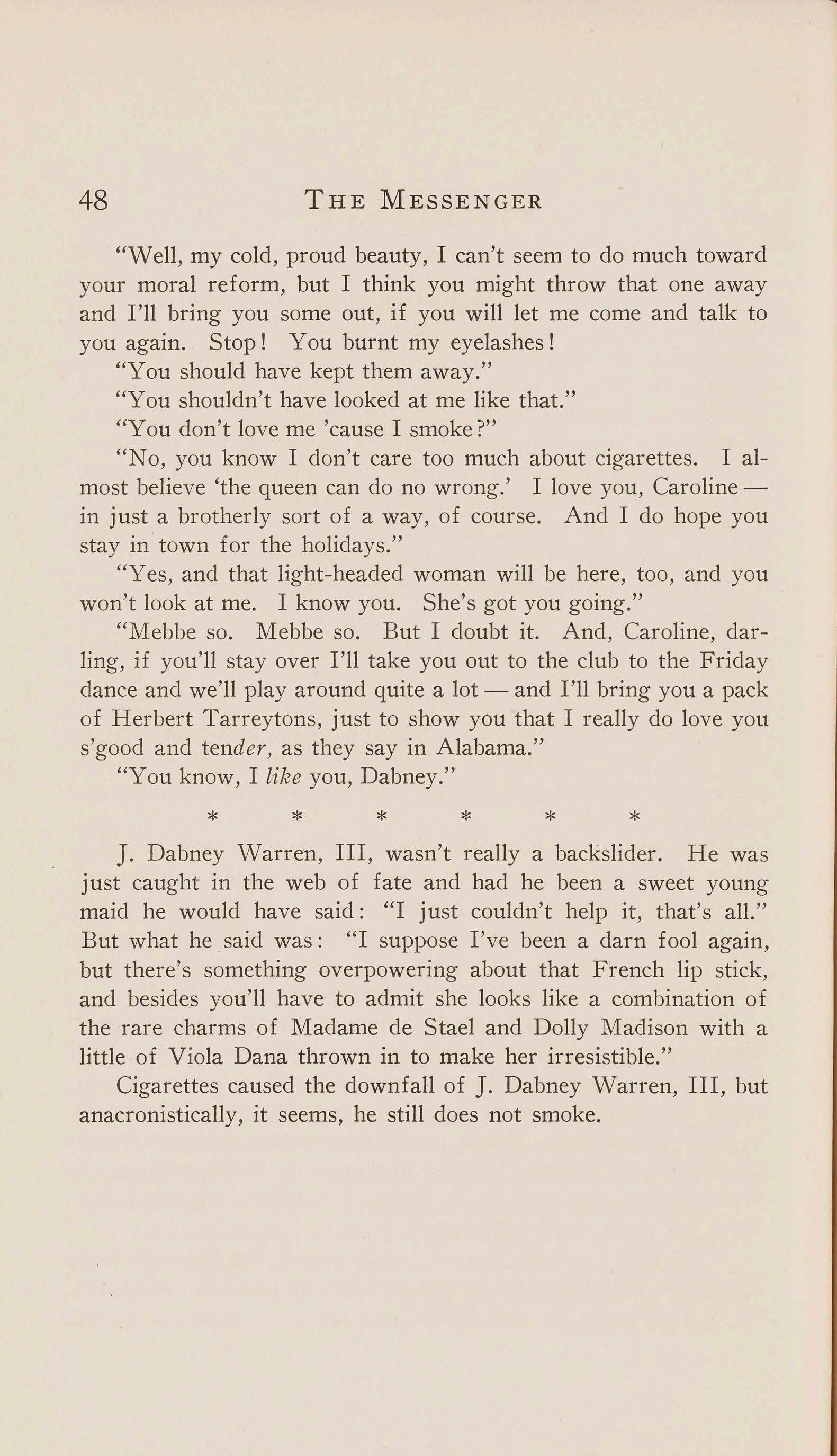
"Well, my cold, proud beauty, I can't seem to do much toward your moral reform, but I think you might throw that one away and I'll bring you some out, if you will let me come and talk to you again. Stop ! You burnt my eyelashes !
"You should have kept them away."
"You shouldn't have looked at me like that."
"You don't love me 'cause I smoke?"
"No, you know I don't care too much about cigarettes. I almost believe 'the queen can do no wrong.' I love you, Carolinein just a brotherly sort of a way, of course. And I do hope you stay in town for the holidays.''
"Yes, and that light-headed woman will be here, too, and you won't look at me. I know you. She's got you going.''
"Mebbe so. Mebbe so. But I doubt it. And, Caroline, darling, if you'll stay over I'll take you out to the club to the Friday dance and we'll play around quite a lot -and I'll bring you a pack of Herbert Tarreytons, just to show you that I really do love you s'good and tender, as they say in Alabama."
"You know, I like you, Dabney."
J. Dabney Warren, III, wasn't really a backslider. He was just caught in the web of fate and had he been a sweet young maid he would have said: "I just couldn't help it, that's all.'' But what he said was: "I suppose I've been a darn fool again, but there's something overpowering about that French lip stick, and besides you'll have to admit she looks like a combination of the rare charms of Madame de Stael and Dolly Madison with a little of Viola Dana thrown in to make her irresistible."
Cigarettes caused the downfall of J. Dabney Warren, III, but anacronistically, it seems, he still does not smoke.
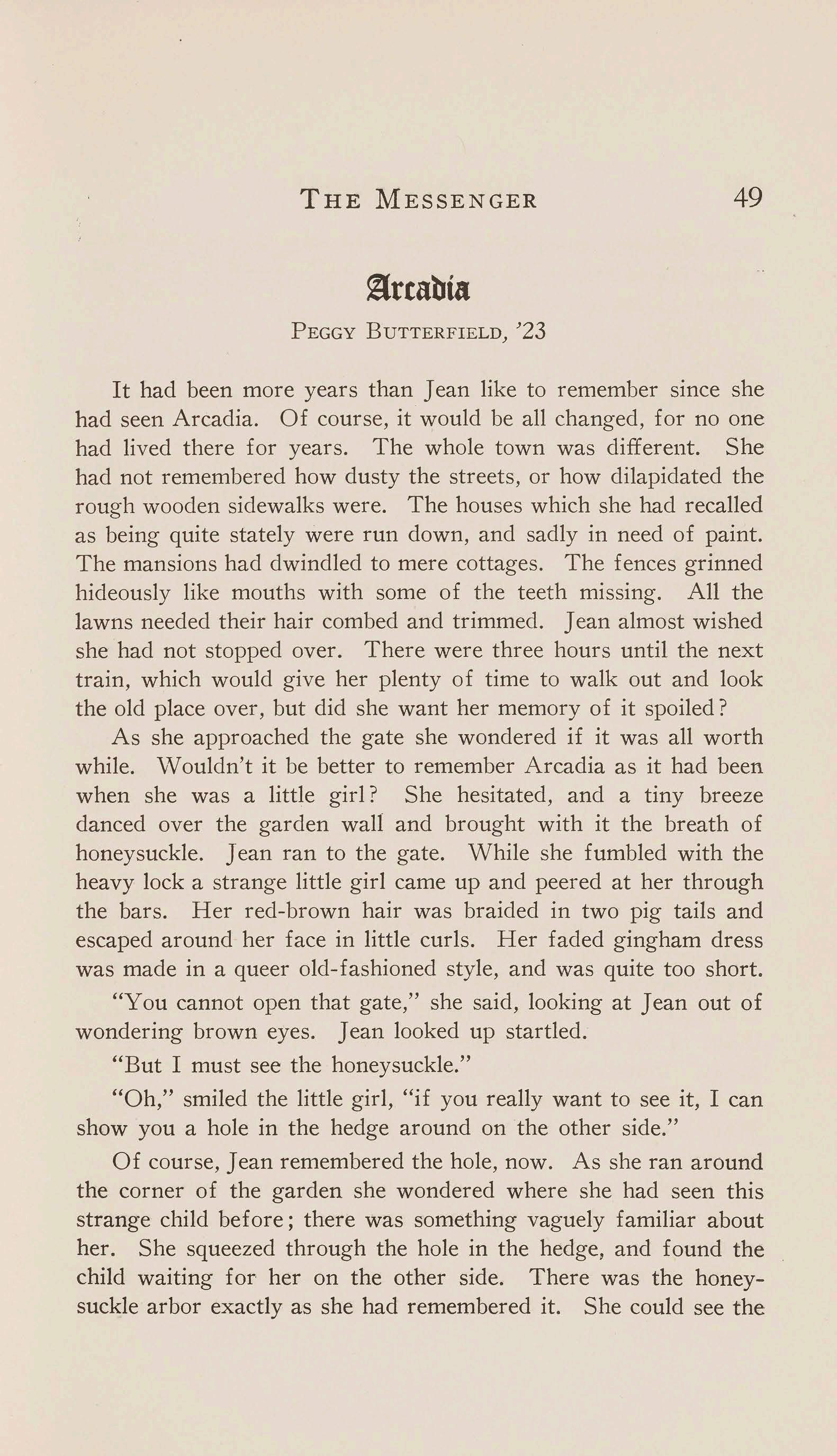
~rcabia
PEGGY BUTTERFIELD, '23
It had been more years than Jean like to remember since she had seen Arcadia. Of course, it would be all changed, for no one had lived there for years. The whole town was different. She had not remembered how dusty the streets, or how dilapidated the rough wooden sidewalks were. The houses which she had recalled as being quite stately were run down, and sadly in need of paint. The mansions had dwindled to mere cottages. The fences grinned hideously like mouths with some of the teeth missing. All the lawns needed their hair combed and trimmed. Jean almost wished she had not stopped over. There were three hours until the next train, which would give her plenty of time to walk out and look the old place over, but did she want her memory of it spoiled?
As she approached the gate she wondered if it was all worth while. ·wouldn't it be better to remember Arcadia as it had been when she was a little girl? She hesitated, and a tiny breeze danced over the garden wall and brought with it the breath of honeysuckle. Jean ran to the gate. While she fumbled with the heavy lock a strange little girl came up and peered at her through the bars. Her red-brown hair was braided in two pig tails and escaped around her face in little curls. Her faded gingham dress was made in a queer old-fashioned style, and was quite too short.
"You cannot open that gate," she said, looking at Jean out of wondering brown eyes. Jean looked up startled.
"But I must see the honeysuckle."
"Oh," smiled the little girl, "if you really want to see it, I can show you a hole in the hedge around on the other side."
Of course, Jean remembered the hole, now. As she ran around the corner of the garden she wondered where she had seen this strange child before; there was something vaguely familiar about her. She squeezed through the hole in the hedge, and found the child waiting for her on the other side. There was the honeysuckle arbor exactly as she had remembered it. She could see the
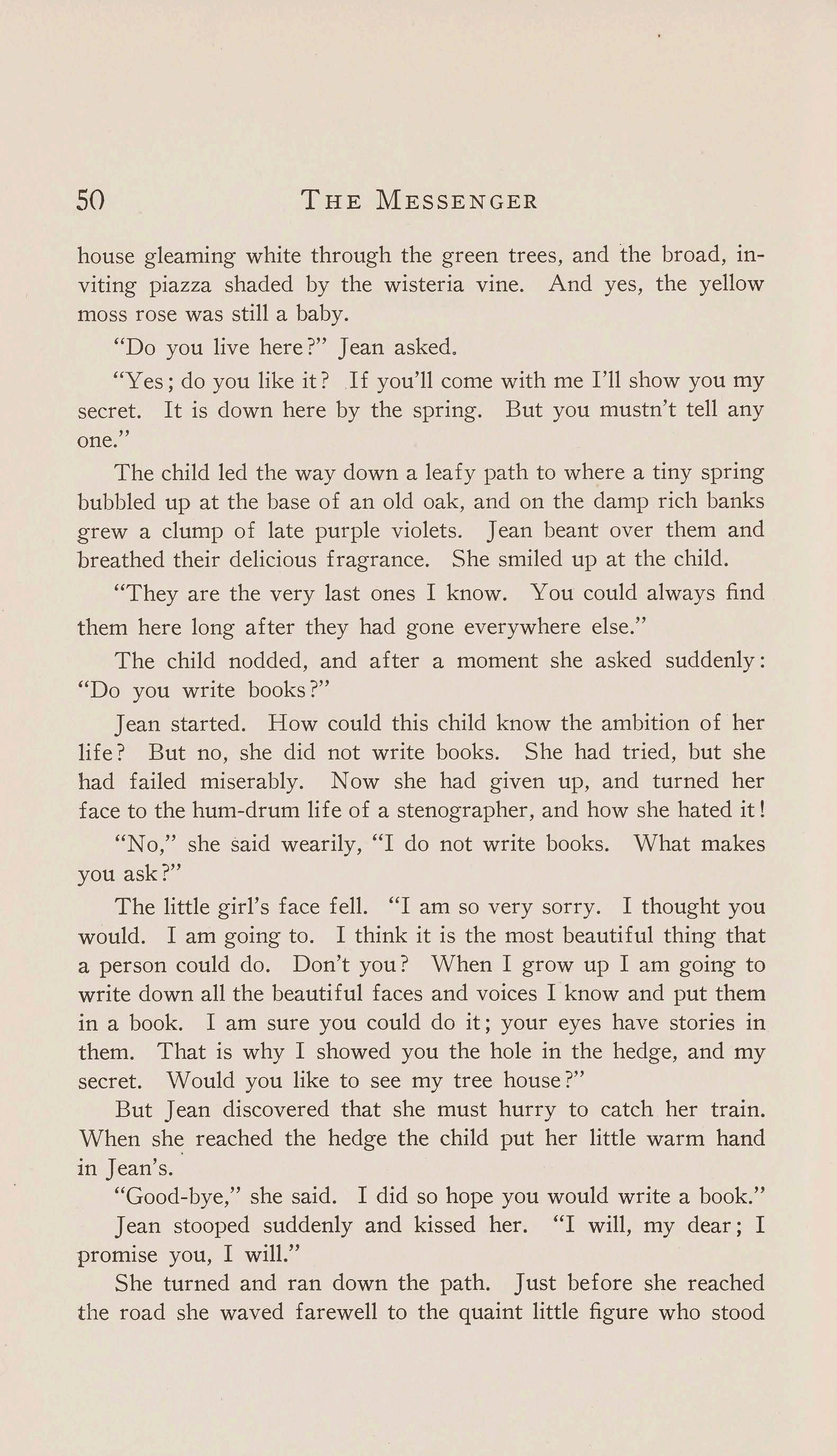
50 THE MESSENGER
house gleaming white through the green trees, and the broad, inviting piazza shaded by the wisteria vine. And yes, the yellow moss rose was still a baby.
"Do you live here?" Jean asked.
"Yes; do you like it? .If you'll come with me I'll show you my secret. It is down here by the spring. But you mustn't tell any one."
The child led the way down a leafy path to where a tiny spring bubbled up at the base of an old oak, and on the damp rich banks grew a clump of late purple violets. Jean beant over them and breathed their delicious fragrance. She smiled up at the child.
"They are the very last ones I know. You could always find them here long after they had gone everywhere else."
The child nodded, and after a moment she asked suddenly: "Do you write books?"
Jean started. How could this child know the ambition of her life? But no, she did not write books. She had tried, but she had failed miserably . Now she had given up, and turned her face to the hum-drum life of a stenographer, and how she hated it!
"No," she said wearily, "I do not write books. What makes you ask?"
The little girl's face fell. "I am so very sorry. I thought you would. I am going to. I think it is the most beautiful thing that a person could do. Don't you? When I grow up I am going to write down all the beautiful faces and voices I know and put them in a book. I am sure you could do it; your eyes have stories in them. That is why I showed you the hole in the hedge, and my secret. Vvould you like to see my tree house ?"
But Jean discovered that she must hurry to catch her train. When she reached the hedge the child put her little warm hand in Jean's.
"Good-bye," she said. I did so hope you would write a book."
Jean stooped suddenly and kissed her. "I will, my dear; I promise you, I will."
She turned and ran down the path. Just before she reached the road she waved farewell to the quaint little figure who stood
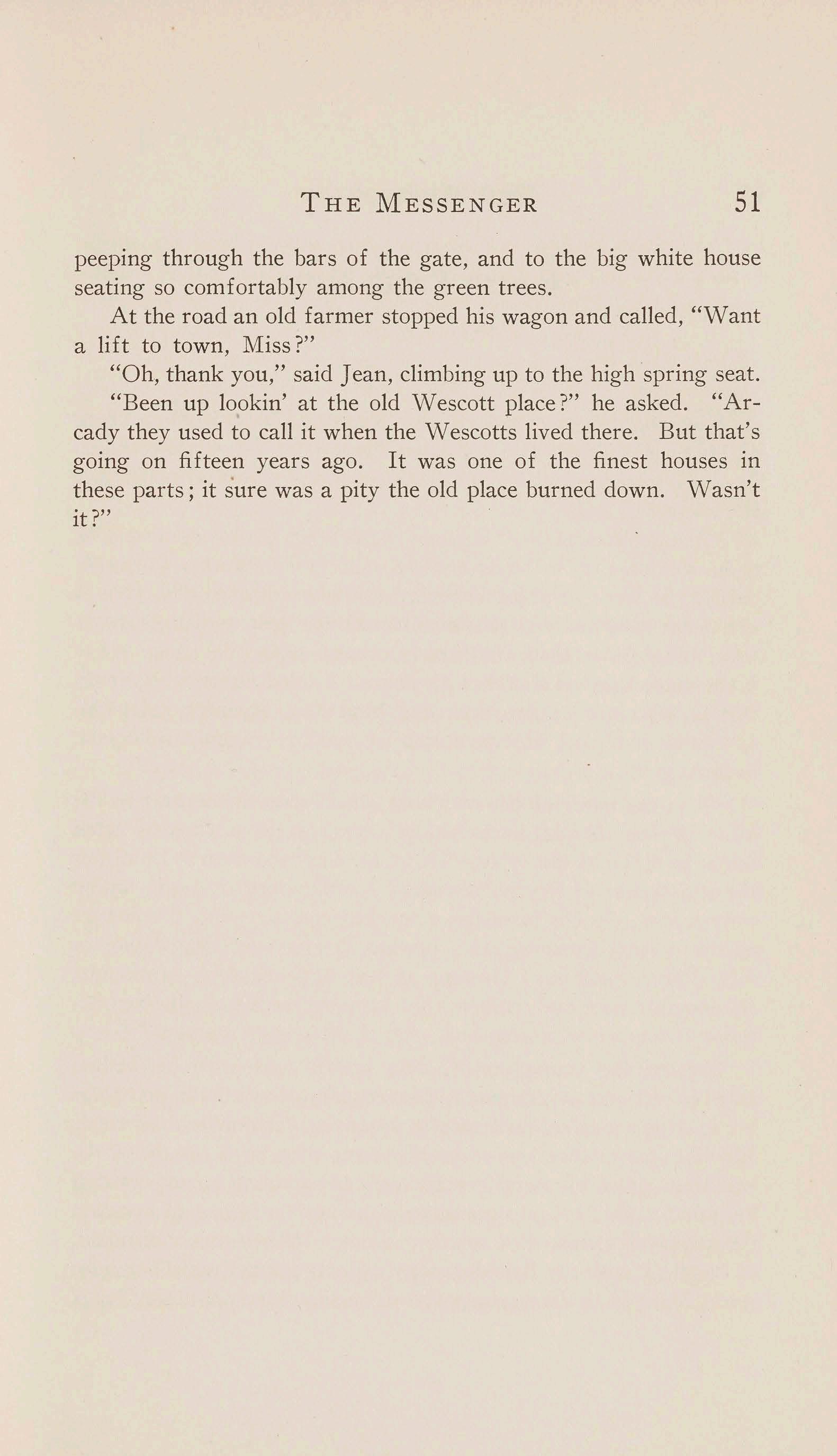
peeping through the bars of the gate, and to the big white house seating so comfortably among the green trees.
At the road an old farmer stopped his wagon and called, "Want a lift to town, Miss?"
"Oh, thank you," said Jean, climbing up to the high spring seat.
"Been up lookin' at the old vVescott place?" he asked. "Arcady they used to call it when the Wescotts lived there. But that's going on fifteen years ago. It was one of the finest houses in these parts; it sure was a pity the old place burned down. Wasn't it?"
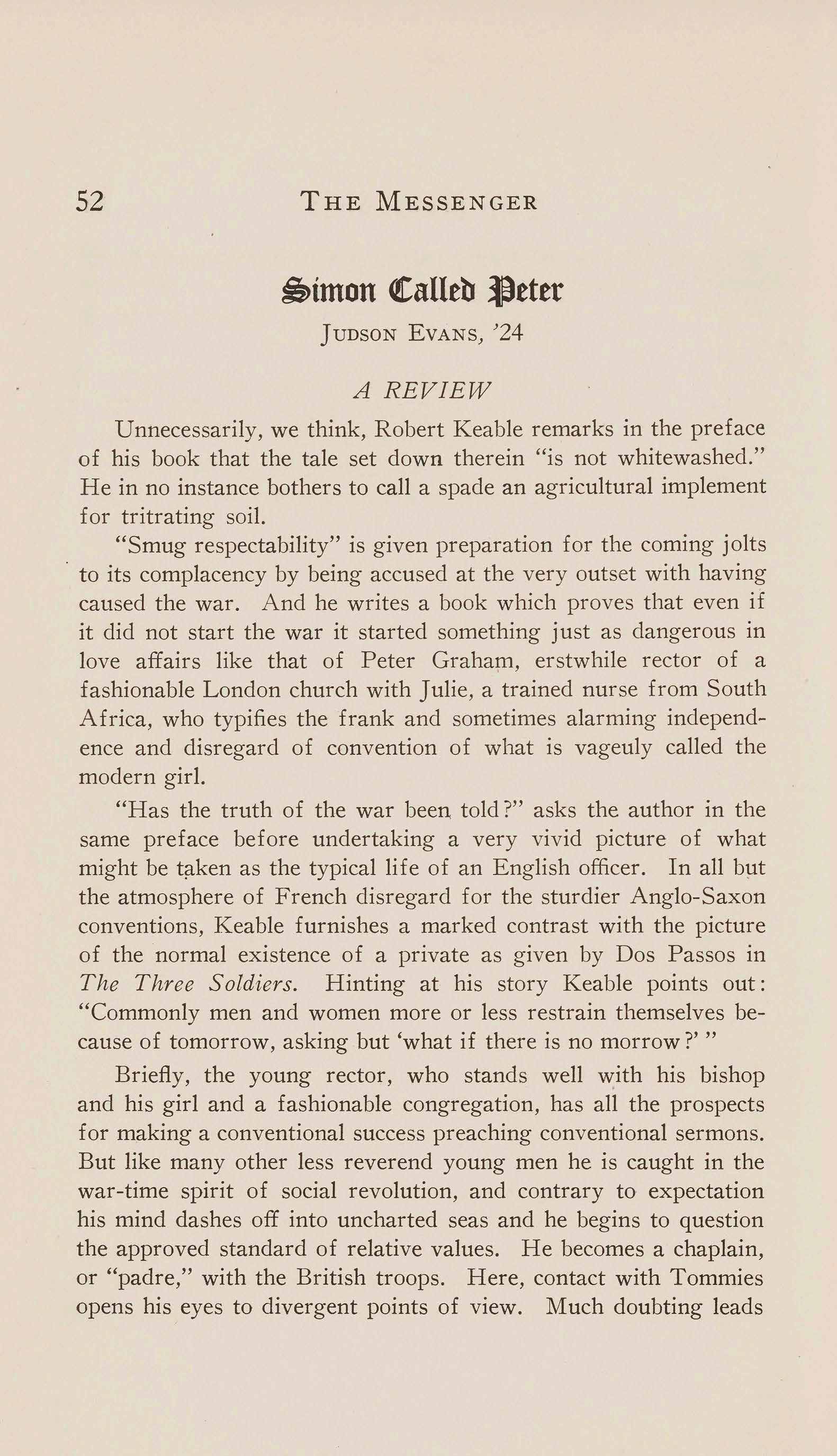
~imon <!Calltbl}tttr
JUDSON EVANS, '24
A REVIEW
Unnecessarily, we think, Robert Keable remarks in the preface of his book that the tale set down therein "is not whitewashed." He in no instance bothers to call a spade an agricultural implement for tritrating soil.
"Smug respectability" is given preparation for the coming jolts · to its complacency by being accused at the very outset with having caused the war. And he writes a book which proves that even if it did not start the war it started something just as dangerous in love affairs like that of Peter Graham, erstwhile rector of a fashionable London church with Julie, a trained nurse from South Africa, who typifies the frank and sometimes alarming independence and disregard of convention of what is vageuly called the modern girl.
"Has the truth of the war been told?" asks the author in the same preface before undertaking a very vivid picture of what might be t;:tken as the typical life of an English officer. In all bµt the atmosphere of French disregard for the sturdier Anglo-Saxon conventions, Keable furnishes a marked contrast with the picture of the normal existence of a private as given by Dos Passos in The Three Soldiers. Hinting at his story Keable points out: "Commonly men and women more or less restrain themselves because of tomorrow, asking but 'what if there is no morrow?'"
Briefly, the young rector, who stands well w:ith his bishop and his girl and a fashionable congregation, has all the prospects for making a conventional success preaching conventional sermons. But like many other less reverend young men he is caught in the war-time spirit of social revolution, and contrary to expectation his mind dashes off into uncharted seas and he begins to question the approved standard of relative values. He becomes a chaplain, or "padre," with the British troops. Here, contact with Tommies opens his eyes to divergent points of view. Much doubting leads
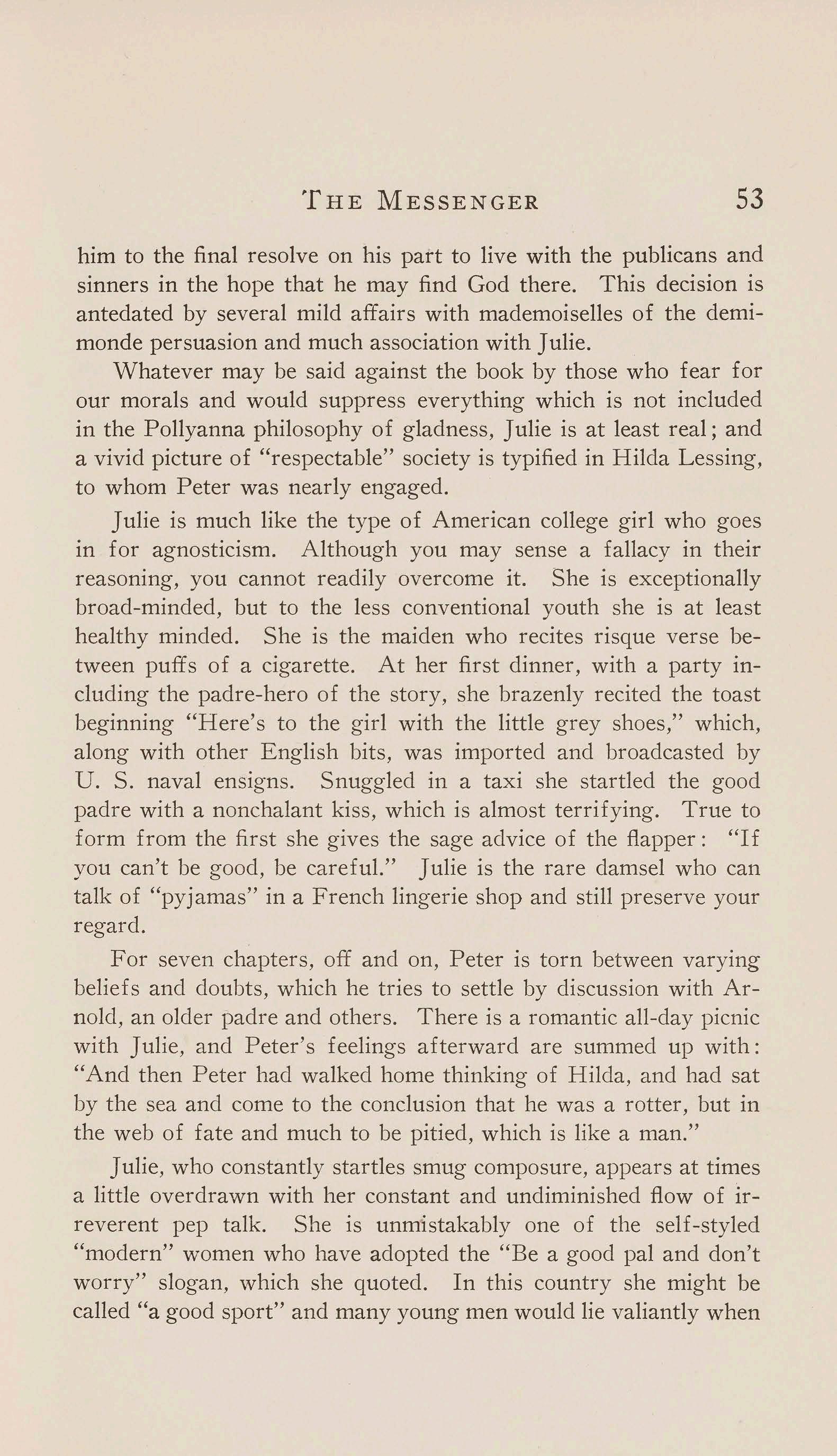
him to the final resolve on his part to live with the publicans and sinners in the hope that he may find God there. This decision is antedated by several mild affairs with mademoiselles of the demimonde persuasion and much association with Julie.
Whatever may be said against the book by those who fear for our morals and would suppress everything which is not included in the Pollyanna philosophy of gladness, Julie is at least real; and a vivid picture of "respectable" society is typified in Hilda Lessing, to whom Peter was nearly engaged.
Julie is much like the type of American college girl who goes in for agnosticism. Although you may sense a fallacy in their reasoning, you cannot readily overcome it. She is exceptionally broad-minded, but to the less conventional youth she is at least healthy minded. She is the maiden who recites risque verse between puffs of a cigarette. At her first dinner, with a party including the padre-hero of the story, she brazenly recited the toast beginning "Here's to the girl with the little grey shoes," which, along with other English bits, was imported and broadcasted by U. S. naval ensigns. Snuggled in a taxi she startled the good padre with a nonchalant kiss, which is almost terrifying. True to form from the first she gives the sage advice of the flapper : "If you can't be good, be careful." Julie is the rare damsel who can talk of "pyjamas" in a French lingerie shop and still preserve your regard.
For seven chapters, off and on, Peter is torn between varying beliefs and doubts, which he tries to settle by discussion with Arnold, an older padre and others. There is a romantic all-clay picnic with Julie, and Peter's feelings afterward are summed up with: "And then Peter had walked home thinking of Hilda, and had sat by the sea and come to the conclusion that he was a rotter, but in the web of fate and much to be pitied, which is like a man."
Julie, who constantly startles smug composure, appears at times a little overdrawn with her constant and undiminished flow of irreverent pep talk. She is unmistakably one of the self-styled "modern" women who have adopted the "Be a good pal and don't worry" slogan, which she quoted. In this country she might be called "a good sport" and many young men would lie valiantly when
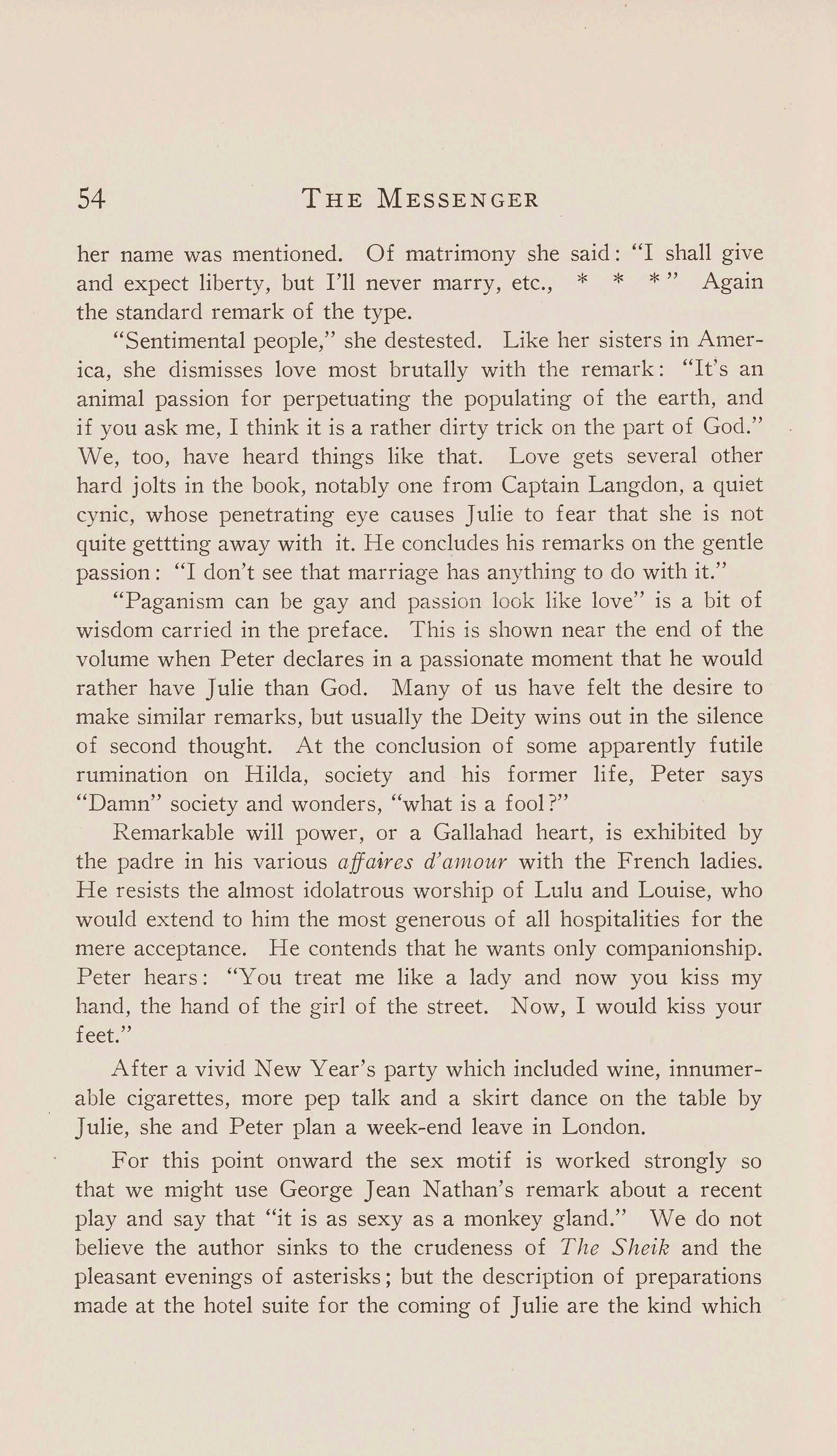
THE MESSENGER
her name was mentioned. Of matrimony she said: "I shall give and expect liberty, but I'll never marry, etc., * * *" Again the standard remark of the type.
"Sentimental people," she destested. Like her sisters in America, she dismisses love most brutally with the remark: "It's an animal passion for perpetuating the populating of the earth , and if you ask me, I think it is a rather dirty trick on the part of God." We, too, have heard things like that. Love gets several other hard jolts in the book, notably one from Captain Langdon, a quiet cynic, whose penetrating eye causes Julie to fear that she is not quite gettting away with it. He concludes his remarks on the gentle passion: "I don ' t see that marriage has anything to do with it."
"Pagani sm can be gay and passi on look like love" is a bit of wisdom carried in the preface. This is shown near the end of the volume when Peter declares in a passionate moment that he would rather have Julie than God. Many of us have felt the desire to make similar remarks, but usually the Deity wins out in the silence of second thought. At the conclusion of some apparently futile rumination on Hilda, society and his former life, Peter says "Damn" society and wonders, "what is a fool?"
Remarkable will power, or a Gallahad heart, is exhibited by the padre in his various afjaires d' am our with the French ladies. He resists the almost idolatrous worship of Lulu and Louise, who would extend to him the most generous of all hospitalities for the mere acceptance. He contends that he wants only companionship. Peter hears: "You treat me like a lady and now you kiss my hand, the hand of the girl of the street. Now, I would kiss your feet."
After a vivid New Year's party which included wine, innumerable cigarettes, more pep talk and a skirt dance on the table by Julie, she and Peter plan a week-end leave in London.
For this point onward the sex motif is worked strongly so that we might use George Jean Nathan's remark about a recent play and say that "it is as sexy as a monkey gland." We do not b elieve the author sinks to the crudeness of The Sheik and the pleasant evenings of asterisks; but the description of preparations made at the hotel suite for the coming of Julie are the kind which
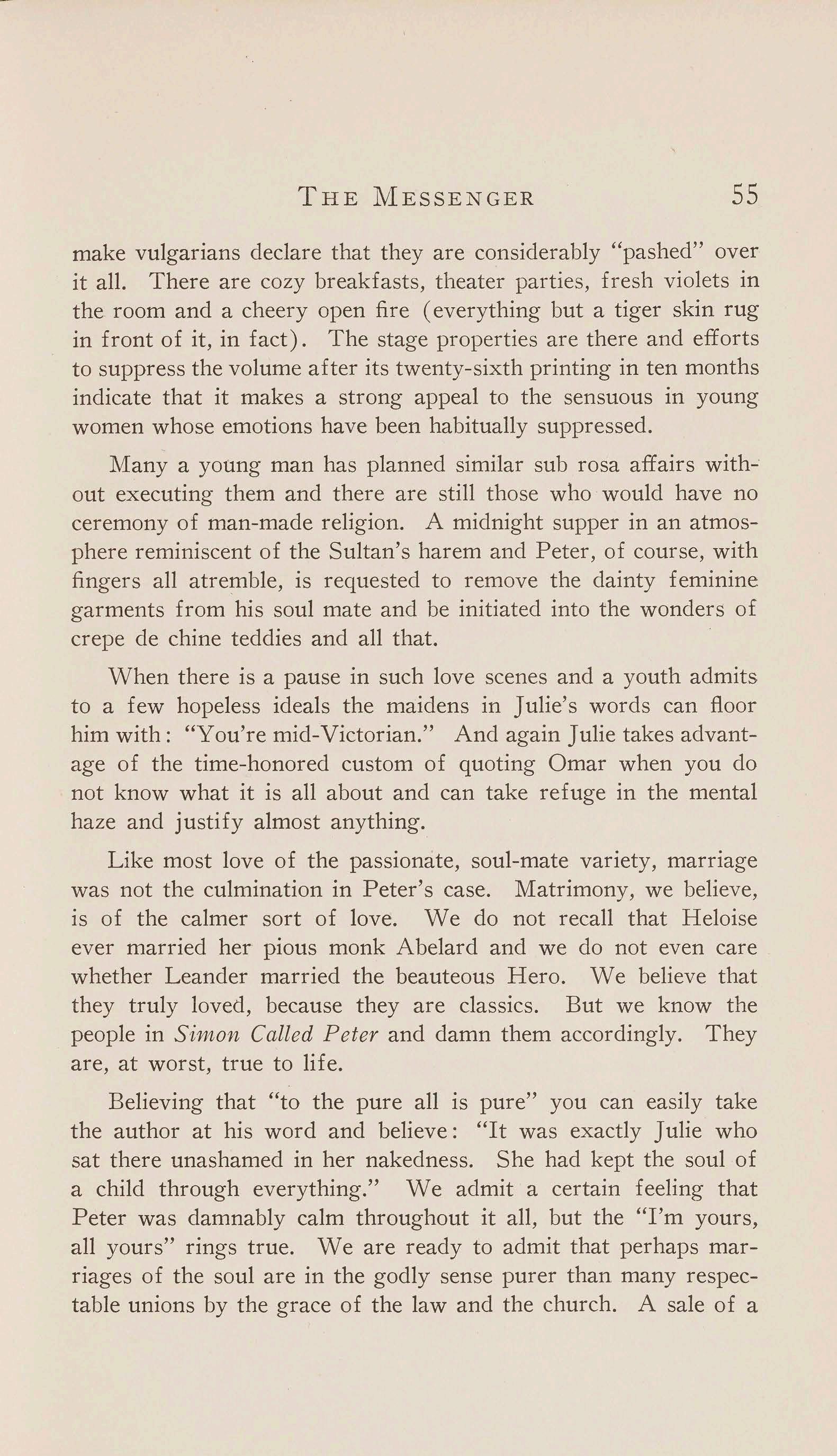
make vulgarians declare that they are considerably "pashed" over it all. There are cozy breakfasts, theater parties, fresh violets in the room and a cheery open fire ( everything but a tiger skin rug in front of it, in fact). The stage properties are there and efforts to suppress the volume after its twenty-sixth printing in ten months indicate that it makes a strong appeal to the sensuous in young women whose emotions have been habitually suppressed.
Many a young man has planned similar sub rosa affairs without executing them and there are still those who would have no ceremony of man-made religion. A midnight supper in an atmosphere reminiscent of the Sultan's harem and Peter, of course, with fingers all a tremble, is requested to remove the dainty feminine garments from his soul mate and be initiated into the wonders of crepe de chine teddies and all that.
When there is a pause in such love scenes and a youth admits to a few hopeless ideals the maidens in Julie's words can floor him with: "You're mid-Victorian." And again Julie takes advantage of the time-honored custom of quoting Omar when you do not know what it is all about and can take refuge in the mental haze and justify almost anything.
Like most love of the passionate, soul-mate variety, marriage was not the culmination in Peter's case. Matrimony, we believe, is of the calmer sort of love. We do not recall that Heloise ever married her pious monk Abelard and we do not even care whether Leander married the beauteous Hero. We believe that they truly loved, because they are classics. But we know the people in Simon Called Peter and damn them accordingly. They are, at worst, true to life.
Believing that "to the pure all is pure" you can easily take the author at his word and believe: "It was exactly Julie who sat there unashamed in her nakedness. She had kept the soul of a child through everything." We admit a certain feeling that Peter was damnably calm throughout it all, but the "I'm yours, all yours" rings true. We are ready to admit that perhaps marriages of the soul are in the godly sense purer than many respectable unions by the grace of the law and the church. A sale of a
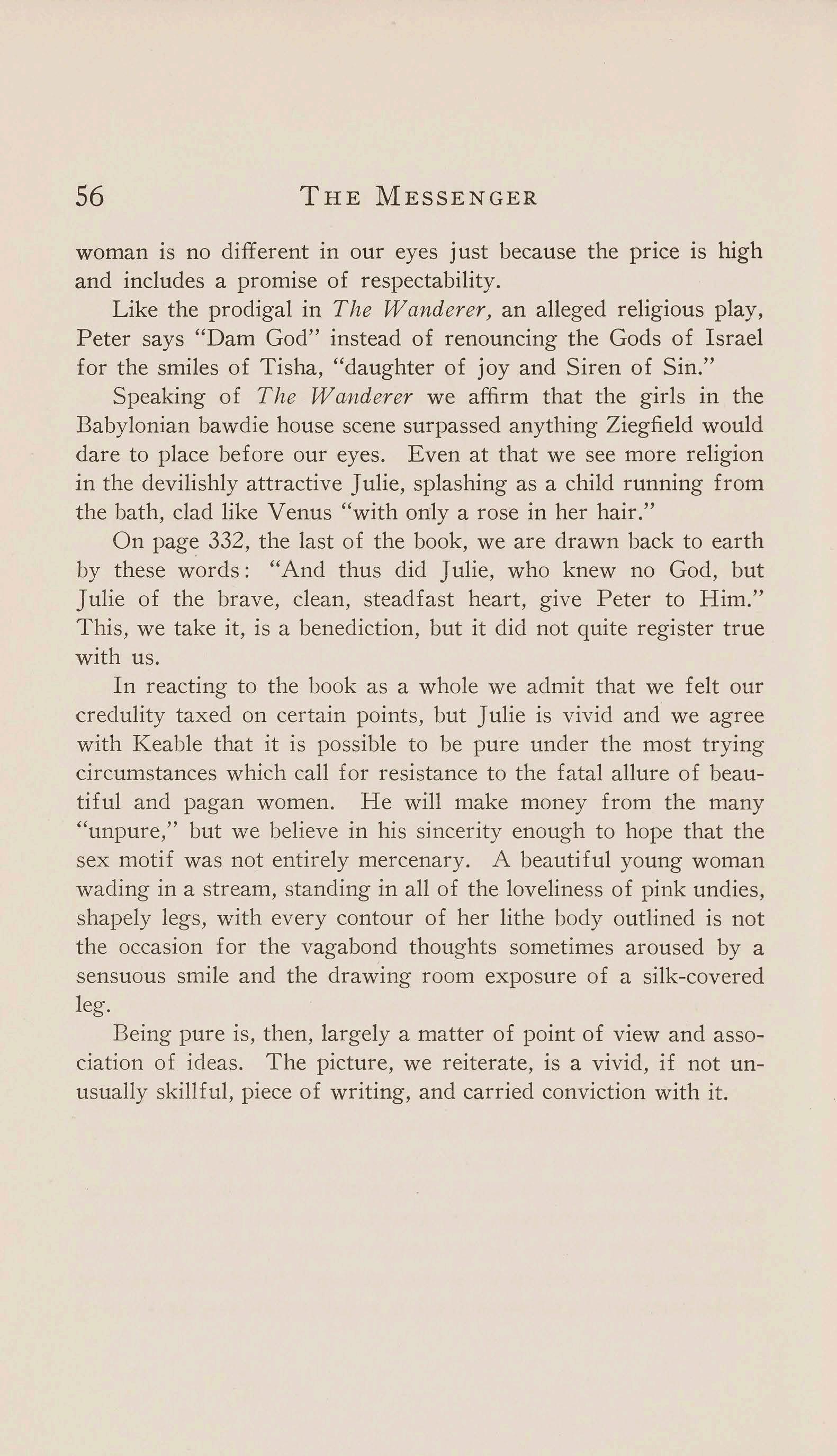
THE MESSENGER
woman is no different in our eyes just because the price is high and includes a promise of respectability.
Like the prodigal in The Wanderer, an alleged religious play, Peter says "Dam God" instead of renouncing the Gods of Israel for the smiles of Tisha, "daughter of joy and Siren of Sin."
Speaking of The Wanderer we affirm that the girls in the Babylonian bawdie house scene surpassed anything Ziegfield would dare to place before our eyes. Even at that we see more religion in the devilishly attractive Julie, splashing as a child running from the bath, clad like Venus "with only a rose in her hair."
On page 332, the last of the book, we are drawn back to earth by these words: "And thus did Julie, who knew no God, but Julie of the brave, clean, steadfast heart, give Peter to Him." This, we take it, is a benediction, but it did not quite register true with us.
In reacting to the book as a whole we admit that we felt our credulity taxed on certain points, but Julie is vivid and we agree with Keable that it is possible to be pure under the most trying circumstances which call for resistance to the fatal allure of beautiful and pagan women. He will make money from the many "unpure," but we believe in his sincerity enough to hope that the sex motif was not entirely mercenary. A beautiful young woman wading in a stream, standing in all of the loveliness of pink undies, shapely legs, with every contour of her lithe body outlined is not the occasion for the vagabond thoughts sometimes aroused by a sensuous smile and the drawing room exposure of a silk-covered leg.
Being pure is, then , largely a matter of point of view and association of ideas. The picture, we reiterate, is a vivid, if not unusually skillful, piece of writing, and carried conviction with it.
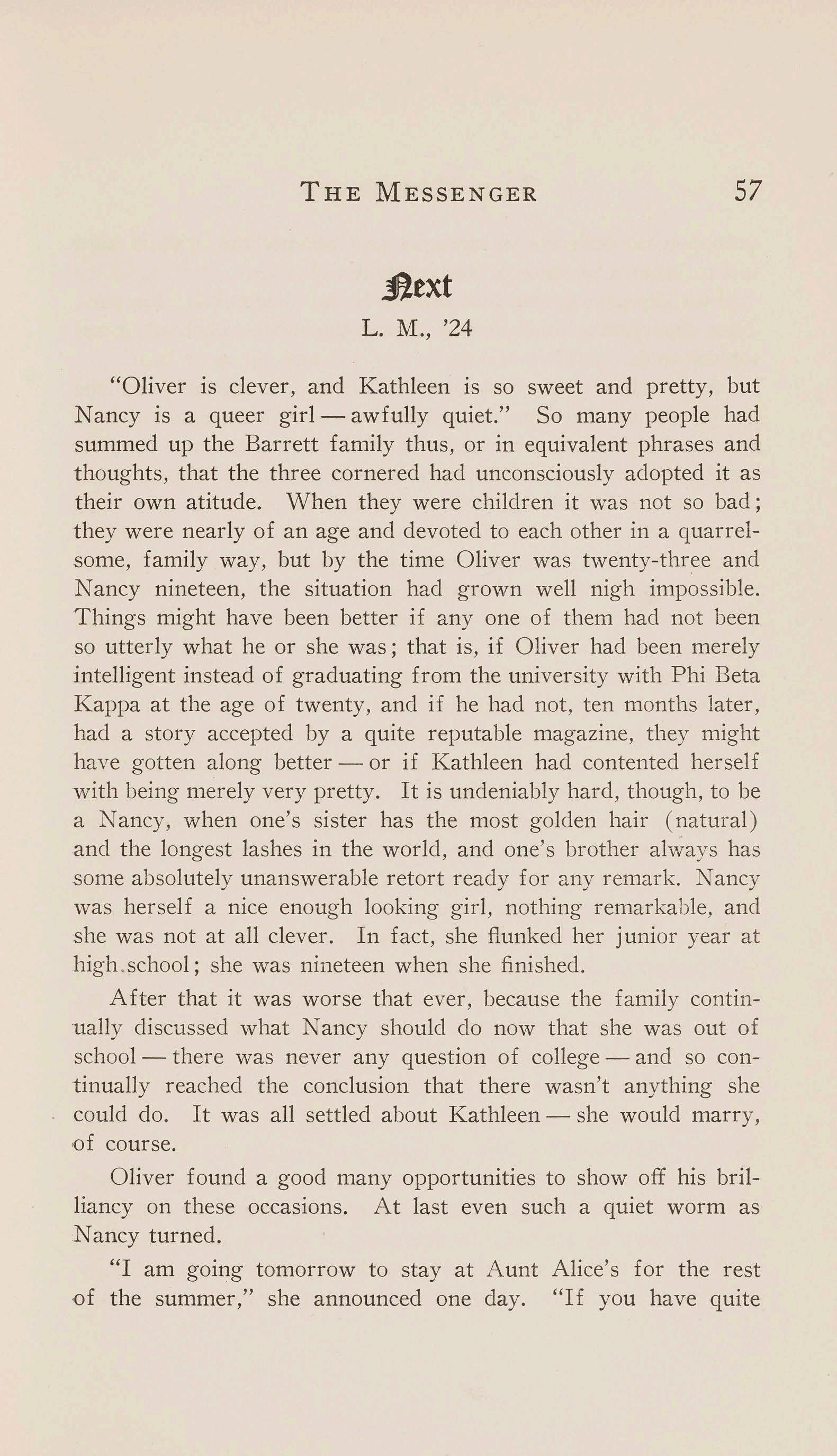
L. M., '24
"Oliver is clever, and Kathleen is so sweet and pretty, but Nancy is a queer girl - awfully quiet." So many people had summed up the Barrett family thus, or in equivalent phrases and thoughts, that the three cornered had unconsciously adopted it as their own atitucle. When they were children it was not so bad; they were nearly of an age and devoted to each other in a quarrelsome, family way, but by the time Oliver was twenty-three an d Nancy nineteen, the situation had grown well nigh impossible. Things might have been better if any one of them had not been so utterly what he or she was; that is, if Oliver had been merely intelligent instead of graduating from the university with Phi Beta Kappa at the age of twenty, and if he had not, ten months iater , had a story accepted by a quite reputable magazine, they might have gotten along better -or if Kathleen had contented herself with being merely very pretty. It is undeniably hard, though, to be a Nancy, when one's sister has the most golden hair (natu r al) and the longest lashes in the world, and one ' s brother alwa ys has some absolutely unanswerable retort ready for any remark. N anc y was herself a nice enough looking girl, nothing remarka ble, and she was not at all clever. In fact, she flunked her junior year at high .school; she was nineteen when she finished.
After that it was worse that ever, because the family continually discussed what Nancy should do now that she was out of school - there was never any question of college -and so continually reached the conclusion that there wasn't anything she could do. It was all settled about Kathleen - she would marry, of course.
Oliver found a good many opportunities to show off his brilliancy on these occasions. At last even such a quiet worm as Nancy turned.
"I am going tomorrow to stay at Aunt Alice's for the rest of the summer," she announced one clay. "If you have quite
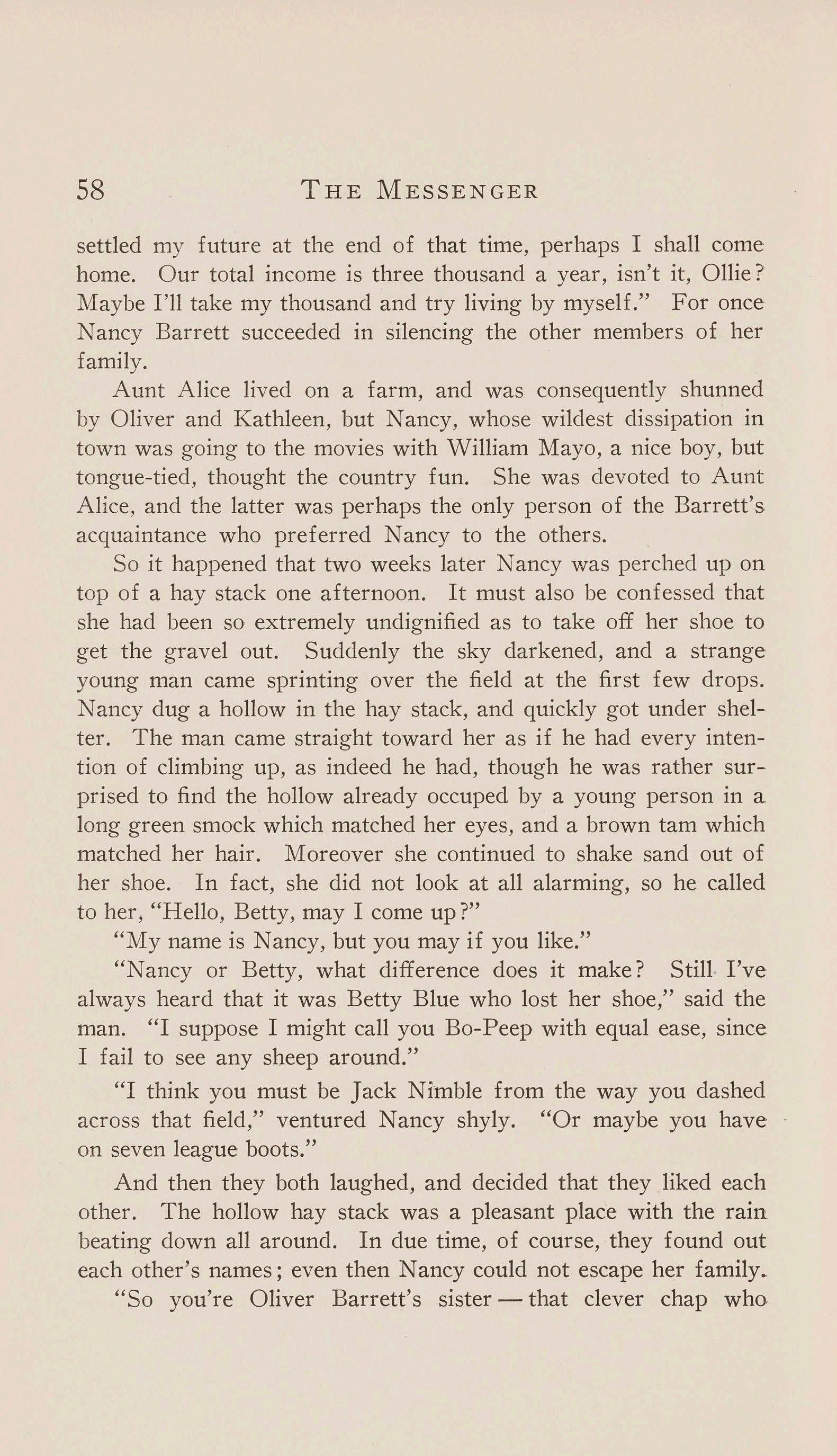
MESSENGER
settled my future at the end of that time, perhaps I shall come home. Our total income is three thousand a year, isn't it, Ollie? Maybe I'll take my thousand and try living by myself." For once Nancy Barrett succeeded in silencing the other members of her family.
Aunt Alice lived on a farm, and was consequently shunned by Oliver and Kathleen, but Nancy, whose wildest dissipation in town was going to the movies with 'William Mayo, a nice boy, but tongue-tied, thought the country fun. She was devoted to Aunt Alice, and the latter was perhaps the only person of the Barrett's acquaintance who preferred Nancy to the others.
So it happened that two weeks later Nancy was perched up on top of a hay stack one afternoon. It must also be confessed that she had been so extremely undignified as to take off her shoe to get the gravel out. Suddenly the sky darkened, and a strange young man came sprinting over the field at the first few drops. Nancy dug a hollow in the hay stack, and quickly got under shelter. The man came straight toward her as if he had every intention of climbing up, as indeed he had, though he was rather surprised to find the hollow already occuped by a young person in a long green smock which matched her eyes, and a brown tam which matched her hair. Moreover she continued to shake sand out of her shoe. In fact, she did not look at all alarming, so he called to her, "Hello, Betty, may I come up?"
"My name is Nancy, but you may if you like."
"Nancy or Betty, what difference does it make? Still I've always heard that it was Betty Blue who lost her shoe," said the man. "I suppose I might call you Bo-Peep with equal ease, since I fail to see any sheep around."
"I think you must be Jack Nimble from the way you clashed across that field," ventured Nancy shyly. "Or maybe you have on seven league boots."
And then they both laughed, and decided that they liked each other. The hollow hay stack was a pleasant place with the rain beating clown all around. In due time, of course, they found out each other's names; even then Nancy could not escape her family.
"So you're Oliver Barrett's sister -that clever chap who
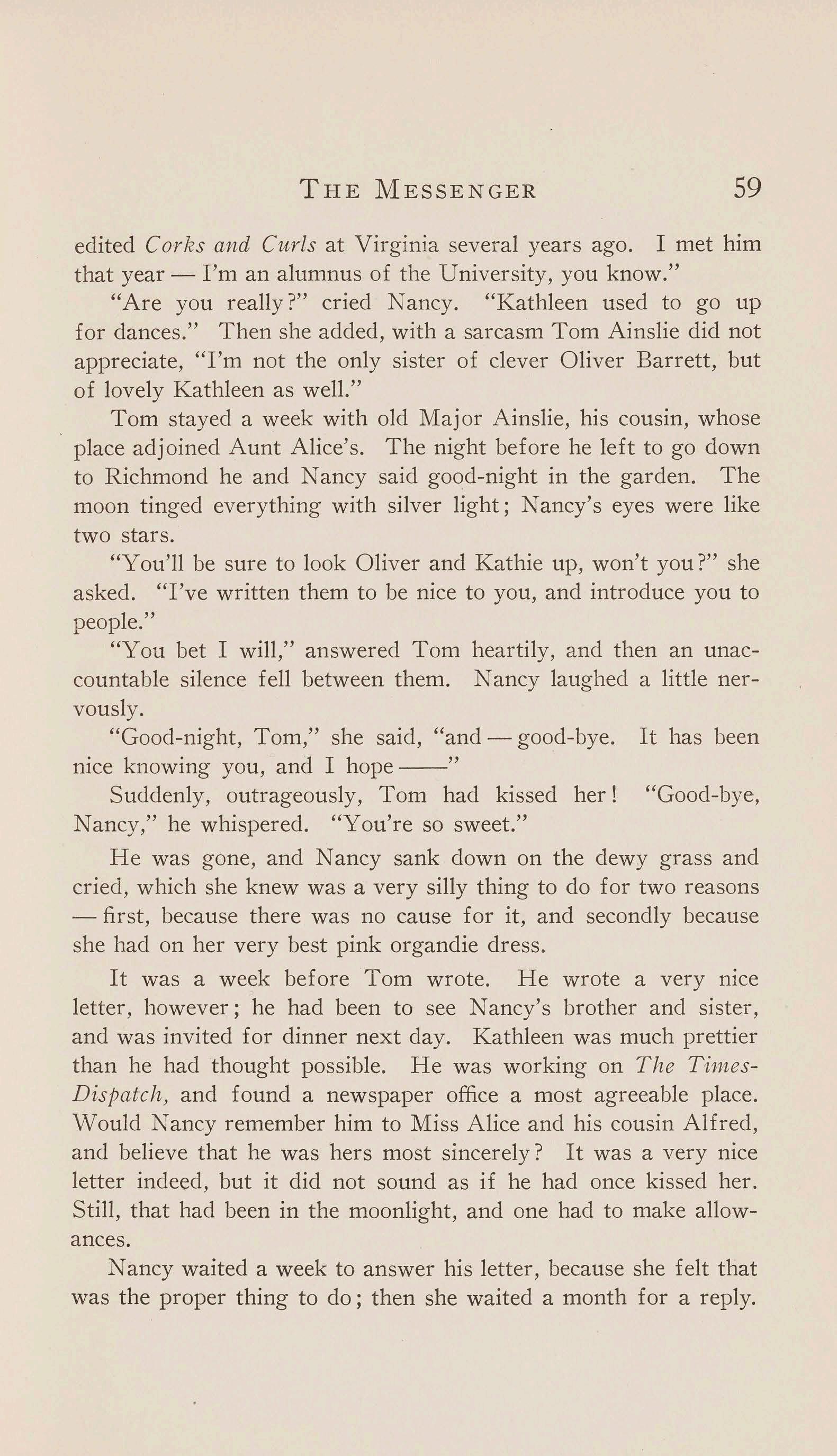
edited Corks and Curls at Virginia several years ago. I met him that year -I'm an alumnus of the University, you know."
"Are you really?" cried Nancy. "Kathleen used to go up for dances." Then she added, with a sarcasm Tom Ainslie did not appreciate, "I'm not the only sister of clever Oliver Barrett, but of lovely Kathleen as well."
Tom stayed a week with old Major Ainslie, his cousin, whose place adjoined Aunt Alice's. The night before he left to go down to Richmond he and Nancy said good-night in the garden. The moon tinged everything with silver light; Nancy's eyes were like two stars.
"You'll be sure to look Oliver and Kathie up, won't you?" she asked. "I've written them to be nice to you, and introduce you to people."
"You bet I will," answered Tom countable silence fell between them. vously. heartily, and then an unacN ancy laughed a little ner-
"Good-night, Tom," she said, "and -good-bye. It has been nice knowing you, and I hope --"
Suddenly, outrageously, Tom had kissed her! "Good-bye, Nancy," he whispered. "You're so sweet."
He was gone, and Nancy sank down on the dewy grass and cried, which she knew was a very silly thing to do for two reasons -first, because there was no cause for it, and secondly because she had on her very best pink organdie dress.
It was a week before Tom wrote. He wrote a very nice letter, however; he had been to see Nancy's brother and sister, and was invited for dinner next day. Kathleen was much prettier than he had thought possible. He was working on The TiinesDispatch, and found a newspaper office a most agreeable place. Would Nancy remember him to Miss Alice and his cousin Alfred, and believe that he was hers most sincerely? It was a very nice letter indeed, but it did not sound as if he had once kissed her. Still, that had been in the moonlight, and one had to make allowances.
Nancy waited a week to answer his letter, because she felt that was the proper thing to do; then she waited a month for a reply.
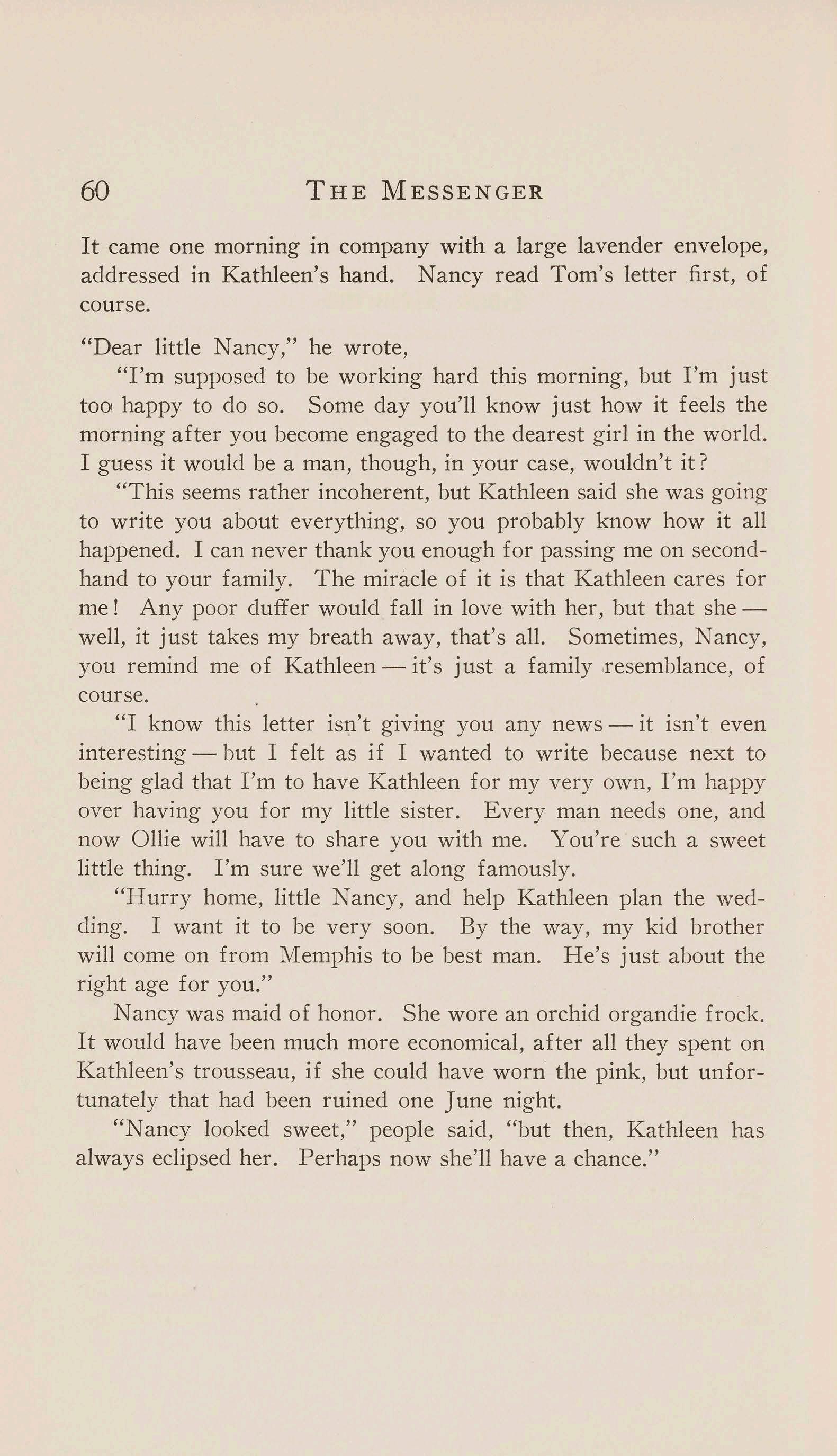
THE MESSENGER
It came one morning in company with a large lavender envelope, addressed in Kathleen's hand. Nancy read Tom's letter first, of course.
"Dear little Nancy," he wrote,
"I'm supposed to be working hard this morning, but I'm just too happy to do so. Some day you'll know just how it feels the morning after you become engaged to the dearest girl in the world. I guess it would be a man, though, in your case, wouldn't it?
"This seems rather incoherent, but Kathleen said she was going to write you about everything, so you probably know how it all happened. I can never thank you enough for passing me on secondhand to your family. The miracle of it is that Kathleen cares for me! Any poor duffer would fall in love with her, but that shewell, it just takes my breath away, that's all. Sometimes, Nancy, you remind me of Kathleen - it's just a family resemblance, of course.
"I know this letter isn't giving you any news - it isn't even interesting - but I felt as if I wanted to write because next to being glad that I'm to have Kathleen for my very own, I'm happy over having you for my little sister. Every man needs one, and now Ollie will have to share you with me. You're such a sweet little thing. I'm sure we'll get along famously.
"Hurry home, little Nancy, and help Kathleen plan the wedding. I want it to be very soon. By the way, my kid brother will come on from Memphis to be best man. He's just about the right age for you."
Nancy was maid of honor. She wore an orchid organdie frock. It would have been much more economical, after all they spent on Kathleen's trousseau, if she could have worn the pink, but unfortunately that had been ruined one June night.
"Nancy looked sweet," people said, "but then, Kathleen has always eclipsed her. Perhaps now she'll have a chance."
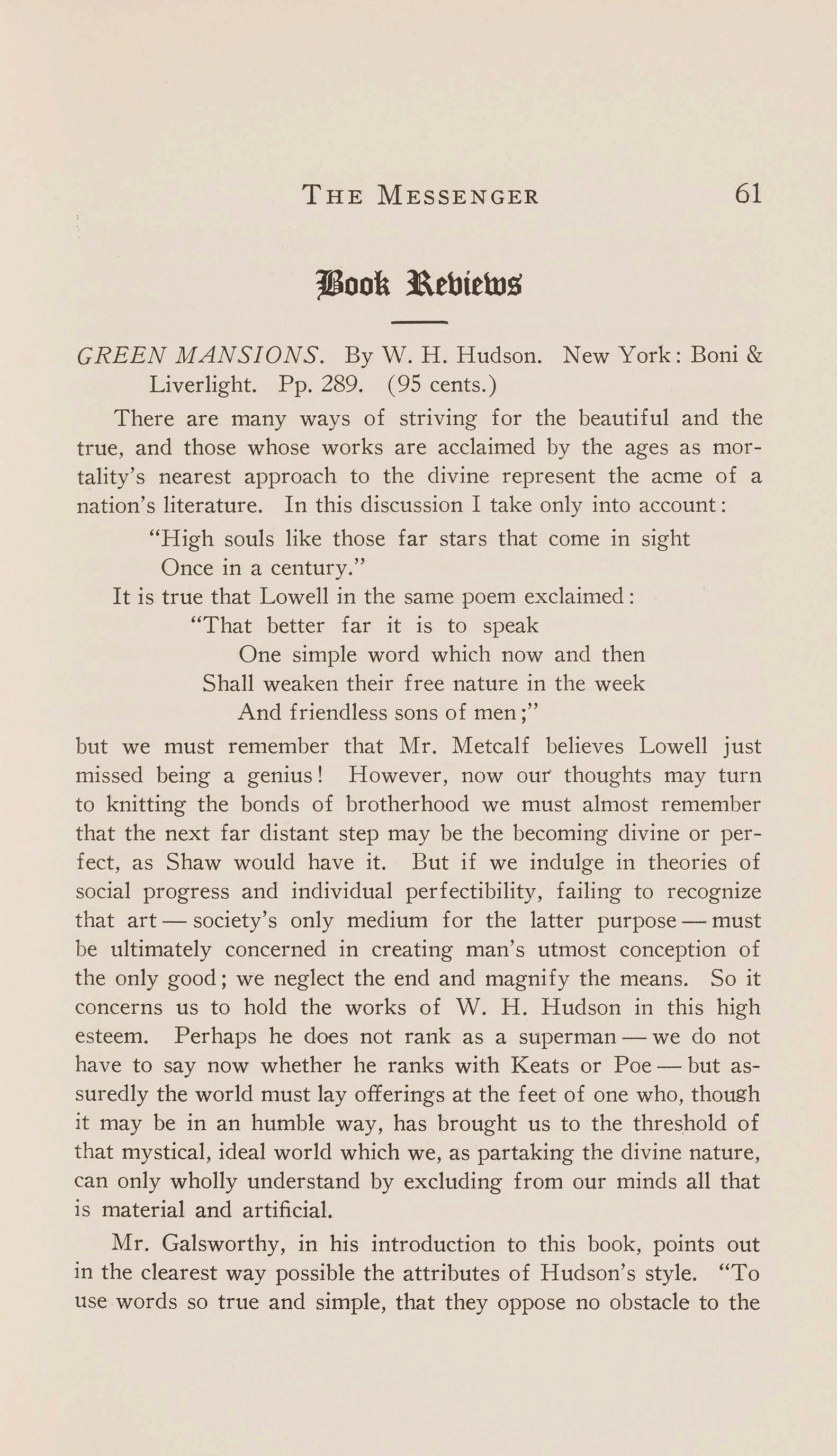
Jjook Rtbittu~
GREEN MANSIONS.
By W. H. Hudson. New York: Boni & Liverlight. Pp. 289. (95 cents.)
There are many ways of striving for the beautiful and the true, and those whose works are acclaimed by the ages as mortality's nearest approach to the divine represent the acme of a nation's literature. In this discussion I take only into account: "High souls like those far stars that come in sight Once in a century."
It is true that Lowell in the same poem exclaimed : "That better far it is to speak One simple word which now and then Shall weaken their free nature in the week And friendless sons of men;" but we must remember that Mr. Metcalf believes Lowell just missed being a genius ! However, now our thoughts may turn to knitting the bonds of brotherhood we must almost remember that the next far distant step may be the becoming divine or per£ect, as Shaw would have it. But if we indulge in theories of social progress and individual perfectibility, failing to recognize that art -society's only medium for the latter purpose-must be ultimately concerned in creating man's utmost conception of the only good; we neglect the encl and magnify the means. So it concerns us to hold the works of W. H. Hudson in this high esteem. Perhaps he does not rank as a superman -we do not have to say now whether he ranks with Keats or Poe -but assuredly the world must lay offerings at the feet of one who, though it may be in an humble way, has brought us to the thres .hold of that mystical, ideal world which we, as partaking the divine nature, can only wholly understand by excluding from our minds all that is material and artificial.
Mr. Galsworthy, in his introduction to this book, points out in the clearest way possible the attributes of Hudson's style. "To use words so true and simple, that they oppose no obstacle to the
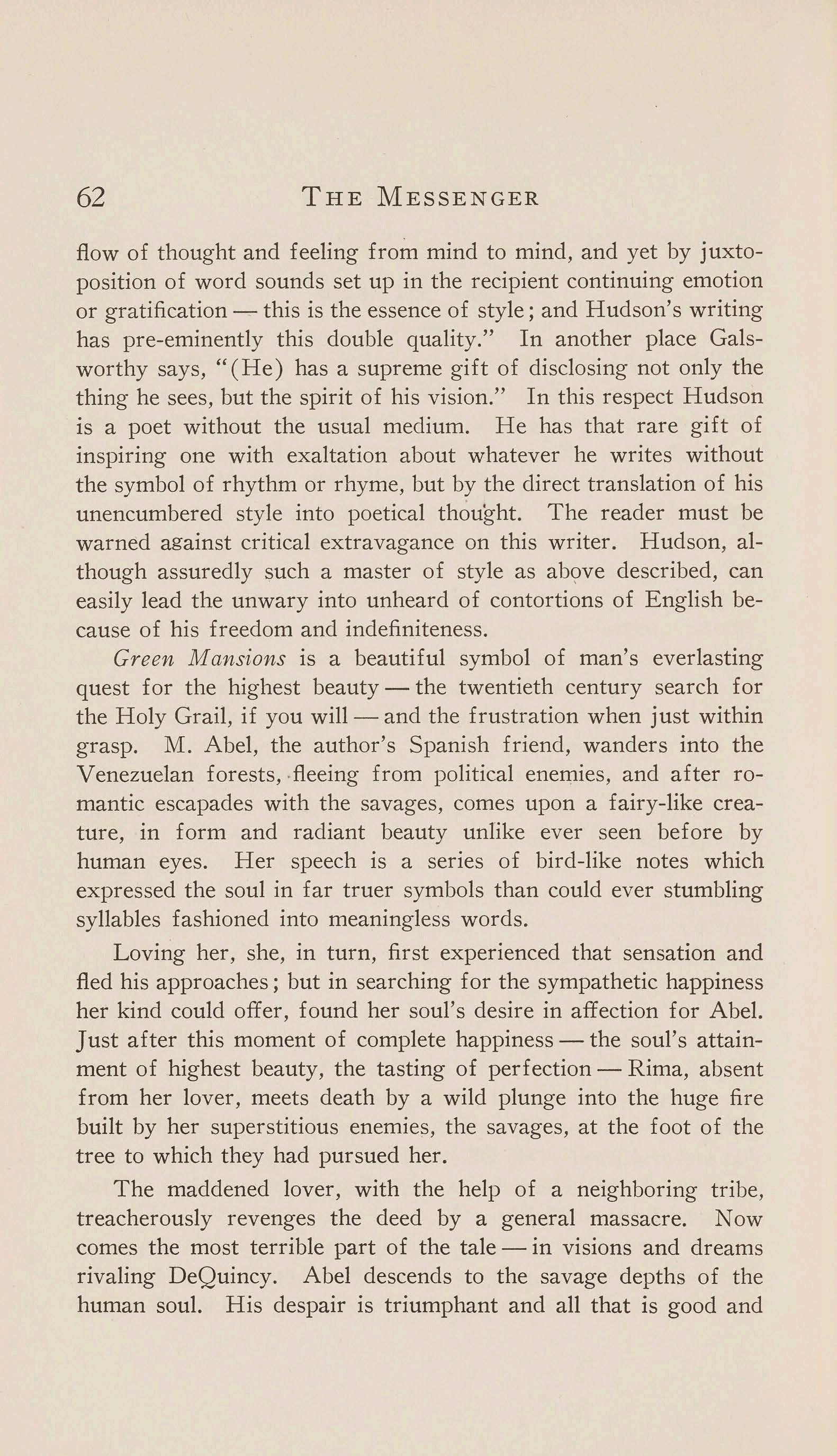
flow of thought and feeling from mind to mind, and yet by juxtaposition of word sounds set up in the recipient continuing emotion or gratification - this is the essence of style; and Hudson's writing has pre-eminently this double quality." In another place Galsworthy says, "(He) has a supreme gift of disclosing not only the thing he sees, but the spirit of his vision." In this respect Hudson is a poet without the usual medium. He has that rare gift of inspiring one with exaltation about whatever he writes without the symbol of rhythm or rhyme, but by the direct translation of his unencumbered style into poetical thought. The reader must be warned against critical extravagance on this writer. Hudson, although assuredly such a master of style as ab<;>vedescribed, can easily lead the unwary into unheard of contortions of English because of his freedom and indefiniteness.
Green Mansions is a beautiful symbol of man's everlasting quest for the highest beauty - the twentieth century search for the Holy Grail, if you will - and the frustration when just within grasp. M. Abel, the author's Spanish friend, wanders into the Venezuelan forests, .fleeing from political enen;iies, and after romantic escapades with the savages, comes upon a fairy-like creature, in form and radiant beauty unlike ever seen before by human eyes. Her speech is a series of bird-like notes which expressed the soul in far truer symbols than could ever stumbling syllables fashioned into meaningless words.
Loving her, she, in turn, first experienced that sensation and fled his approaches; but in searching for the sympathetic happiness her kind could offer, found her soul's desire in affection for Abel. Just after this moment of complete happiness - the soul's attainment of highest beauty, the tasting of perfection - Rima, absent from her lover, meets death by a wild plunge into the huge fire built by her superstitious enemies, the savages, at the foot of the tree to which they had pursued her.
The maddened lover, with the help of a neighboring tribe, treacherously revenges the deed by a general massacre. Now comes the most terrible part of the tale - in visions and dreams rivaling DeQuincy. Abel descends to the savage depths of the human soul. His despair is triumphant and all that is good and
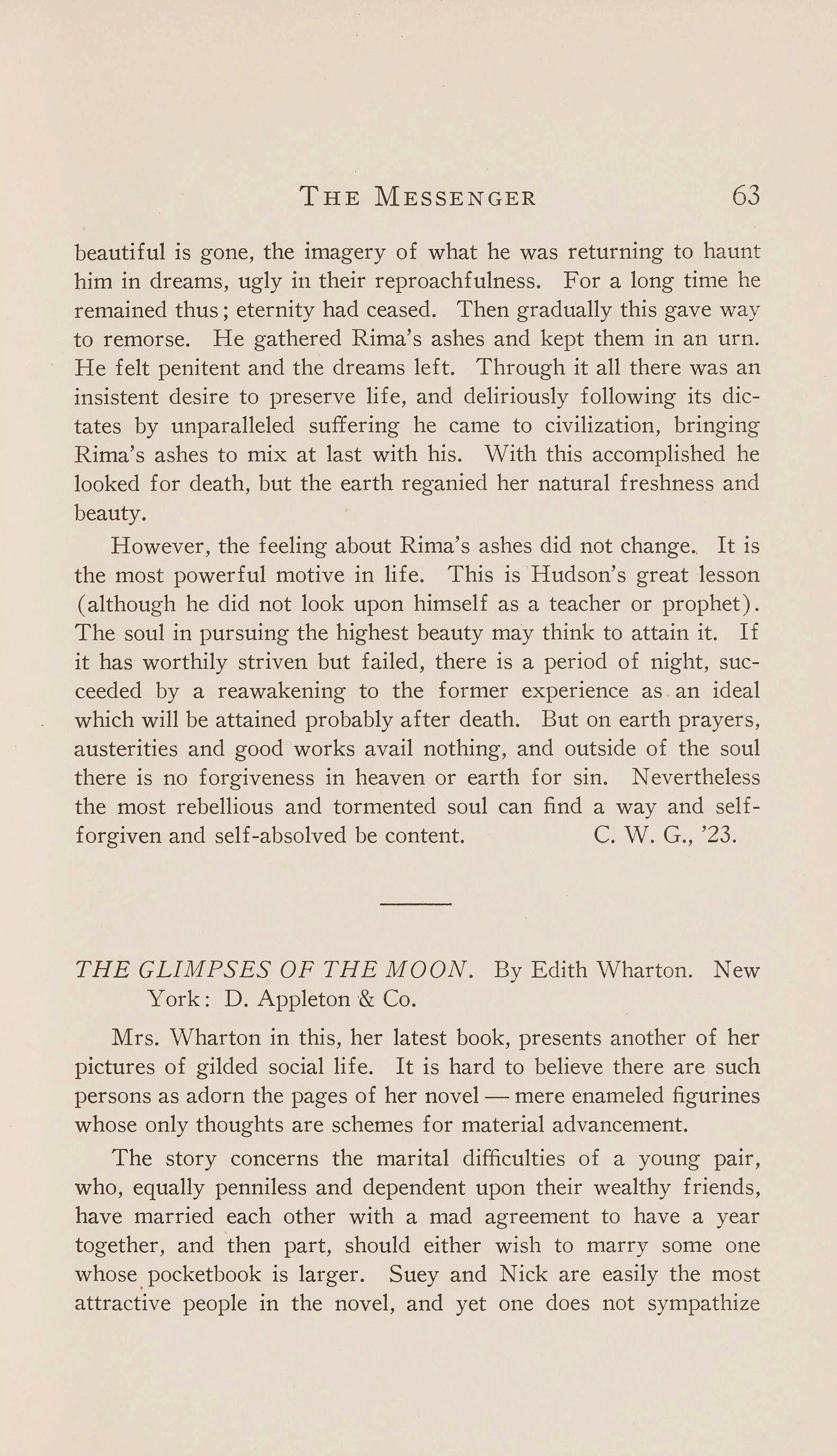
beautiful is gone, the imagery of what he was returning to haunt him in dreams, ugly in their reproachfulness. For a long time he remained thus; eternity had ceased. Then gradually this gave way to remorse. He gathered Rima's ashes and kept them in an urn. He felt penitent and the dreams left. Through it all there was an insistent desire to preserve life, and deliriously following its dictates by unparalleled suffering he came to civilization, bringing Rima's ashes to mix at last with his. With this accomplished he looked for death, but the earth reganied her natural freshness and beauty.
However, the feeling about Rima's ashes did not change. , It is the most powerful motive in life. This is Hudson's great lesson ( although he did not look upon himself as a teacher or prophet). The soul in pursuing the highest beauty may think to attain it. If it has worthily striven but failed, there is a period of night, succeeded by a reawakening to the former experience as an ideal which will be attained probably after death. But on earth prayers, austerities and good works avail nothing, and outside of the soul there is no forgiveness in heaven or earth for sin. Nevertheless the most rebellious and tormented soul can find a way and selfforgiven and self-absolved be content. C. W. G., '23.
THE GLIMPSES OF THE MOON.
By Edith Wharton. New York: D. Appleton & Co.
Mrs. Wharton in this, her latest book, presents another of her pictures of gilded social life. It is hard to believe there are such persons as adorn the pages of her novel -mere enameled figurines whose only thoughts are schemes for material advancement.
The story concerns the marital difficulties of a young pair, who, equally penniless and dependent upon their wealthy friends, have married each other with a mad agreement to have a year together, and then part, should either wish to marry some one whose . pocketbook is larger. Suey and Nick are easily the most attractive people in the novel, and yet one does not sympathize

THE MESSENGER
very deeply with their troubles -it is all too much their own fault.
The Glimpses of the Moon undoubtedly holds one's interest; it is perhaps one of the best of this year's novels. Yet, at the end, one is dissatisfied; what was to have been proven has been taken for granted. It seems almost as if the situation is the same as at the beginning, and one wonders -have Nick and Suey yet found a way to earn a living? L. M., '24.
ATOLLS
OF THE SUN. Frederick O'Brien. New York: Century Company.
If one is a devoted lover of the South Seas, this book will be pleasing. It is a worthy successor to Mystic Isles and White Shadows, but somehow we are beginning to be rather fed upon on nut-brown maidens, coral isles and palm trees. Mr. O'Brien is an authority on the subject about which he writes, and his book contains much of the tropical loveliness of far-off, simple lands. Atolls of the Sun is thoroughly well worth reading if one likes that sort of thing. L. M., '24.
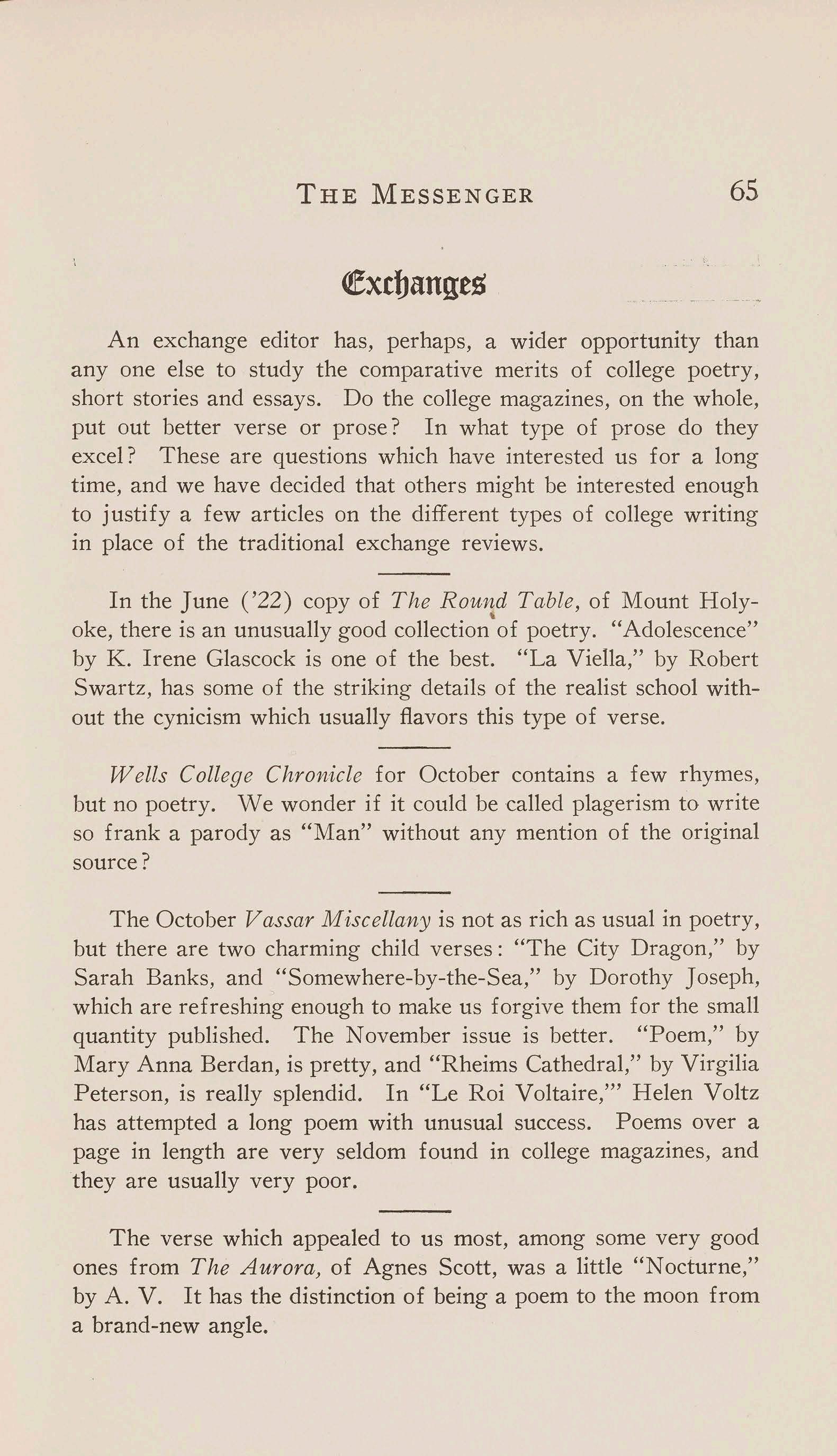
~xcbange~
An exchange editor has, perhaps, a wider opportunity than any one else to study the comparative merits of college poetry, short stories and essays. Do the college magazines, on the whole, put out better verse or prose? In what type of prose do they excel? These are questions which have interested us for a long time, and we have decided that others might be interested enough to justify a few articles on the different types of college writing in place of the traditional exchange reviews.
In the June ('22) copy of The Round Table, of Mount Holy• oke, there is an unusually good collection of poetry. "Adolescence" by K. Irene Glascock is one of the best. "La Viella," by Robert Swartz, has some of the striking details of the realist school without the cynicism which usually flavors this type of verse.
Wells C allege Chronicle for October contains a few rhymes, but no poetry. We wonder if it could be called plagerism to write so frank a parody as "Man" without any mention of the original source?
The October Vassar Miscellany is not as rich as usual in poetry, but there are two charming child verses: "The City Dragon," by Sarah Banks, and "Somewhere-by-the-Sea," by Dorothy Joseph, which are refreshing enough to make us forgive them for the small quantity published. The November issue is better. "Poem," by Mary Anna Berdan, is pretty, and "Rheims Cathedral," by Virgilia Peterson, is really splendid. In "Le Roi Voltaire,"' Helen Voltz has attempted a long poem with unusual success. Poems over a page in length are very seldom found in college magazines, and they are usually very poor.
The verse which appealed to us most, among some very good ones from The Aurora, of Agnes Scott, was a little "Nocturne," by A. V. It has the distinction of being a poem to the moon from a brand-new angle.
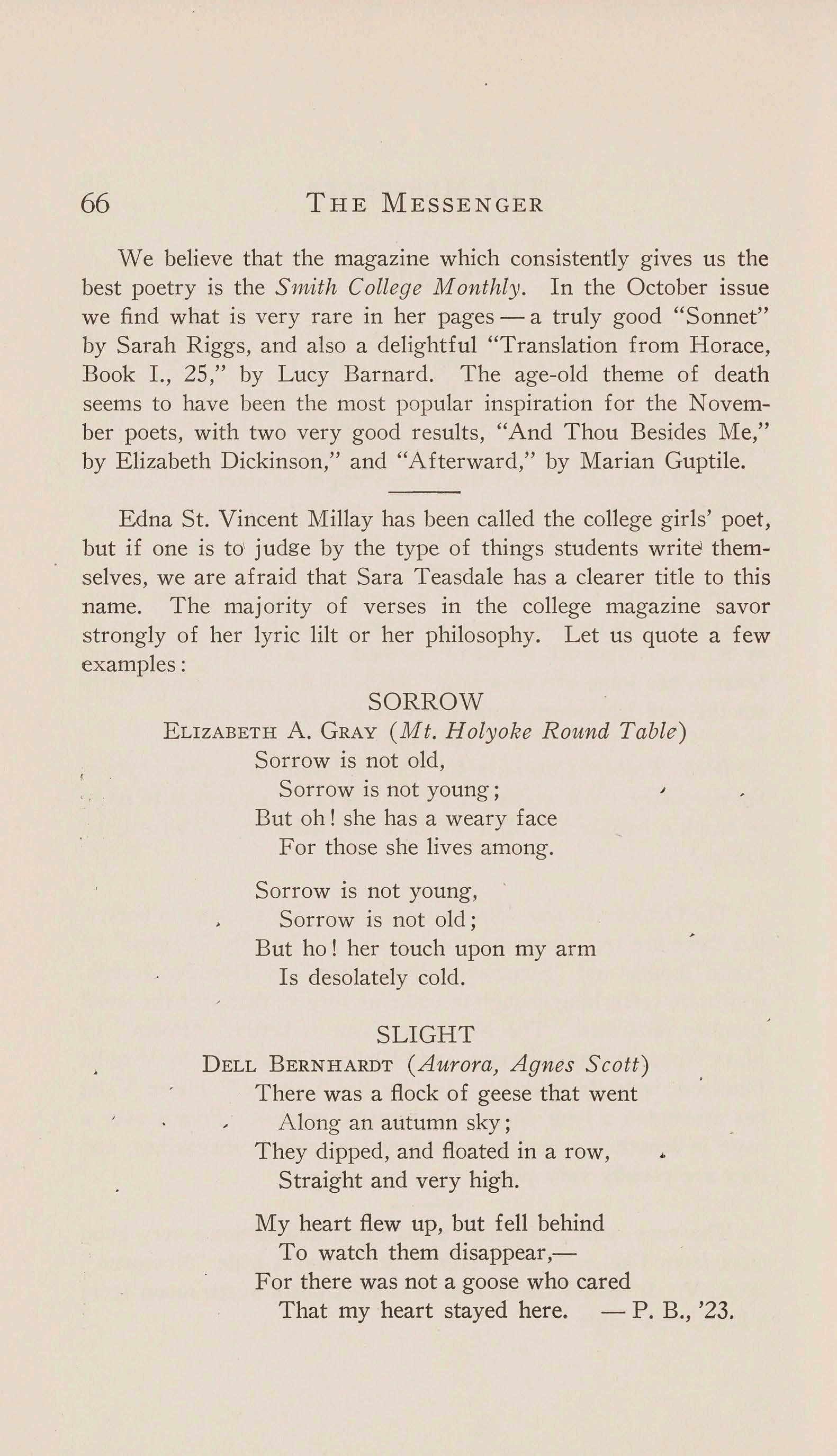
THE MESSENGER
We believe that the magazine which consistently gives us the best poetry is the Smith College Monthly. In the October issue we find what is very rare in her pages -a truly good "Sonnet" by Sarah Riggs, and also a delightful "Translation from Horace, Book I., 25," by Lucy Barnard. The age-old theme of death seems to have been the most popular inspiration for the N ovember poets, with two very good results, "And Thou Besides Me," by Elizabeth Dickinson," and "Afterward," by Marian Guptile.
Edna St. Vincent Millay has been called the college girls' poet, but if one is to' judge by the type of things students write themselves, we are afraid that Sara Teasdale has a clearer title to this name. The majority of verses in the college magazine savor strongly of her lyric lilt or her philosophy. Let us quote a few examples:
SORROW
ELizABETH A. GRAY (Mt. Holyoke Round Table)
Sorrow is not old, Sorrow is not young; But oh! she has a weary face For those she lives among. Sorrow is not young, Sorrow is not old; But ho ! her touch upon my arm Is desolately cold.
SLIGHT
DELL BERNHARDT (Aurora, Agnes Scott)
There was a flock of geese that went Along an autumn sky; They dipped, and floated in a row, • Straight and very high.
My heart flew up, but fell behind To watch them disappear,For there was not a goose who cared That my heart stayed here. -P. B., '23.
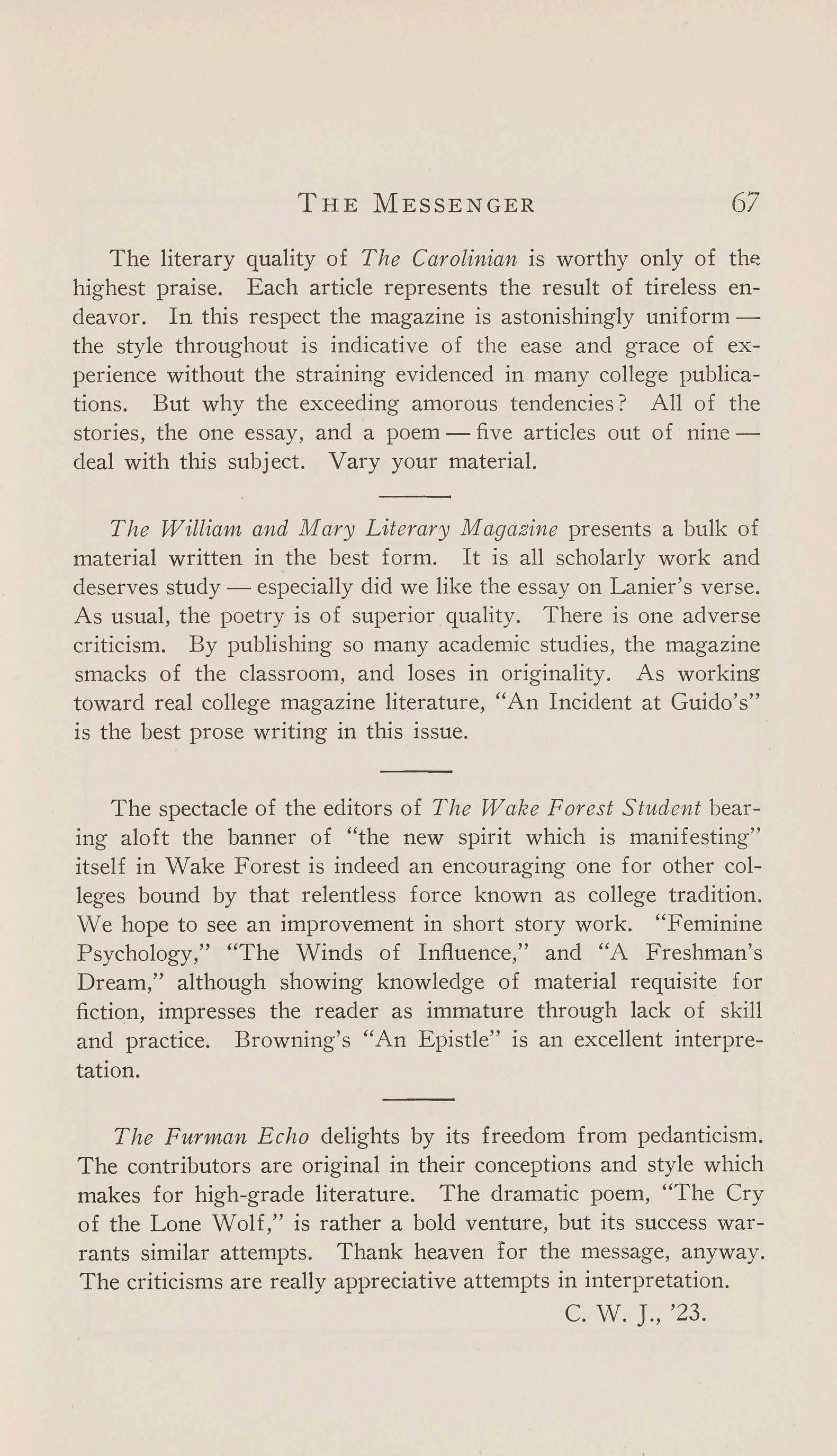
The literary quality of The Carolinian is worthy only of th~ highest praise. Each article represents the result of tireless endeavor. In this respect the magazine is astonishingly uniformthe style throughout is indicative of the ease and grace of experience without the straining evidenced in many college publications. But why the exceeding amorous tendencies? All of the stories, the one essay, and a poem -five articles out of ninedeal with this subject. Vary your material.
The William and Mary Literary Magazine presents a bulk of material written in the best form. It is all scholarly work and deserves study-especially did we like the essay on Lanier's verse. As usual, the poetry is of superior quality. There is one adverse cntlc1sm. By publishing so many academic studies, the magazine smacks of the classroom, and loses in originality. As working toward real college magazine literature, "An Incident at Guido's" is the best prose writing in this issue.
The spectacle of the editors of The Wake Forest Student bearing aloft the banner of "the new spirit which is manifesting" itself in Wake Forest is indeed an encouraging one for other colleges bound by that relentless force known as college tradition . We hope to see an improvement in short story work. "Feminine Psychology," "The Winds of Influence," and "A Freshman's Dream," although showing knowledge of material requisite for fiction, impresses the reader as immature through lack of skill and practice. Browning's "An Epistle" is an excellent interpretation.
The Furman Echo delights by its freedom from pedanticism. The contributors are original in their conceptions and style which makes for high-grade literature. The dramatic poem, "The Cry of the Lone Wolf," is rather a bold venture, but its success warrants similar attempts. Thank heaven for the message, anyway. The criticisms are really appreciative attempts in interpretation.
C. w. J., '23.
RECIPROCITYLOW TARIFF or HIGH TARIFF?
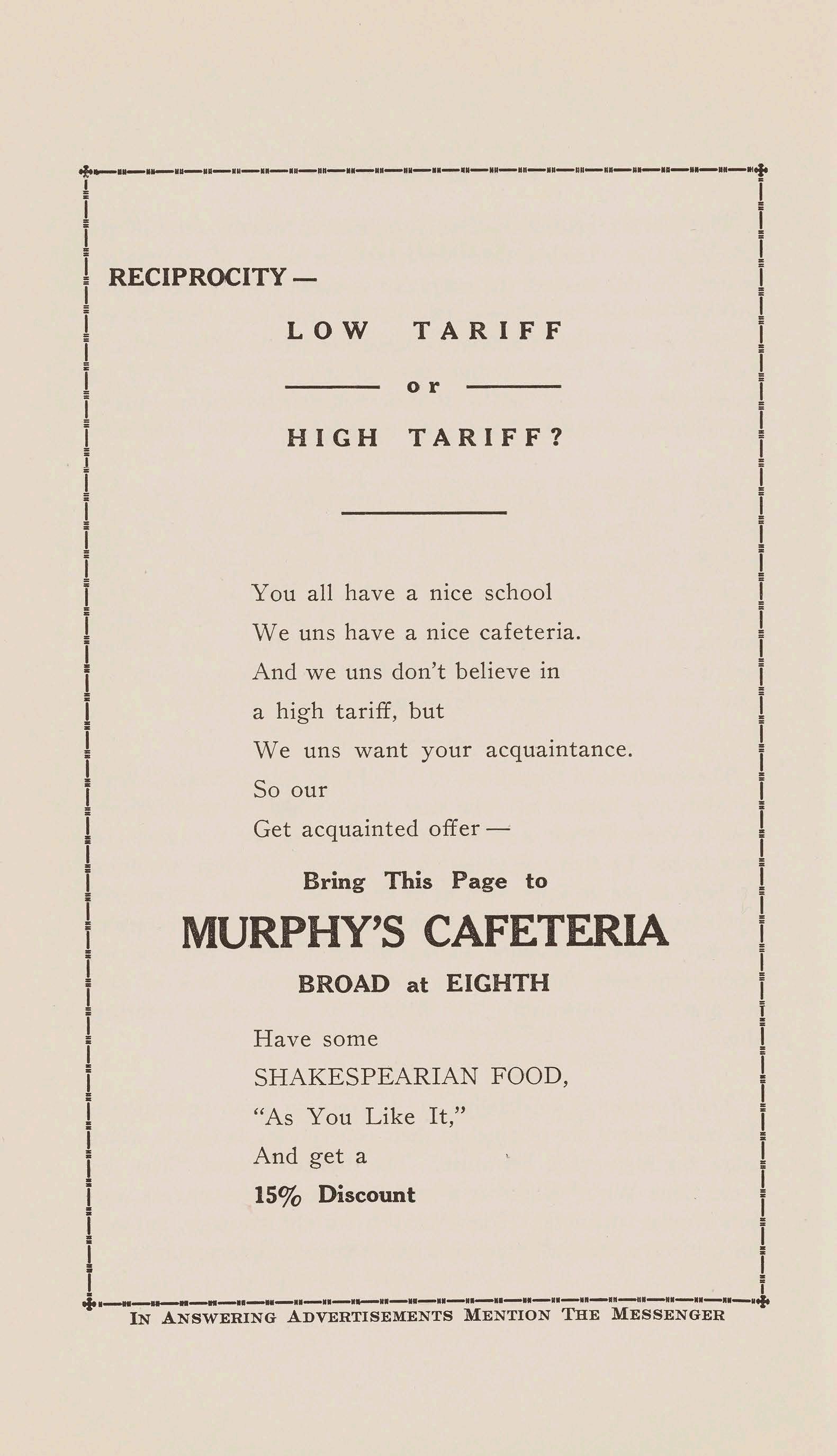
You all have a nice school We uns have a nice cafeteria. And we uns don't believe in a high tariff, but We uns want your acquaintance. So our Get acquainted offerBring This Page to
